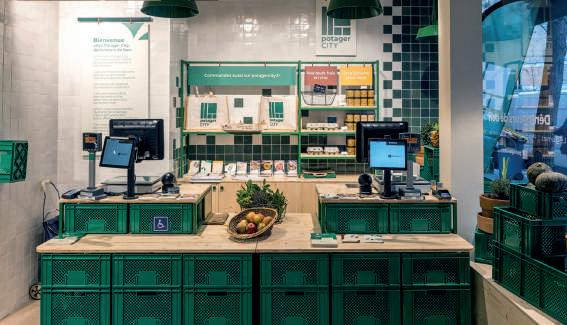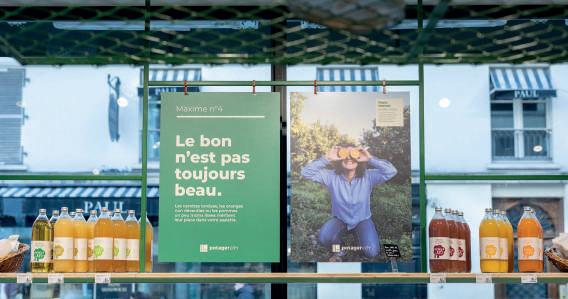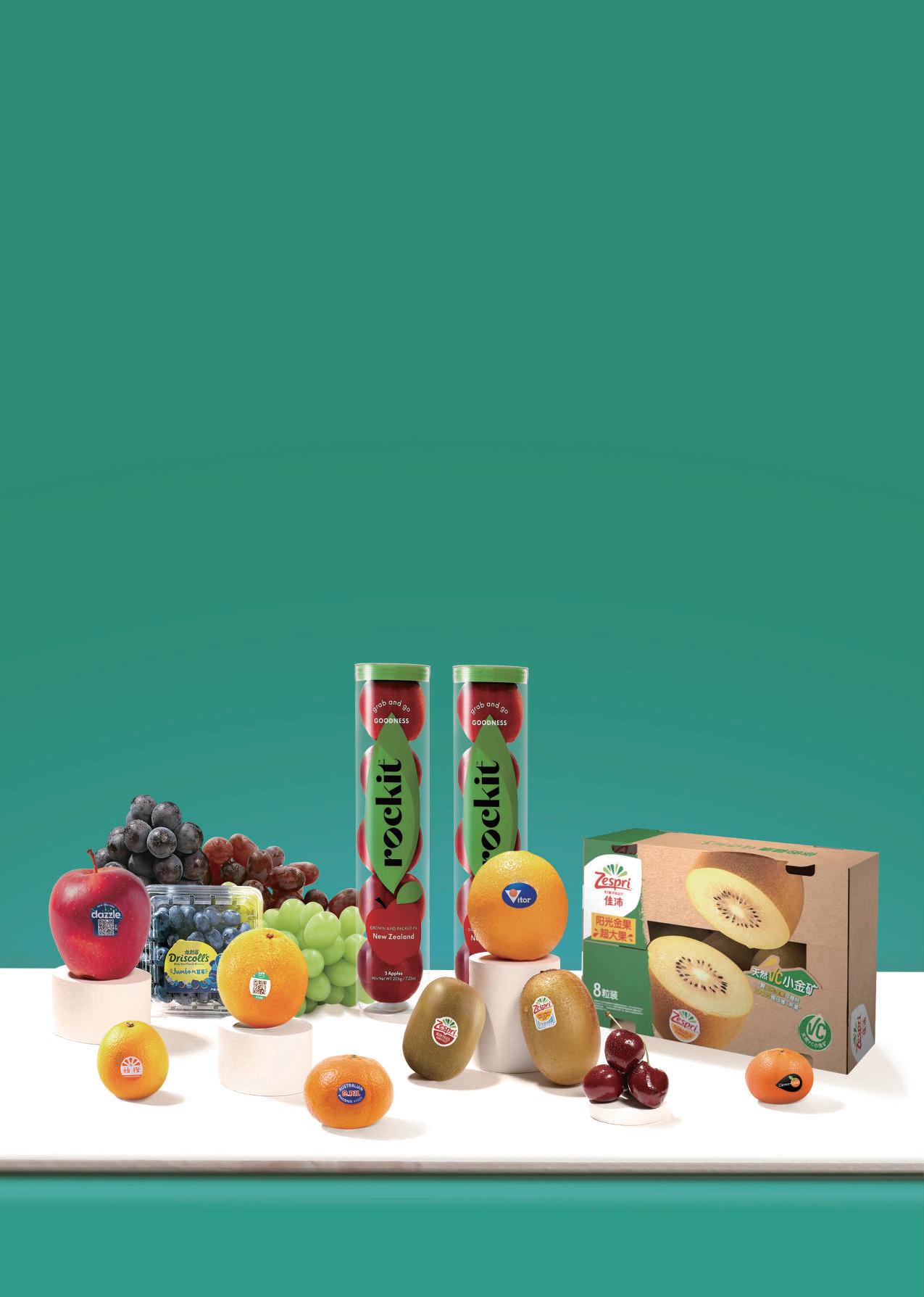EUROF RUIT
PUBLISHED BY
Our second Fruit Logistica edition looks at companies that can take the fresh produce business to the next level


By dedicating an award to the tech sector, Fruit Logistica can shine an even brighter spotlight on an area of the industry that goes under the radar
Time for technology to top the podium
The Fruit Logistica Innovation Award is always one of the highlights of the week in Berlin, and its importance to the nominees should not be underestimated. Just look at the reaction among those who represented the 2023 winner – Rijk Zwaan for its Tatayoyo sweet pepper – when the result was announced at last year’s event. There was much cheering, fist pumping, and some rather eye-catching suits as the team picked up their prize. As has often been the case throughout the lifespan of the award, an innovative, exciting fresh product had won the day. And it is easy to understand why these new fruits and vegetables regularly come out on top. They are the focal point of the industry, after all. But there is so much more to the business than just the end product, which is why I am delighted to see the introduction of a new, separate category this year, FLIA Technology. By dedicating an award to the tech sector, Fruit Logistica can shine an even brighter spotlight on creativity and craftsmanship in an area of the industry that perhaps goes under the radar at times. It is important to remember that, while the glamour may be in the fresh produce, the nuts and bolts – or indeed the sorters, scanners, shelf-life extenders and software –are no less crucial. E
Carl Collen, Deputy Editor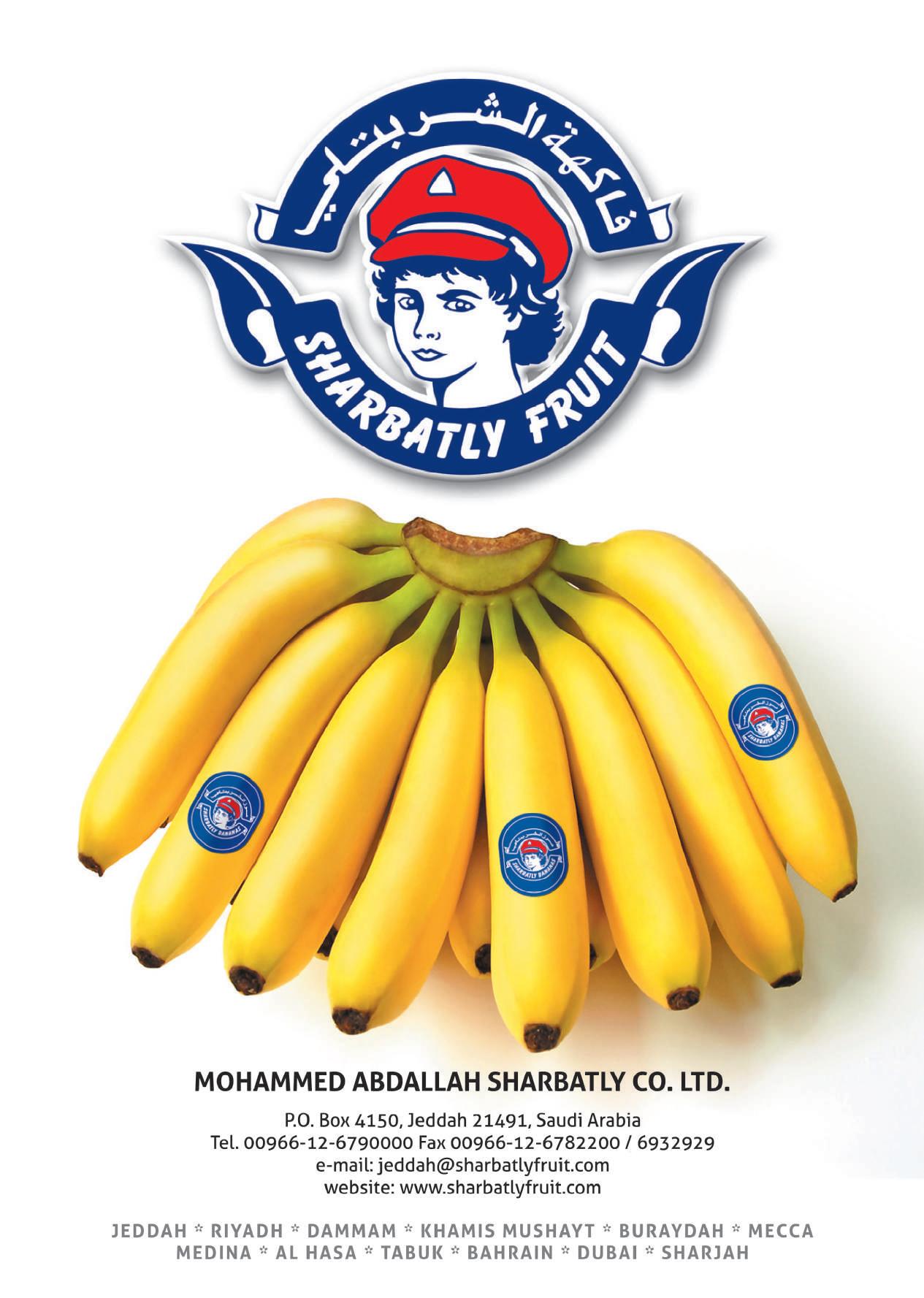
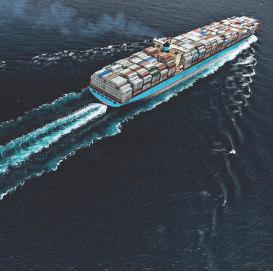


SINCE
EDITORIAL
managing director, fruitnet europe
Mike Knowles
+44 20 7501 3702 michael@fruitnet.com
managing editor
Maura Maxwell
+44 20 7501 3706 maura@fruitnet.com
deputy editor
Carl Collen
+44 20 7501 3703 carl@fruitnet.com
news editor
Tom Joyce
+44 20 7501 3704 tom@fruitnet.com
staff writer
Fred Searle
+44 20 7501 0301 fred@fruitnet.com
DESIGN & PRODUCTION
design manager
Simon Spreckley
+44 20 7501 3713 simon@fruitnet.com
senior designer
Qiong Wu
+61 3 9040 1603 wobo@fruitnet.com
middleweight designer
Mai Luong
+44 20 7501 3713 mai@fruitnet.com
junior graphic designer
Asma Kapoor
+44 20 7501 3713 asma@fruitnet.com
EVENTS & MARKETING
head of events and marketing
Laura Martín Nuñez
+44 20 7501 3720 laura@fruitnet.com
events executive Poppy Bowe
+44 20 7501 3719 poppy@fruitnet.com
MANAGEMENT
commercial director
Ulrike Niggemann
+49 211 99 10 425 ulrike@fruitnet.com
managing director
Chris White
+44 20 7501 3710 chris@fruitnet.com
ADVERTISING
sales director
Artur Wiselka
+44 20 7501 0309 artur@fruitnet.com
senior sales manager
Giorgio Mancino
+44 20 7501 3716 giorgio@fruitnet.com
account manager
Josselyn Pozo Lascano
+44 20 7501 0313 josselyn@fruitnet.com
us & canada
Jeff Long
+1 805 448 8027 jeff@fruitnet.com
italy
Giordano Giardi
+39 059 786 3839 giordano@fruitnet.com
germany, austria, switzerland, middle east Heike Hagenguth
+20 100 544 5066 heike@fruitnet.com
morocco, france, tunisia Cristina Delof
+34 93 000 57 54 cristina@fruitnet.com
south africa
Fred Meintjes
+27 28 754 1418 fredmeintjes@fruitnet.com
asia pacific
Kate Riches
+61 3 9040 1601 kate@fruitnet.com
ADMINISTRATION
finance director
Elvan Gul
+44 20 7501 3711 elvan@fruitnet.com
accounts receivable
Tracey Haines
+44 20 7501 3717 tracey@fruitnet.com
finance manager
Günal Yildiz
+44 20 7501 3714 gunal@fruitnet.com
subscriptions
+44 20 7501 0311 subscriptions@fruitnet.com
CONTRIBUTORS

Colin Fain agronometrics
Colin speaks with Michael Oates and Huang Zhang, who share their insights on the future evolution of fresh blueberry cultivation in China. berries–p36-38

Jan-Willem Schrijver coldcha
Jan-Willem says his business is seeing robust growth, as new users adopt real-time tracking technology over traditional logger methods. p&t–p74

Richard Bonn aehtr associates
Richard comments that any company that wants to secure its future must integrate sustainability into its business plan – but that it is easier said than done. sustainability–p72

Michele Dall’Olio fresh4cast
Michele discusses how new technological advances can create competitive advantages when it comes to demand planning in fresh produce. p&t–p78

















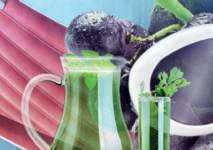























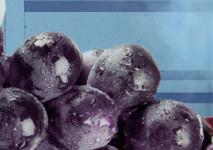






























Red Sea disruption will last months, experts say
European citrus, apples and Indian grapes are amongst the products caught up in the maritime disruption.
by Mike Knowles and Maura MaxwellFresh fruit and vegetable supply lines into Europe are at serious risk of delays and disruption as a result of the recent mass rerouting of shipping services away from the Red Sea.
According to several different sources, the immediate impact will be extra costs and longer journey times for suppliers that usually ship their produce via the affected route – either to or from Europe.
And for key seasonal suppliers who need to land their products in the market at a specific time,
this represents a major logistical challenge.
“For most markets east of Suez, topfruit and some root vegetables exported from northern and southern Europe will suffer disruption in the programmes,” predicts Steve Alaerts, partner at Antwerp-based Foodcareplus. “The mandatory detour route will result in up to two weeks of extra lead time, which means there will be no market arrivals for the same period.
The ripple effect of that initial blockage will lead to further disruption for the next few months at least, he tells Eurofruit. “There

ABOVE—All the major shipping lines have rerouted services away from the area
is also an export interruption in the second half of January, because ships returning from Asia are not arriving in Europe in time to load new exports, meaning that from mid-March, there will again be interruptions in arrivals at the destination markets.”
By then, Alaerts predicts, carriers will probably have restored some sailing schedules by deploying extra sailing capacity to maintain the weekly calls. But for products with shorter shelf-life, there is much less time to wait. “The situation is downright dramatic for more sensitive types of fruit and products, and programmes will have to be stopped unless they switch to airfreight.”
According to EastFruit, the suspension of shipping services comes at the height of the Egyptian orange harvest and has led to a serious crisis for the country’s citrus producers. It is also creating a deficit of oranges

for consumers in Asia – one of the most attractive export markets for Egypt. Currently, Egyptian exporters are urgently looking for alternative routes to ship their fruit, and Egyptian growers were forced to suspend harvesting oranges, fearing a collapse in prices.
Egypt is the third largest exporter of fresh oranges in the world after Spain and South Africa. In addition, it is believed that Egypt exports the most competitively priced citrus. The main orange markets for Egypt are Russia, Saudi Arabia, Bangladesh, the European Union, India, UAE, UK, China, and Malaysia.
“Given the situation in the Red Sea, more than a third of all orange exports from Egypt, the most profitable part of it, are currently blocked, impacting growers, traders, transportation companies and consumers,” says FAO economist Andriy Yarmak.
Egypt is the main supplier of fresh oranges to Southeast Asia at
this time of year. Therefore, here, too, a serious shortage of products is brewing, which, even with a strong desire, other suppliers, such as China and the US, will not be able to cover.
Moreover, China itself is a major buyer of oranges from Egypt. At the same time, the harvesting of oranges in the countries of the Southern Hemisphere will begin only in June.
“Most likely, under these conditions, Spain will increase orange shipments to Southeast Asian countries using a bypass route, and Egypt will begin to supply more oranges to the EU and Eastern European countries until the logistics situation normalises. However, no one can say yet when it will return to normal,” EastFruit says.
Spain’s Anecoop says diverting shipments via the southern tip of Africa will undoubtedly impact its exports to China and Southeast Asia during the second half of the season, from February onwards,
mainly due to the longer transits affecting the shelf-life of the fruit.
“Despite the overall fall in the Spanish citrus crop we will have more Lanes and Valencias than last year. In principle we were looking to grow our volume to South Korea and China this season but it won't be easy,” says Nacho Juárez. “The Middle East and Southeast Asia are very unpredictable markets and shipments aren’t as scheduled as in markets with strict phytosanitary protocols like China and South Korea, where a lot more planning is required.”
Anecoop also fears a knock-on impact in the European market due to the increased availability of Egyptian citrus originally bound for Asia.
Meanwhile, India’s table grape exporters say they are having to “think on their feet” and adjust their plans accordingly in the face of longer transit times to reach the European market. This creates a potentially big problem for Europe’s grape buyers, who traditionally rely on India to fill a gap in supply between the Southern and Northern Hemispheres.
“The situation is scary and terrible, and the entire trade will be badly affected,” says Nitin Agrawal, managing director of India’s largest grape exporter, Euro Fruits. “Now we face uncertain and longer transit times, a shortage of containers, fewer sailings. And our imported punnets from Italy are delayed by 30-40 days. Overall it is a complete mess.”
According to Agrawal, container freight rates were hovering around US$1,200 before the current crisis, but now they are “close to US$5,000”.
One table grape importer based in the UK told Eurofruit he agreed the next couple of months would be especially difficult for the entire industry. “In terms of India, definitely challenging, although in theory it shouldn’t be a problem with vessels diverting around the Cape of Good Hope. You just need to plan the extra cost of doing this and an additional two weeks transit time.”
However, with shipping lines changing their plans and diverting ships to other ports at a moment’s notice, the situation in the Port of Mumbai remains uncertain. “It’s not clear what will arrive and depart Mumbai on time,” the importer added. E
LatAm banana sector slams proposed new price cut by European retailers
Industry says it is “deeply concerned” about plans to cut box price by €1.30.
by Maura Maxwell @maurafruitnetRepresentatives from the Latin American banana industry have expressed their dismay about plans by European supermarkets to reduce the price of bananas by €1.30 a box.
In December, Reefer Trends reported that the retailers had based their decision on a stronger euro against the dollar this year and lower freight rates. But the specialist publication said this argument is flawed.
It noted that “at €1.08/US$1, the euro is only marginally stronger than last year, and despite blanket indications from publications such as Drewry, the freight rate on transatlantic voyages in 2024 is not materially lower than last year”.
The Latin American Task Force
for Bananas, which represents 60 per cent of banana output from Ecuador, Colombia, Guatemala, the Dominican Republic, Costa Rica, Honduras and Peru, issued a statement saying it is “deeply concerned” by the proposal.
It pointed to the “significant problems” banana farmers and exporters of the region have been experiencing since 2020, such as rising input and freight costs; the threat of TR4; drugs trafficking and the growing certification and phytosanitary burden imposed by the European Union.
“Unfortunately, supermarkets did not recognise these realities, but decided to further reduce banana prices in 2020, 2021 and 2022. These decisions, incoherent
with the objective of sustainable trade, have led us, on behalf of the region’s farmers and exporters that are affected by these unsustainable practices, to campaign tirelessly for supermarkets to assume their role within shared responsibility and therefore pay a fair price for bananas that recognises farming costs and sustainability requirements,” the cluster said.
“Faced with the unfortunate news that supermarkets once again seek to reduce the purchase price of bananas in 2024, we urge that shared responsibility not only remain under discussion, but that retailers pay a fair price for bananas.”
The cluster pointed out that the Fairtrade methodology for calculating the fair price of a banana box should be transparent, available, accepted by the European Union and that it recognise production costs increases and the requirements of sustainable agriculture.
“Supermarkets’ actions must in any case focus on their role in shared responsibility and they must avoid heading off this discussion towards third parties. The real issue here is the absence of a fair price, and that retailers take no consideration of the efforts made by each country, such as Colombia, which has dialogue mechanisms between farmers and workers to establish a living wage, or Ecuador, which has a living wage established through the constitution and the law,” the statement continued.
“Paying a fair price is essential if we are to achieve and maintain sustainable production. If supermarkets continue to evade their role within the supply chain within the framework of shared responsibility, they will continue to demonstrate the incongruity between the sustainable practices required of farmers and their own commercial practices of chasing increasingly lower prices, thereby turning sustainability into an empty statement.” E







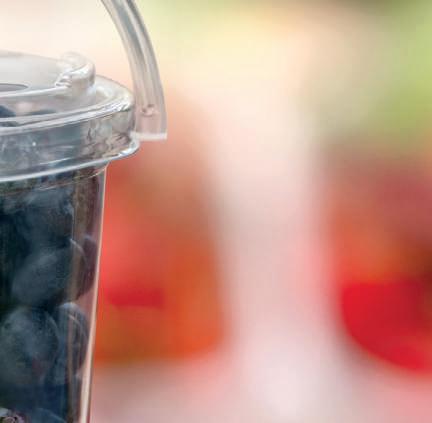












USDA forecasts apple increase
Growth in China, South Africa and the US is expected to offset lower production in the EU and Turkey.
by Bree CagiattiAnew report from the US Department of Agriculture has forecast world apple production will increase slightly in 2023/24, rising 175,000 tonnes to 83.1m tonnes.
According to the report, this increase in the 2023/24 marketing year (12 months to 30 June 2024 for the Northern Hemisphere and 31
December 2024 for the Southern Hemisphere) is due to recovering supplies in China, South Africa, and the US, offsetting losses in the EU and Turkey.
Although China has experienced frost and temperaturerelated losses in Shandong and Gansu provinces, higher output in Shanxi, Henan, Hebei, and Liaoning


is expected to offset this and overall production is set to increase by 500,000 tonnes to 45m.
83.1m anticipated volume in tonnes of the 2023/24
South Africa production is also anticipated to rise this season to 1.2m tonnes based on good growing conditions and new supply from plantings coming into full production. Additionally, Washington State supply in the US is set to recover following last season’s weather damage and boost US production up 56,000 tonnes to 4.4m.
Indian production is expected to remain at 2.4m tonnes based on unchanged planted area and favourable weather conditions. Production in Chile is expected to lower slightly to 907,000 tonnes as its “planted area continues its long, downward trend” the report said. Meanwhile, New Zealand production is anticipated to rebound slightly by 20,000 tonnes to 463,000, as orchards continue to recover from Cyclone Gabrielle.
In contrast, EU production is expected to decline by 475,000 tonnes to 12.2m due to higher‐than‐normal fruit drop and cold temperatures. However, quality is expected to be good with output in France and Spain improving on recovery from last year’s prolonged high temperatures. Turkish production is also forecast down for the first time since the 2014/15 season to 4.9m tonnes. The decline is said to be due to low moisture during bloom and unseasonal rains during fruit maturation.
With the overall increase to production, exports are also estimated to rise. The USDA report said world apple exports are anticipated to increase 632,000 tonnes to 6.1m tonnes primarily on higher shipments from the US, Iran, and China. E

By choosing Blue Whale fruit, you are recognising 50 years of experience within the fruit industry and supporting our French growers.
Our quality produce is the result of continuous improvements honoring our commitment to the environment and sustainable farming practices hand in hand with modern technology and continuous development.
While you eat our fruit you combine this with choosing a healthy and nutritious snack.



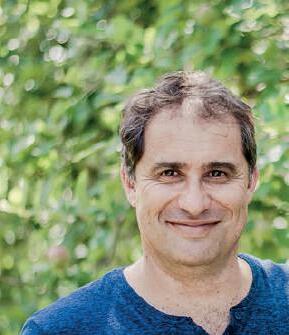
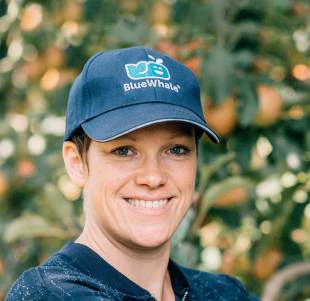
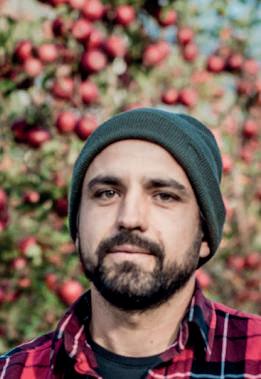







Francis Kint is new Greenyard CEO
Kint, who was previously managing director of the frozen segment, succeeded co-chief executives Hein Deprez and Marc Zwaaneveld on 1 January 2024.
by Carl Collen @carlfruitnetGreenyard has announced that its board of directors has appointed Francis Kint as chief executive officer (CEO). Kint was the managing director of Greenyard’s frozen division, and succeeded co-CEOs Hein Deprez and Marc Zwaaneveld on 1 January this year.
The group said that Zwaaneveld would remain available in an advisory role to facilitate a smooth transition and handover. Deprez will focus on his role as executive director of the board and in this role, and as founder, will continue to ”oversee, build and drive the vision and strategic direction of Greenyard”.
The daily management and operational leadership of the organisation is now under the responsibility and direction of the new CEO, with Kint joining and leading the group executive management alongside chief financial officer Nicolas De Clercq.
“Based on the recommendations of Greenyard’s nomination and remuneration committee, under the chair of Aalt Dijkhuizen, the board of directors decided that Francis Kint is the best candidate for the position of Group CEO,” said Koen Hoffman, chairman of the board of directors. “He held leadership positions in both the fresh and long fresh segments, built expertise across the group,
holds deep understanding of the fruit and vegetable industry, and gained valuable knowledge in both the foodservice and retail channels during his career.
“Kint is the right man at the right place to accelerate the implementation of the strategic direction and to realise the full potential of Greenyard,” Hoffman outlined. “We look forward to a fruitful collaboration.
“On behalf of the board of directors, I also want to wholeheartedly thank our co-CEOs Hein Deprez and Marc Zwaaneveld for their leadership and guidance over the past years,” he continued. “This led to strong performances year on year. Driven by the vision and strategic outline that define Greenyard for 40 years, complimented with a solid structure and organisation, Greenyard is ideally positioned for further growth.”
Kint said he was ”proud and excited” to continue his journey in the Greenyard family.
“Kint is the right man to implement strategic direction and realise the full potential of Greenyard”

“This is a fantastic moment to take on the role of CEO, based on a smooth transition and supported by our board of directors, our founder Hein Deprez, and very strong teams across the world,” he said. ”The company has great ambitions for further growth and our pure-plant products respond to the needs of today’s consumers. We are in an excellent position to be a leading global actor in the consumer trend towards a healthier lifestyle and more sustainable food chains. The momentum for pure-plant food solutions is there, and we are ready to grasp it fully.” E

Gaza fruit farmer shows resolve
Founder of the first vertical strawberry farm in Palestine, Ayed Awni Aburamadan has a history of success in the face of overwhelming challenges, and he is determined to rebuild when the war is over.
by Tom Joyce @tomfruitnet
Ayed Awni Aburamadan is a Palestinian engineer who developed his family farm outside the city of Beit Hanoun in northern Gaza, producing non-traditional fruits and vegetables for the area including tropical fruits like dragon fruit.
Despite the limitations imposed by the political situation in the region, including Israel's control over movements of goods and people to and from the Gaza Strip, Aburamadan says he has remained committed to sustainable farming methods, including employing renewable energy and reusing water and agricultural waste, and he has continued to progress with innovations such as vertical
farming in order to maximise yields.
In fact, his site includes Palestine’s first vertical strawberry farm – a model of production that has apparently enabled him to reduce the amount of water, fertiliser and pesticides needed by around 90 per cent.
However, like hundreds of thousands of Gazans, Aburamadan has been forced to leave his home and farm due to the war in Gaza and head south, taking shelter in a small family home with family and friends.
“Our little place was meant for holidays only and was not equipped to host so many people for a long time,” he says. “But we managed to put up tents and build
“When the war ends, and if I’m still alive, I will go back to my farm to start again for the fi h time”
temporary cooking facilities, relying on wood, as gas and electricity were cut off.”
Fresh food quickly became scarce in grocery stores, he reveals, soon running out completely. “Factories in Gaza are not working because there is no electricity, there are no raw materials and it is not safe,” he explains. “Some people maintained their farms in the south until a couple of weeks ago, so we had fresh tomatoes, cucumbers, aubergines, potatoes, bell peppers and citrus. Now, fresh products have become scarce. Food aid is not enough for the huge number of people. Even if you have the money, you can’t find the goods.”
Aburamadan has been unable to visit his farm in the north, but he has learnt that it has sustained heavy damage. Whatever the scale, he intends to return and to rebuild.
Business has been incredibly difficult for farmers like Aburamadan, but it has also made them resolute.
“In order to establish my modern farm I needed knowledge that was not available," he says, "so I had to rely on the internet and trial and error methods to get my technical issues sorted out. I had to apply for security clearances from Israeli authorities to import some modern equipment to control the greenhouse environment. Marketing and exporting my products was also extremely expensive and difficult.
“I haven’t been able to assess the damage to the farm yet. It was also destroyed in previous years. When the war ends, and if I’m still alive, I will go back there to start again for the fifth time.” E



Mountains to climb
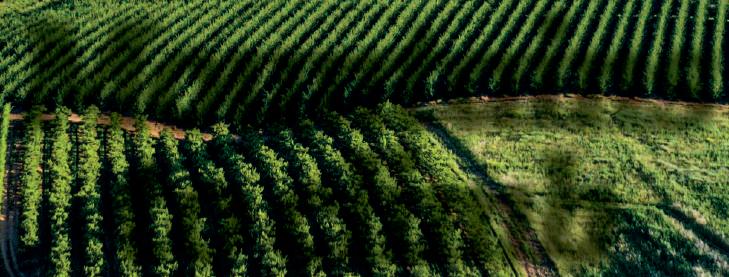
South Africa’s fresh produce industry must overcome a number of challenges to deliver its top-quality fresh produce to international markets
PRODUCTION
EXPORTS
LOGISTICS
SUSTAINABILITY
INNOVATION
BRANDING
MARKETING


Exporters press on as problems persist
Disruption in South African ports has left the country’s fresh produce exporters with a mountain to climb
The fresh fruit trade knows how to plan ahead. Container ships require weeks of sailing time to reach their destination, so delivery schedules are drawn up far in advance. New varieties don’t appear magically overnight; they require decades of R&D, trial and error. Orchards don’t bear fruit forever, so replacements must be planted years ahead of the required harvest. For fruit and veg suppliers, an ability to prepare is second nature. So it’s a shame that certain stakeholders – the South African government, to pluck one example out of the air – are not so agile. On our visit to the Western Cape last month, it was clear the province’s growers and exporters can cope with almost anything you throw at them: water shortages, power cuts, higher crop protection costs, stricter environmental audits, social compliance demand. You name it, they can overcome it. But the inadequacy of Cape Town’s state-run container port facilities seems, to use a logistical term, almost terminal. You might argue Transnet could have foreseen problems like gusting winds – a phenomenon that is surely as old as Table Mountain itself – and tailored its operation accordingly instead of sitting on its hands? Perhaps the adverse weather could even have been used to generate much-needed renewable energy? After all, it’s an ill wind that blows no good.
 Mike Knowles Editor
Mike Knowles Editor



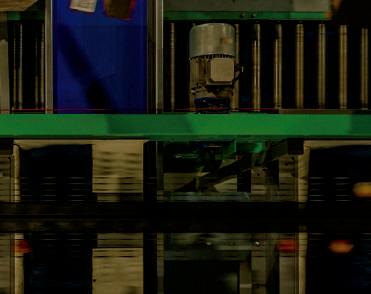
Everything in their power
Fruit exporters in South Africa’s Western Cape say they will do anything they can to keep costs down, maintain quality, and ensure their supply chains stay sustainable and profitable.
by Mike Knowles



Danie Viljoen is no ordinary fruit grower. As well as stonefruit, apples and pears, he now harvests something very different on the vast expanse of farmland he manages in Ceres Valley, in the heart of South Africa’s Western Cape province.
“See that?” he says, as he holds up his smartphone and points to a chart on the screen. “These are my ‘eyes on the ground’. I put 30 probes in the field, linked them to 220 irrigation valves that open and close, and I taught myself how to extract the data and visualise it. Now I can check water levels across the orchard, all from my phone.”
Like many of the country’s growers, Viljoen’s role as general manager of Graaff Fruit’s 175ha Lushof Farm has changed significantly over the past ten years.
In the second half of the last decade, the Western Cape endured its worst drought in 400 years. It was an episode so severe, the city of Cape Town almost ran out of water. As a result, growers now use any technology at their disposal to conserve water sources. For the time being at least, those reserves have mercifully been replenished.
“Our biggest challenge is water,” says Viljoen as he drives past the farm’s reservoir, which holds 1.4bn litres. Located on the edge of South Africa’s semi-arid desert region of Karoo, these orchards enjoy dry heat in the day and cool nights that enable the trees to grow sweeter fruit. But they also receive very little direct rainfall. “Everything we do is designed to preserve that. Without water, we have nothing.”
Water is not the only resource that concerns Viljoen. Like most South Africans, he now expects to run out of electricity on a regular basis. For more than a decade and
a half, in fact, the country has learned to live with frequent rolling blackouts caused by a rationing exercise known as load shedding.
It’s an extra hurdle created by chronic underinvestment in government-owned energy supplier Eskom, whose network can no longer fully meet national demand. The outages cut electricity supply from homes and businesses in different parts of the country at different times, typically for periods of up to four hours.
What load shedding has done is spark a wave of private investment in generators, solar panels, and lithium batteries. For the fruit industry, these add-ons keep orchards and packhouses in operation. At Lusfhof, for example, Graaff Fruit has spent around R20m to install generators and a solar energy system to keep its packhouse operations and irrigation systems running.
To the west near Wellington, on a major plum and nectarine production centre called Sandrivier Estate, owner Le Roux Group added an array of solar panels in December. For packhouse manager Marius Voigt, these give the farm a more reliable, cleaner energy source. “It's been up and running for about a month now,” he says. But it only solves part of the problem. The company’s coldstorage facilities need to run through the night, so it has also acquired a lithium battery to store the solar power.
“I think the country as a whole should look at this kind of renewable energy,” Voigt observes. “Obviously, it's fairly expensive to have a solar farm and a battery. But without it, it would be a disaster.
A lot of companies are picking up these costs now. We should not have to, but the other benefit is we then have green energy.”
Ian Versfeld, another farmer
based near Ceres, admits the task of shoring up electricity supply and limiting water consumption has been tough. But he also believes the experience has left many fruit producers in the Western Cape stronger and more resilient as a result. “It's quite a big investment, especially on energy costs. But everything is possible if you are geared correctly,” he explains, “It gets really expensive when you have to buy generators and batteries. But as soon as the cost comes down for all those things, it gets easier. Our farm is definitely becoming more sustainable as a result.”
PORTS IN A STORM
Even when vital resources are in short supply, you could never accuse South Africa’s fruit industry of lacking resourcefulness. On Fruitnet’s visit to the Western Cape in January, we saw an industry that was ready to supply the European market with some of the finest fresh produce on the planet. We also witnessed a determination among many of its companies to make their operations more efficient.
OPPOSITE—Fruit packhouse owners have been forced to invest in their own energy supply
“It’s fairly expensive to have a solar farm and a battery. We should not have to, but the benefit is we have green energy”
But as the industry works hard to reach those goals, complications on water and electricity are not the only challenges it faces along the way. By far the biggest source of frustration is the persistent disruption that continues to hamper the country’s ports and export shipments.
At the Port of Cape Town, most agree that a lack of investment,


expertise and effort on the part of its state-owned container terminal operator Transnet has left newly harvested fruit waiting weeks to depart. For highly perishable items with a short shelf-life, like the plums, peaches and nectarines that make up a major segment of the Western Cape’s fruit exports, this is a major problem.
Terminal will not, it seems, be fixed overnight.
ABOVE—Power generation units like this one on an orchard near Ceres have become essential investments for Western Cape fruit growers LEFT—Danie Viljoen says water is the biggest challenge when it comes to producing stonefruit
some cases, vessels were loaded in Cape Town during week 51, but only departed three weeks later. For stonefruit, that kind of delay almost certainly means financial disaster, cancelled payments, and possibly even a fee to dispose of a consignment that has no buyer.
Such problems are compounded by an apparent lack of adequate state support. One exporter suggests the government’s only real contribution to the export industry in the past few years has been to oversee a dramatic weakening of national currency the rand.
“The industry cannot afford for the ports not to function in a normal way,” says Gysbert Du Toit, marketing director of Dutoit Agri. “The only outcome I can see is privatisation, or semi-privatisation. That's the only solution.” For exporters doing their best to deliver delicate items like plums and nectarines in Europe by January, the recent Christmas period brought very little good cheer. In
Yet as Du Toit points out, even that foreign exchange advantage represents a hollow victory. “The exchange rate helps,” he explains, “but this is always a very dangerous trap. If you build a business based on a weak currency, many things are out of your control and
The fact that the situation remains beyond the industry’s own control makes it an even bigger headache. There is talk of switching to conventional reefer vessels, or paying to send fruit by airfreight, but in both cases the costs involved are significantly higher. Infrastructural failings on the part of stateowned enterprises like Cape Town Container »












the rand can strengthen back. For now at least, we are in an industry where we are export-focused and we can earn foreign currency. But there is a tipping point, because a lot of our input costs are exposed to exchange rates. You cannot say that if the rand weakens by 10 per cent, you might make 10 per cent more profit.”
There are other cost increases to contend with. Like the higher price of crop protection products that meet more stringent international
rules designed to protect the environment. As Andre Smit of industry body Hortgro explains, this casts a pall over South Africa’s ability to retain its strong position in the EU and UK markets. “Our perception is that phytosanitary measures are being used, but we don’t always think these are for biological and scientific reasons,” he suggests. “The removal of chemicals permitted to produce class-one fruit is a concern, because it is a new constraint and it pushes our
LEFT—
Gysbert Du Toit, Dutoit AgriBELOW—Robert Graaff, Graaff Fruit
OPPOSITE—Harvested fruit ready to deliver to the packhouse
“The exchange rate helps, but if you build a business based on a weak currency, things are out of your control”
costs up. We are not saying that harmful chemicals should not be phased out, but we think that the policies are anti-competitive.”
Then there’s the issue of bigger overheads associated with more demanding audits. Suppliers say they have to undergo an increasing number of checks that are required by customers who don’t want to fall foul of regulators. “We need to find ways of addressing the duplication of standards compliance and resulting inefficiencies in the supply chain,” observes Fhumulani Ratshitanga, CEO of industry body Fruit South Africa. The Sustainability Initiative South Africa (Siza) was set up 15 years ago to do just that, and has already saved fruit suppliers an estimated R66m by organising audits that cover multiple international certification schemes. But more work is needed.
SHREWD INVESTMENT
Faced with so many additional costs and a tougher market, many in the South African fruit industry believe it must find new ways to enhance the value of what it has to offer. For some, that value »


can be increased by having better structural capabilities – for example in the form of packhouses that are equipped with the latest advanced storage and grading technology.
“We are on the brink of making quite big capital investments in the packing and processing part of the business,” reveals Gysbert Du Toit. “For the previous ten years we have focused on expanding our production footprint. But now we are desperate to follow that through with investment in infrastructure. We have to invest in new technology. In the next five years, that will take a lot of our focus.”
New genetic material and better varieties also have the potential to make a big difference.
“Ten years ago, the nectarine varieties available to us would yield around 24 tonnes per hectare, but nowadays that’s higher and approaching 45 tonnes per hectare over the season,” reveals Pierre Rossouw, technical manager at stonefruit export marketer Stems. It was created in 2011 to develop new opportunities for South African stonefruit on international markets.
Those new varieties have opened up more lucrative marketing opportunities, Rossouw
says, as they have allowed growers to adjust the timing of their stonefruit campaign. “Much more is sold to Europe post-Christmas, whereas 12 years ago this was not really possible. Now, half of the volume goes to Europe after new year. As a result, we have seen growth all over Germany, Spain, and the Netherlands, which then re-exports. Russia is becoming a bigger market too, and we're growing in North America, for example in Canada.”
Graaff Fruit director Robert Graaff agrees that better varieties are essential. “It’s so expensive now to plant an orchard under nets
ABOVE—Nectarine yields have improved with the introduction of better varieties »







































































and do everything 100 per cent correctly, you've got to make sure that the variety is a champion,” he insists.
NEW MARKET TRENDS
Despite all of its various challenges, South Africa’s fresh fruit production and exports have seen considerable expansion in the past decade, contributing around US$3.3bn to agri-export earnings. “Fruit exports have grown from 2.5m tonnes in 2013 to over 3.5m tonnes, and the industry is expected to continue increasing its exports as new plantings coming into play,” Ratshitanga reveals.
Between 2013 and 2022, the country’s total planted area grew by 36 per cent to almost 204,000ha. Almost half of that was citrus, with topfruit (known locally as pome fruit) and subtropicals including avocados accounting for 19 per cent each. Stonefruit made up 8 per cent, with berries on 1 per cent.
Blueberry production in the country is set to continue its impressive recent expansion, after the industry increased its annual exports from 4,000 tonnes in 2016 to around 20,000 tonnes in 2023. “There has been significant growth in this commodity and, in the next ten years, big growth is expected,” Ratshitanga confirms.
The EU and UK are still the biggest markets for South African fruit, although there has been growth in sales to Asia, says Ratshitanga. She is one of the people responsible for opening new markets, or at least encouraging politicians and civil servants to do so. And Asia is the one part of the world where most of South Africa’s pending applications for market access are addressed. If it achieves its current priorities on that front, the country will eventually be able to send peaches, nectarines and
plums to China, apples and pears to India, and grapes and citrus to Japan. “As more markets open, we will see more growth,” Ratshitanga adds.
But South Africa’s membership of the Southern African Customs Union means that it cannot negotiate trade deals with other nations by itself. “This makes it difficult because we need buy-in from all of those southern African countries,” says Hortgro’s group operations manager Mariette Kotze. “We’re trying to make sure we are part of the government’s team to facilitate that process and build a supportive structure around new FTAs.” As a result, the opportunity to secure free-trade agreements with new markets remains a tricky one to grasp.
For the foreseeable future, Europe remains the primary goal for most South Africa fruit exporters. Within that market, the last decade has brought a notable shift in focus for some suppliers, from primarily UK-oriented supply to a trade that sends a much larger proportion of its export volume to mainland Europe. Part of the reason for that shift appears to be a change in consumer demand – especially for plums, peaches, and nectarines – and the arrival of better-tasting varieties.
“In 2012, 85 per cent of the nectarines we shipped went to the UK,” says Peter Wolfaardt, who along with his sister Georgie Hewitt represents the fourth generation to run Verdun Estates, a family-run stonefruit farm and packhouse near Ceres. “Last season, our volume was the same, but it made up just 35 per cent.” The company now markets its fruit through Stems.
Pierre Rossouw says a major reason for that change is that German retailers have shown much more interest. Ironically, this has coincided with UK retailers –
inspired by Aldi’s growing market share – opting to pursue a harder discount model. “Especially in the UK, customers have been slightly spoiled with not paying a lot of money for fresh produce. It's actually relatively cheap. And with all costs rising – from primary agriculture, to getting it into the market – inflation is not really coming back to the farms at the moment.”
Of course, this has implications when it comes to paying for new and more stringent sustainability requirements. And while Rossouw says those demands have tended to come from customers in the UK and Germany first, he also suggests they are not always willing to pay more to fund such improvements.
“Customers have not paid a lot for fresh produce. And with costs rising, inflation is not coming back to the farms at the moment”
“The financials are very important for sustainability and that's one of the big challenges I think we're still seeing, especially with UK supermarkets,” he says. “Germany is not a new market for us, but in terms of retail in the last several years we have focused quite a lot on retail there, and it's been really good for us. It pays a little bit more in terms of price, and it goes up more with what the market demands.”
And with margins already as tight as they are, any chance to generate a little more value is a very welcome one indeed.
PPECB retains its relevancy
Chief executive Lucien Jansen says that one of the South African fresh produce industry’s key organisations needs to stay ahead of the game.
by Carl Collen @carlfruitnet
South Africa is this year reflecting on more than 130 years of fruit exports – at a time when its reach as a fruit exporting country is expanding into new territories of the world. In the course of those 130 years, marketing organisations, export companies and farming groups have come and gone, yet one crucial cog in the wheel of South African produce exports has remained.
This is the Perishable Products Export Control Board (PPECB), which, somehow, has not only survived, but also retained its relevancy in the new, highly complex export environment.
The PPECB’s timeless relevancy in the lives of people in the produce industry is the subject of a major coffee-table publication of around 300 pages researched and written by Eurofruit’s own South African correspondent, Fred Meintjes, which was recently published by the organisation.
“South Africa is ge ing access to more countries and this involves complex protocols, the adherence to which we have a role to play in”
“It reflects the way in which the organisation has constantly reinvented itself in order to stay relevant in the fruit export sector,” says Lucien Jansen, PPECB chief executive officer. “We are now close to 100 years old, but we still touch the lives of people in every fresh produce export sector in the country.
“Perhaps our greatest contribution is that we helped to set export standards and a seal of approval which grants South African fresh produce access to the countries where they are finally offered to consumers,” he outlines. “In a world where consumers increasingly question the safety of the products that end up on their tables, the well-known PPECB stamp of approval brings comfort and assurance that South African products are safe and can be trusted.”
In the recent past the PPECB has had to extend additional assistance to the industry to ensure compliance with increasingly stricter international import requirements. “South Africa is slowly getting access to more and more countries, and this almost always involves complex protocols, the adherence to which we have a role to play in,” Jansen continues. “In our traditional markets there are new complex demands attributed to food and plant safety that



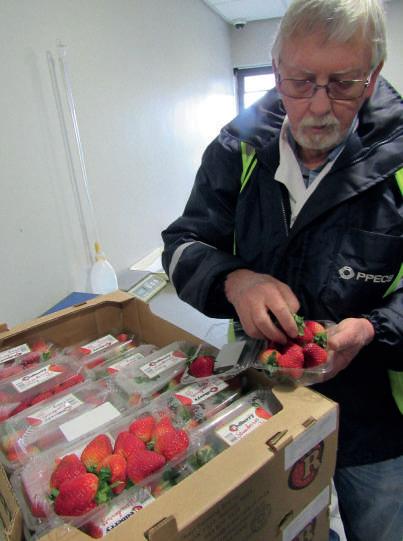
needs to be complied with.”
It is a very complex situation, where highly technical and legal details play a role. “However,’ says Jansen, “we have managed to adapt, and our diverse workforce continues to maintain the highest levels of customer service to ensure we remain relevant and of service to the industry.
“A competitive international market sees nations vying against each other for a share of the market,” he notes. “For new market entrants this is tough. Consumers suddenly have more options in terms of the availability of fresh produce. South Africa therefore needs to differentiate itself by ensuring a better quality and delivering to the right markets at the right time. Here quality inspection standards, speed to market, given all the trade barriers, and export information is critical.”
What is the PPECB?
The Perishable Products Export Control Board is an independent service provider of quality certification and cold chain management services for producers and exporters of perishable food products.
Established in 1926, the PPECB has delivered valuable services to the perishable products industry for over 90 years by enhancing the credibility of the South African export certificate and supporting the export competitiveness of South Africa’s perishable product industries.
As a national public entity, the PPECB is constituted and mandated in terms of the Perishable Products Export Control Act to perform cold chain services. The PPECB also delivers inspection and food safety services assigned by the Department of Agriculture, Forestry and Fisheries.
The presence of the PPECB in the export industry is furthermore enhanced by its recognition as an approved third country under the European Commission Regulation 543 of 2011. This agreement recognises the South African inspection systems as equivalent to that of the EU inspection bodies and therefore ensures less frequent checks at the port of import into the EU.

Together we grow and sustain your business

Our passion for excellence helps you grow your business and establish yourself as a



Sensible, sustainable steps
The South African fruit industry says its answer to the proliferation of social and enviromental certification schemes is rooted in realism and pragmatism.
by Mike Knowles@mikefruitnet
In South Africa, a land where water shortages and power cuts have underlined the finite nature of natural and man-made resources, and where ethical treatment of underprivileged people has defined the country’s very existence for as long as anyone can remember, awareness of the various environmental, social and governance factors that shape its fresh produce industry is high.
However, the South African fruit industry is also acutely aware of the need for a rational approach to environmental and social compliance, one that avoids placing unnecessary, unsustainable financial burdens on growers, suppliers and exporters.
For that reason, an independent certification body called the Sustainability Initiative South Africa (Siza) was set up 15 years ago to minimise
the number of individual audits producers had to undertake, especially if they wanted to supply major retail customers in markets like Europe. It says it has already saved the industry around R66m by removing the expense of those additional audits, which would otherwise have been required passports to entry demanded by clients in different markets.
“We maintain a hands-on approach with third-party auditors, and now recognise seven audit firms, each with a local office in South Africa,” notes Werner Van Dyk, Siza’s ethical and sustainability audit manager. This represents progress, but other complications remain. “Several customers still see social and environmental standards as different and separate, which is something we find strange when those audits and fields of discipline are combined,” Werner adds.
ABOVE & OPPOSITE—
Concern for the welfare of workers and efforts to protect the environment have made certification schemes more complicated and therefore costly
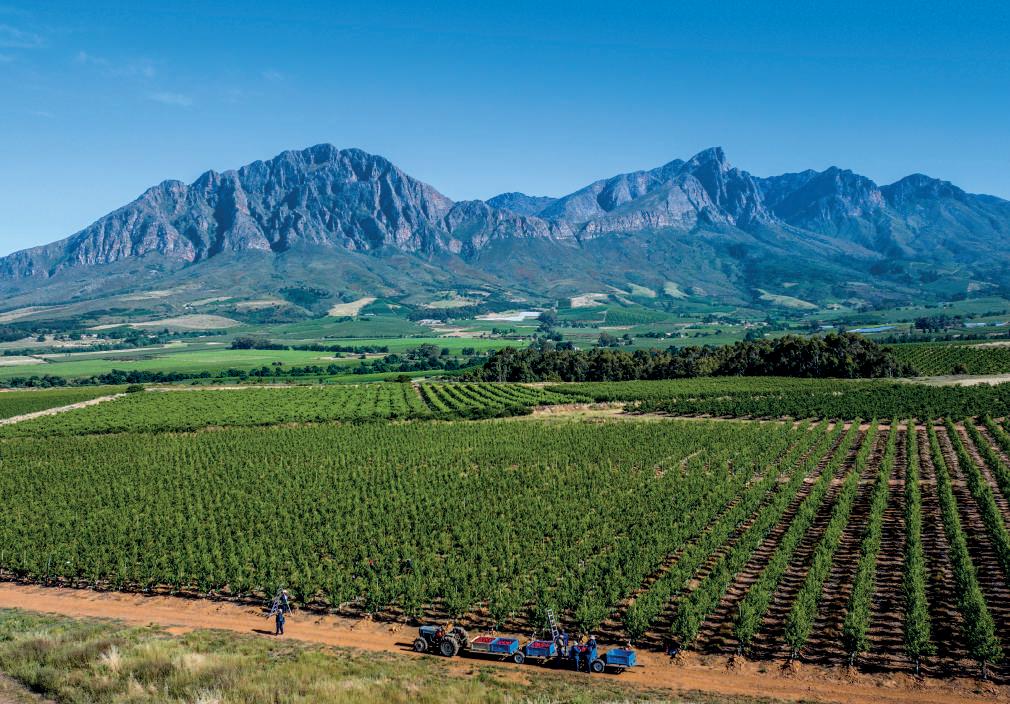
Van Dyk rejects any suggestion that producers are looking to cut corners, even if they are determined to limit the cost of compliance. For many, however, the financial burden involved in ticking the right boxes for the right buyers has risen sharply in recent years with the arrival of new rules and regulations – for example, new sustainability reporting standards implemented by the EU from the start of this year and soon to be introduced by the UK.
“We’ve seen an increase in social and environmental audits,” he explains. “Last year, we ran 732 social and 69 environmental audits. There is definitely an increase and it’s picking up quickly.” Since 2015, audits commissioned by Siza have identified over 46,000 areas where improvement or corrective action was required. An impressive 96 per cent of these have already been resolved, Van Dijk points out.
“Producers are showing their commitment to continuous improvement, and this is evaluated and proven by the third-party audit outcomes: in the past year, 61 per cent of producers achieved platinum status and 25 per cent gold. We are definitely not anticompliance, we are focused on improvement and best practice.”
A HIGHER BAR
Whereas compliance used to focus mainly on food safety, environmental standards are now a key component of most certification schemes. As Siza’s sustainability officer Victor Mouton explains, the group’s environmental standard allows buyers to keep track of their own supply chain targets. “We recently developed a net-zero guideline, a template they can use to work out best practice on water, pests, emissions, hourly wages, and worker accommodation,” he says. “The
“Several customers still see social and environmental standards as different and separate, even though the audits are combined”
overwhelming majority of producers see the benefit of this, and see the results in terms of market access. They understand the need for certification and we help them meet it.”
Van Dijk also insists that smaller growers do not necessarily need to feel at a disadvantage when it comes to achieving full compliance without incurring major overheads. “The real challenge for smaller growers lies specifically in the perception that it’s a lot more admin and requires a lot of staff,” he argues. “For the last five years, we have tried to highlight the fact that not everything has to be done on compliance like 15 years ago. You don’t need to keep huge large files and reprint them for each auditor. We help producers to develop auditing systems that suit their own business, especially online ones where everything is located in one digital hub. Digital record-keeping tools are now a more accessible means to that end.”

A faint light at the end of a blustery tunnel
Delays in South African ports have blighted the country’s fruit export business, which finds itself almost powerless to intervene.
by Mike Knowles@mikefruitnet
When writing about logistics problems and their potential resolution, the metaphor that writers usually reach for is the light at the end of the tunnel. But if fruit exporters in the Western Cape do currently see any such thing during these dark days for South African ports – by no means certain in a country where blanket power cuts are frequent – then it’s a rather faint light at best.
The story of Cape Town’s stumbling, wind-buffeted port logistics operation is already well reported. But for those that missed it, here is a mercifully brief summary: someone in the upper echelons of the South African government forgot to allocate enough budget for simple, sensible investments like cranes that don’t blow over in the city’s recurring high winds.
Antoine e Van Heerden, logistics manager at the South African Fresh Produce Exporters’ Forum, is not paid to defend state-owned operators Transnet and Transnet Port Terminals, which runs the Cape Town Container Terminal. In fact, her role is to criticise it constructively and to make recommendations for the kind of investments that might li South Africa’s ports off the very bo om rungs of the World Bank’s latest Container Port Performance Index.
So the fact that Van Heerden sees some of that symbolic light at the end of that figurative tunnel of incompetence offers a sliver of hope for those fruit exporters who spent much of their Christmas break distracted by updates on the glacial progress of their consignments out of Cape Town Container Terminal.
“What we need from Transnet is a lot of new equipment,” she tells Eurofruit. “We want to see more mobile and short cranes to help [private fresh produce logistics operator] FPT. We are also encouraged by news of a train link to the planned Belcon Maersk coldstore and warehousing depot, which is under construction, as well as plans for other facilities in Culembourg and Worcester. In short, we are happy with the progress we are seeing.”
But of course, logistics being what it is, the new
equipment won’t land in the port overnight. In fact, it may not appear for another couple of years, Van Heerden admits. “Hopefully 2025 onwards,” she suggests. “In the meantime, we will micromanage ourselves through the season.”
Fhumulani Ratshitanga, CEO of industry body Fruit South Africa, sums up the need for action: “Our fruit industry is a significant contributor to the country’s stability and development. So there is a real need for joint efforts to address the various bo lenecks faced by exporters.” How long it is before things improve remains to be seen. And with rumours of deeper financial problems at Transnet, there could be some very strong headwinds to come.
Stargrow has high hopes for 2024 Celina campaign
Company expects to substantially increase shipments of the South African-grown blush pear to the European market this season.
by Maura Maxwell @ maurafruitnet
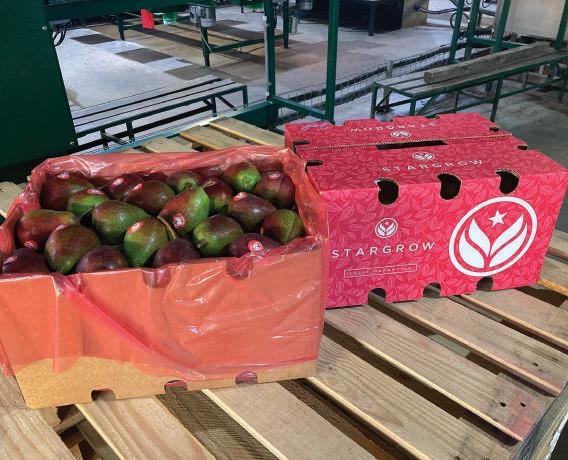
One of the key a ributes of Celina blush pears is their ability to be marketed both as a ripe and unripe variety
South Africa’s Stargrow Fruit Marketing was anticipating a strong market ahead of the arrival of the first new-season volumes of Celina blush pears in January. Sauer Kriger, who heads up the company’s trading division, said customers were reporting increased demand due to the smaller than normal Northern Hemisphere crop.
“We are already into the third week of packing Celinas and expect to enter into empty markets across the world,” he told Eurofruit. “Celina offers our customers the unique opportunity to sell the first blush pears in their respective markets every year, being the earliest commercially available blush pear variety in South Africa. With a size profile larger than other blush pears it enables us to target a wider market spread which leads to increased returns back to farm-gate for our growers.”
Over the past four seasons, Stargrow has focused on developing all of the major blush pear markets and it plans to continue to build on this momentum going into the 2024 season. One example is China, which returned very competitive prices in 2023 and is eagerly anticipating the arrival of the 2024 crop, Kriger said.
Stargrow said it expects to substantially increase volumes to this market during the 2024 season, especially in the early harvest window. Apart from the China and the European Union, other markets where Celina sales are gaining momentum include Russia, Canada, Vietnam, Indonesia, Malaysia, Singapore and Hong Kong.
Celina’s ability to be ripened has also led to an increase in uptake in the UK retail sector under the management of World Wide Fruit. “We have found the variety to be a positive addition to the pear catalogue,” said WWF’s Keith Bu erworth.
“The key a ributes are the brand name aligned to the appearance of the fruit and in particular the capability to market the fruit both as an unripe and ripe variety. This opens wider marketing opportunities, with most of the sales in the UK currently being for ripe fruit.”
TopFruit remains at the cutting edge
The visionary minds of South African fruit pioneers created a private company 40 years ago, which has since brought leading international fruit varieties to the country.
by Fred MeintjesSince its establishment in 1983 by three pioneers of the South African fruit sector, the late Dr Jim Button, Roy Jeffery, and Richard Hill, TopFruit has managed to introduce new varieties of pomefruit, stonefruit, table grapes, berries, kiwifruit and nuts to the country’s fresh produce business.
In the process, the company has established itself as the custodian of various fruit varieties, bringing innovation and value to breeders,
growers, and consumers alike, and establishing strong relationships with fruit growing sectors in other countries.
“Obviously, the proof is in the pudding and we are pleased to say that we are now seeing the results in exceptional varieties offered to the South African fruit sector,” says Liza Matthews, spokesperson for TopFruit. “Some of the successes include the Arra table grape varieties which are resistant to rain and adverse weather conditions.”
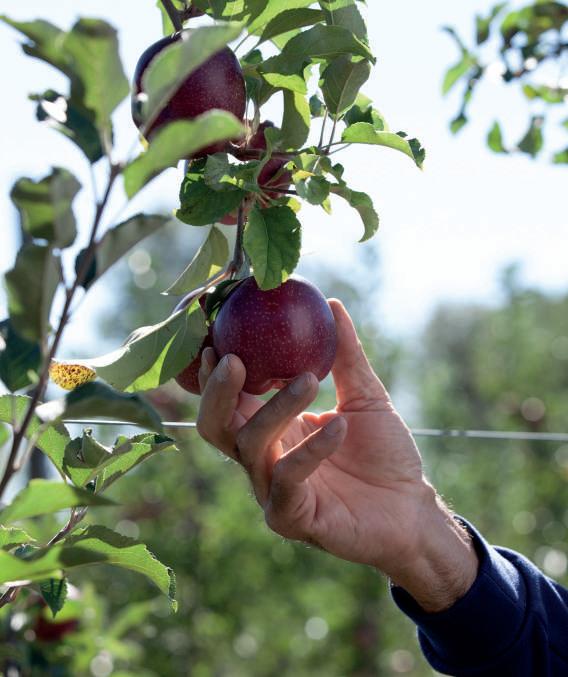
TopFruit marks 40 years
TopFruit celebrated its 40th anniversary in 2023 with the South African cultivar management company reflecting on its journey and looking to the future with great excitement. Managing director Rob Meihuizen said strategic partnerships would continue to play an important role in the success of the company.
“We remain focused on growth and innovation at the forefront of fruit industry developments, expanding our global presence, and introducing new and exciting fruit varieties and brands to consumers worldwide,” said Meihuizen. “With a diverse portfolio that includes pome fruit (apples, pears), stonefruit (peaches, nectarines, plums, apricots and cherries), table grapes, berries, and the recent addition of kiwifruit and nuts, TopFruit continues to lead the way in fruit production.”
Topfruit has managed a range of leading fruit varieties including the Pink Lady apple, which originates from the Cripps Pink variety. It has also worked with the likes of the Bradford varieties (stonefruit programme); Cripps Red/ Sundowner (today sold under the Joya trademark); Plant & Food Research’s blueberry programme in New Zealand; Bingo Gala, which is a South African apple mutation; Kiwiko BV, a joint venture to manage kiwifruit varieties globally; TopNut International’s joint venture to manage nut varieties globally, as well as a range of varieties from the Arra programme.
“We are pleased to say we are now seeing the results of exceptional varieties offered to the South African fruit sector”
In 2023 TopFruit also celebrated the first year of sales of the new branded apple, Soluna, in Asian markets. TopStar, a joint venture between TopFruit and Star Fruits, manages this new burgundy coloured apple globally. “It was a great success,” confirms Matthews. “We are working hard to establish the brand in Asia, the only market with fruit now. We will also be present at Berlin Fruit Logistica in a shared booth with Star Fruits. An extensive international evaluation programme is underway with test trees being planted all over the world.”

Another example of a leading international apple variety that TopFruit is involved with – and which is proving very successful –is the Joya branded apple. “This variety is gaining momentum because a new mutation with better colour is available and being planted in huge numbers,” she continues. “A global focus is also being worked on, bringing new possibilities to our exporters.”
Two apple varieties that were discovered in South Africa, namely Bingo Gala and Golden Joy, are also being commercialised by TopFruit globally. “Because these two varieties have a tree royalty only with no production royalty or marketing restrictions, producers are free to market it as they wish,” explains Matthews.
Bingo Gala is described as a “full cherry-red and impressive South African Gala apple mutation” and has been very well received in Asian markets, according to the group. “It is also important from a production point of view because only one or two picks are required to strip the trees,” she outlines.
Golden Joy, meanwhile, is a high-bearing, early South African Golden Delicious apple mutation, which is expected to boost the category.
“Then we also have a long association with the well-known Bradford (BQ Genetics) stonefruit varieties, which is helping to transform the South African stonefruit category,” Matthews adds. “We have exciting plums under evaluation and on offer.”

ABOVE—TopFruit’s Liza Matthews, AJ Jansen van Vuuren and André Agenbag
OPPOSITE—The Soluna variety has been a great success

Ruby Rush shines bright
Sugrafiftythree, a new early red seedless grape variety to be branded as Ruby Rush, brings new opportunities for growers locally and globally.
by Fred Meintjes

Heralded as “juicy, crunchy jewels in your mouth”, Sun World says its new Ruby Rush-branded range of early red grapes are sure to have a positive impact on the table grape world.
The results of this year’s harvest of semi-commercial vineyards in the Orange River and test block vineyards in Namibia, Berg River and Hex River are now in. And although limited in scale, the varieties have impressed growers with their early performance.
Sun World introduced the Ruby Rush brand in July 2023, featuring the Sugrafiftythree variety. The brand may expand in the future, incorporating other complementary varieties to enhance consumer recognition by ensuring a longer shelf presence throughout the year.
“Sugrafiftythree offers Sun
World growers around the world a sustainable red grape with natural colour development, better yields, lower input cost, and great postharvest attributes,” said Sun World’s Paola Barba. “Sun World licensed growers harvested Ruby Rush branded grapes this northern summer in the US, Italy, Spain, and Israel with positive results.”
“It is a sustainable red grape with natural colour development, better yields, less input cost, and great postharvest attributes”
In South Africa, JC Fölcher, the senior executive responsible for all table grape farms in the Karsten Group, says this season’s results have been very pleasing. “It is very important to note that Sugrafiftythree develops colour naturally and what we have seen this year boosts our confidence.”
He says that in the past there has not been a natural successor or potential replacement for Flame Seedless, and that the arrival of Ruby Rush is of great significance for the early regions.
GOOD RETAIL RECEPTION
The variety has also been well received by South African retailer Woolworths. “This season we received the first samples of Sugrafiftythree. the earliness of the variety is interesting, and berries remain firm postharvest,” says Frans Gelderbom, technologist fruit and Letitia Joubert, procurement manager at Woolworths. “We look forward to learning more about the variety as higher volumes become available.”
For the international table grape business, this is a significant development. Observers say there has always been a gap in the market, particularly in the early growing season, for a new range of red seedless varieties which could replace older cultivars – some of which have been around since the 1980s.
Barba also notes that the initial variety sold under the Ruby Rush brand is a ‘new generation’ red grape that is expected to be an ideal replacement for traditional early-season red seedless grapes. “For consumers, it offers a refreshing taste experience during the early season,” she says.
Volumes of Ruby Rush are set to increase globally over the next 2-5 years as the variety becomes available for growers to plant in other countries.


















Europe remains a high priority for Sati
Sati says it is focused on retaining its traditional markets while opening new opportunities in the East.
by Fred Meintjes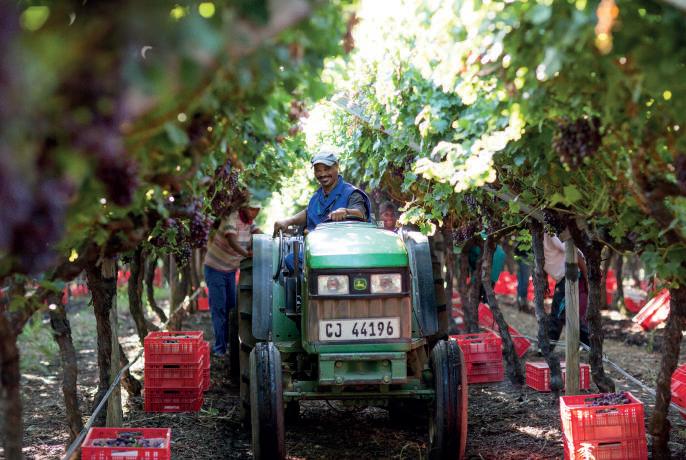
One of the South African Table Grape industry’s (Sati) key priorities is maintaining the country’s market share and position as a preferred supplier in the UK and Europe. This is according to Sati chief executive AJ Griesel, who highlights the advantages the country has in what is an increasingly competitive market.
“In addition to servicing our traditional markets, Sati has prioritised increasing South Africa’s market share in eastern markets, which include China and Southeast Asian countries, and North America which includes the US and Canada,” says Griesel.
“The global market landscape remains increasingly competitive,” he continues. “Peru, Chile and to an extent India have become contenders during South Africa’s marketing window. Peru and Chile export approximately 562,500 to
585,000 tonnes per year each, and ship to the EU. Australia exports 135,000 tonnes per year and ships predominately to the Asian markets.
“However, South Africa maintains certain advantages that we believe position us as a favourable supplier to the global market,” Griesel points out. “These include established history as a preferred supplier and longstanding supplier relationships as well as family-owned businesses and focused commercial players, which offer a personal touch and the ability to tailor to a market’s specific needs.”
South Africa can also extend a marketing window of five months, with the ability to supply consumer-demanded new generation cultivars throughout this time period. Above all, the country has a reputation for producing quality products.
“South Africa maintains certain advantages that we believe position us as a favourable supplier to the global market”
EASTERN PROMISE
During the past three years, the China Market Development Campaign has promoted South African table grapes through Chinese trade and retail channels, with positive results and feedback received in the 2022/23 season.
“In conjunction with the Western Cape Department of Agriculture, Sati’s objectives for this season include expanding the market development campaign to additional eastern countries,” Griesel notes. “Opportunities in Vietnam are currently being explored, due to the market’s preference for South African grapes and potential to absorb more of South Africa’s quality product. Last year Sati engaged with local exporters and the South African ambassador to Vietnam regarding the coordination of a collaborative approach.”
Meanwhile, South Africa is currently in the final stages of applying for market access to the Philippines and is looking forward to the potential opportunities this holds for the industry, according to Griesel.
“Cultivar consolidation has ensured that growers remain aligned with global consumer market trends, and as per Sati’s latest vine census, white seedless cultivars currently dominate South Africa’s supply,” he outlines. “Our top six exported cultivars currently comprise 50 per cent of our cultivar profile. These are Crimson Seedless, Prime Seedless, and the branded varieties Sweet Globe, Sweet Celebration and Autumn Crisp.”
ABOVE—Growers are planting in line with trends
RIGHT—AJ Griesel







CREATING A PROGRESSIVE, EQUITABLE AND SUSTAINABLE TABLE GRAPE INDUSTRY

TABLE GRAPES OF OUTSTANDING QUALITY AND TASTE, WHICH ARE RESPONSIBLY GROWN IN SOUTH AFRICA TO MEET THE HIGHEST GLOBAL STANDARDS, START THE JOURNEY FROM THE FOOT OF TABLE MOUNTAIN TO REACH MARKETS AND TABLES AROUND THE WORLD.
Assisting producers to retain, grow and optimise markets is the most important function of the South African Table Grape Industry (SATI), an enabling grower association. SATI represents growers on key government and industry initiatives aimed at creating more opportunities from ownership to accessing new markets in a sustainable way.
SATI assists growers with numerous support services including Industry Information, Transformation, Research, Technical
SOUTH AFRICA – QUALITY ON ROOT
Market Access, Market Development as well as Training and Development with the objective to establish South Africa as the Preferred Country of Origin for the world’s best tasting grapes.
63 Main Road, Paarl | PO Box 2932, Paarl 7620
+27 21 863 0366
info@satgi.co.za | satgi.co.za
linkedin.com/company/satgi @sati_sa
Scan to follow us on LinkedIn

Clemengold strives for excellence
The premium mandarin brand says it must deliver consistently on its quality promise, and it is living up to this through innovation and precision farming.
by Fred MeintjesAbrand can only be as strong as its ability to consistently deliver on its quality promise. This is the opinion of Adéle Ackermann, Clemengold’s international marketing manager, who speaks exclusively with Fresh Focus South Africa about the evolution of this popular mandarin brand.
“For the premium Clemengold mandarin brand, our ability to do just that is derived from the expansive family of companies that form part of our larger group, and a legacy of excellence through continuous improvement and best practices,” she explains.
Clemengold says that superior quality means fruit that can match the specifications for inclusion in the brand, with a good return to contributing growers.
Firstfruits, the brand’s
technical advisory and continuous improvement company, works in tandem with Indigo Fruit Farms, integrating technology into its farming and packing operations, setting new benchmarks for quality and efficiency.
The backbone of the group’s agricultural innovation is FarmNode, a precision farming product developed by the company's software arm, Citrii Software. This technology, implemented under the guidance of Firstfruits, digitises various aspects of farming operations, which it says is “ushering in a new era of efficiency and sustainability”. The product covers several areas, including irrigation and fertigation, crop protection and manipulation, as well as packhouse practices for improved efficiency.
Jòkevan Wyk, Citrii business
analyst, says real-time data analytics provide insights into soil moisture levels, allowing for precise management of water and nutrient usage. “This not only maximises resource efficiency but also ensures optimal growing conditions, contributing to better packouts and superior fruit quality,” she explains.
Precision farming also extends to crop protection practices, where FarmNode aids growers in monitoring and controlling pests and diseases with unparalleled accuracy. “By employing targeted interventions based on real-time data and expert recommendations, Indigo has been able to minimise the use of pesticides, promoting sustainable farming practices,” van Wyk says. “FarmNode's capabilities extend to crop manipulation actions, allowing growers to make datadriven decisions regarding pruning and thinning – an approach that enhances fruit quality and increases yields, leading to better packouts.”
Clemengold’s commitment to technological excellence extends to its packhouses. “We’re proud of our packhouse teams’ ability to pack the right fruit in the right box at the right time,” says Ackermann. “This enables our commercial and marketing teams to honour supply agreements with a variety of global clients – each with their own expectations.” Automated systems, supported by data, ensure that each piece of fruit meets the highest standards of size, colour, and quality. Ackermann says the Clemengold brand has experienced a good year with “memorable and culturally relevant marketing campaigns across the globe”, and has satisfied clients and citrus lovers.
ABOVE—The Clemengold brand is internationally renowned BELOW—Clemengold focuses on continuous improvement and the implementation of best practices
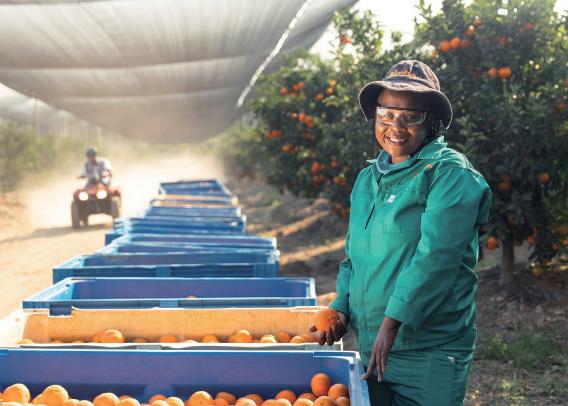


Westfalia counts down to Chinese entry
There is great excitement in the South African avocado industry as access widens in Asia.
by Fred Meintjes
Following the confirmation in 2023 that China has opened to avocados from South Africa, Westfalia Fruit anticipates the first shipment will arrive in southern Chinese ports at the end of March. The company says the opening of China to South African avocados is an exciting development.
South Africa is strategically well positioned to supply the growing Chinese market with Hass, with transit times from Durban to southern ports in China, such as Hong Kong and Shanghai, only 18-22 days.
There has also been a boost for the industry with the news that Japan has also opened its doors to South African Hass avocados.
“It is indeed good news for us that
the protocol for exports of South African Hass avocados to Japan has been finalised,” says Subtrop chief executive Derek Donkin. “Widening access to easter markets allows for market diversification, providing opportunities other than the EU and UK, which currently absorb 95 per cent of South African avocado exports. These traditional markets, however, will remain important markets for South Africa.
“Tapping into growing markets in the Far East will allow for further expansion in the South African avocado industry, which has grown at a rate of 800–1,000ha per annum over the last five years,” Donkin explains. “Current plantings stand at 20,000ha.
Access to China and Japan has come at a critical time when these
new plantings are coming into production.”
Hass supply will be available over a seven-month period from April to October, and it is anticipated that production volumes in South Africa will increase in the short term as existing orchards mature and yields develop. The accessibility and predicted growth of the Chinese market will support the distribution of increased volumes in a responsible manner for the long-term benefit of the industry.
LEADING EXPORTER
Westfalia Fruit is the leading exporter of avocados in South Africa, representing half of all exports in the category, and the company says that with its
ABOVE—The opening of new markets in the Far East is a boost for the entire South African avocado business
OPPOSITE—Young avocado orchards at Westfalia Fruit Mozambique
technical experience it is ideally placed to meet the phytosanitary requirements of the Chinese market.
“Westfalia attended Asia Fruit Logistica in September 2023, with our colleagues from South Africa and South America meeting with several existing and new customers,” comments Hans Boyum, commercial director Westfalia for the Africa region. “As a global supplier we have experience of working collaboratively across continents, to leverage the efficiencies of our integrated supply chain to meet the requirements of customers and markets.”
Zac Bard, global business development executive Westfalia and chairman of the World Avocado Organization, says education and awareness will be key to developing the Chinese market. “Currently avocados are not well known or used particularly within traditional dishes,” he outlines. “Promotions developing

consumer education will no doubt vastly accelerate the growth in this relatively new avocado market. This approach has been proven in other markets across the globe. In the wider context a broader market benefits the global avocado industry from all origins.”
Over the next few months Westfalia will be welcoming several customers from China to orchards in South Africa, to experience firsthand how the fruit is grown, harvested, and managed sustainably throughout the supply chain to ensure quality and freshness.


COLD TREATMENT
Donkin says the protocol for shipment to Japan requires a cold treatment of 2°C for 19 days. “South African research has shown that Hass avocados are able to withstand this treatment, and trial shipments to the UK under this regime have been successful,” he notes. “Nonetheless, to ensure that we can deliver quality avocados, a trial shipment to Japan will be taking place in mid-2024. Hass avocados require a fairly high dry matter level to withstand the cold treatment, so shipments will only take place in the latter part of the South African season.”
Shipments to China and Japan will most probably be from the port of Durban. “South Africa is closer to the market than some other origins supplying China, meaning shorter transit times with a positive impact on fruit quality and shelf life,” Donkin adds.


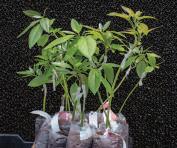
Port delays drive new solutions
Logistics company GoGlobal has created new options for Southern African exporters as problems in the Port of Cape Town continue.
by Fred MeintjesThe early season experiment by South African logistics operator GoGlobal, in association with MSC, to ship Namibian and South African grapes through the port of Walvis Bay in Namibia has apparently been a great success. And it is indicative of the new thinking required as disruption and delays continue at the Container Terminal in Cape Town.
GoGlobal has for many years been working on holistic solutions for the South African and Namibian
export industries. These involve activities in and around the port of Durban, investigating new options via the port of Maputo, shipping fruit via Port Elizabeth in the Eastern Cape, shipping through Walvis Bay in Namibia and also working with other exporters to utilise opportunities in specialised reefer vessels.
“MSC has agreed to include Walvis Bay in their schedule to call Walvis after Cape Town,” says Delena Engelbrecht, CEO of GoGlobal. “With









their call at Port Elizabeth, along the South African Eastern coast, it allows us two opportunities to load on a weekly basis.”
Fruit loaded via Walvis has a longer shelf-life due to the shorter logistics chain, she says, noting that on average last season delays of ten days were experienced in Cape Town. “We simply had to find new solutions to get containers out without delay to the market,” Engelbrecht confirms.
With the South African pear and apple seasons now starting, pressure in the port of Cape Town will mount. “This makes the lives of logistics service providers who form the vital link for South African fruit growers to the market extremely difficult,” she continues. “We are challenged but know the important role we play to keep South African
fruit reaching markets in excellent condition.”
The operation through Walvis Bay is more expensive than getting the grapes to Cape Town for shipment. “It is around 1,600km from Aussenkehr in Southern Namibia and for exporters from the Orange River it is even further,” Engelbrecht outlines. “It is also costly to transfer containers to the Eastern Cape, but hopefully we will see the results in good arrival condition.”
An important development this season is an increased use of specialised reefer vessels. In all, only a small volume of fruit will be accommodated in this way. Vessels are only confirmed three weeks in advance and exporters still see this as an expensive option.
“An efficient container giving us

the door-to-door option is by far the preferred option. That it is why it is so important that the port of Cape Town must return to its former levels of service and efficiency,” she says. “In the meantime we are determined to offer our clients the best solutions to ensure their successful export operations.”
Africa
ABOVE—GoGlobal’s fleet ready to mobilise

Fruits brand comes alive
Leading South African exporter Fruits Unlimited finds a new way to broaden its range of products, by reinvigorating an existing brand.
by Fred MeintjesFruits Unlimited, a company that has traded in the global fruit industry for over 30 years, has found an innovative way of expanding its product range by revitalising a well-established company brand.
The well-established Fruits Unlimited brand, simply known as Fruits, has been part of the Unlimited Group for some time, but recently much of the company’s focus has been on subsidiaries Yukon and Icon. Yukon is South Africa’s premier specialty produce exporter and Icon focuses on stonefruit and pluots in particular.

“The company founded with sound principles and a strong producer focus, has put its dependable and experienced team to the task of widening their unique basket of specialty produce,” explains Hans Christiaan MuylaertGelein, managing director of Fruits Unlimited. “Lots of wonderful fruit grown here is not always getting the
ABOVE—A range of speciality produce offered under the Fruits brand
OPPOSITE—Fruits Unlimited MD Hans Christiaan Muylaert-Gelein


recognition it deserves because of a short season or the relatively small volume. We know them as exotics or minor crops. But at the Unlimited Group we know that variety is the spice of life and we want to bring these unique fruits to our customers across the world.”
Muylaert-Gelein says the company is determined to do this with the same set of standards on flavour, food safety, innovation, logistical excellence, customer service and fair pricing that are commonplace in the bigger fruit categories that South Africa is known for. The ‘Fruits’ brand, combined with the infrastructure of Yukon and Icon, will be used to bring these new products to customers around the world.
A wide range of products are involved, he confirms, and they reflect the great climatic diversity of South Africa. Tropical and subtropical fruits such as lychees, kumquats, mangoes and papayas are grown in the northern parts of the country, while The Western and Eastern Cape offers a Mediterranean climate to grow figs, passionfruit, pomegranates and dragon fruit.
Seasonally Fruit Unlimited also include blackberries and raspberries into the mix, MuylaertGelien outlines. Dragon fruit will be shipped from January to May, raspberries from December to May, lychees from November to January, strawberries and blueberries from May to December, passion fruit from February to August and figs from
February until May.
“We have enjoyed bringing this mosaic of unique suppliers and products together under the ‘Fruits’ umbrella to give them the dedication they deserve,” he adds. “We’re very enthusiastic about adding The Fruits Brand under the Unlimited Group umbrella, to streamline our business activities in the trendy fruit ranges that the world has to offer. This will also further broaden our offering to our existing clients, as well as attract new business in the global markets we operate in.”


Our Exotics range include: Dragon Fruit and Passion Fruit, Raspberries, Lychees, Papaya, Figs, Baby Pineapple, Kumquat and Mangoes Our selection is always expanding with exciting new options.
www.fruits.co.za


It’s a people business
South Africa’s fruit industry knows it must protect and nurture one of its most valuable resources.
People are very much at the heart of South Africa’s fresh produce industry. From the orchards to the packhouses, they provide the energy and skills that are needed to grow, harvest and export its products.
Hortgro, the country’s deciduous fruit industry body, has spent the past few years developing new projects that can support the many permanent workers who keep South Africa’s orchards and packhouses in operation. These include the Fruit Workers Development Trust, set up in 2021 to identify and address issues facing farm workers, and Hortfin, a
financing programme that gives black farmers access to vital funds.
In some cases, that work can transform the lives of those involved. “Over the last ten years, we have created 855 new hectares and 3,713 new jobs,” says Mariette Kotze, Hortgro’s operations manager. “The value of new orchards should be more than R8bn. And our vision is to double the size of the industry by 2050.”
For some fresh produce growers and exporters, this work is essential if the industry is to head off the kind of problems seen elsewhere in the world, where a shortage of labour has become a major issue. Despite its high level of unemployment, labour supply is nonetheless becoming more expensive and harder to find, some argue.
In that context, any support for career development, specialised training and educational programmes represents an important step in addressing that challenge.
SAVE THE DATE 5|6|7 Feb 2025 Berlin










Novelty works well at produceleading show
In addition to its the prestigious annual Fruit Logistica Innovation Award, the show has introduced a new prize category for technology.
by Carl Collen@carlfruitnet
Fruit Logistica Innovation Award nominees
Three Halves Avocado Fresh with 30 days shelf life – Infuseo, France
An innovative solution from its Naked Avocado range, 100 per cent fresh, ready to eat, and free from preservatives, acidifiers, and additives with a 30-day shelf life in refrigeration.
Zucchiolo – Unica Fresh, Spain
Zucchiolo is a vegetable that marks the beginning of a new product category in the European market. It can be consumed fresh and raw in a salad, similar to a cucumber, and cooked, like a zucchini or eggplant, standing out for its versatility.
Frutastic – Gautier Semences, France
Frutastic innovative squash varieties by Gautier Semences stand out, ensuring consistent yields through their highly parthenocarpic nature
and adaptability to various indoor conditions.
Exceed Watermelon – Staay Food Group, Netherlands
A modern twist on the traditional watermelon. The Exceed mini watermelon brings sustainability and convenience to the forefront with extended shelf life, less waste, and robustness in cultivation.
Calypso Sweet Red Onions –Bedfordshire Growers, UK
Join a grower’s 30-year journey dedicated to cultivating the finest Calypso sweet red onions. In his 80s, he still personally tastes each bulb for perfection. Experience a harmonious flavour with low pungency, allowing natural sweetness to shine.

The shortlist of nominees for this year’s Fruit Logistica Innovation Award (FLIA) has been released by the leading trade show for the global fresh produce business. Winners of the annual awards for outstanding innovations from the entire fruit and vegetable value chain are chosen exclusively by trade visitors to Fruit Logistica 2024, which takes place in Berlin from 7 to 9 February 2024.
As revealed on the event’s FruitLog news page, contenders for this year’s award include a perfectly ripe, peeled avocado with a shelf-life of one month, a versatile cross between a cucumber and a squash, a new trailblazer in courgette production, a modern twist on the watermelon, and a naturally sweet, pink-red onion.
In addition to the FLIA, a FLIA Technology award will be presented for the first time in recognition

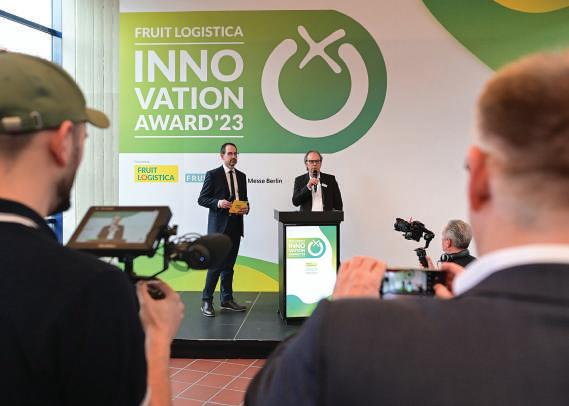
of innovations in the field of machinery and technology. Nominees for this award include the world’s smallest self-service asparagus peeler, a mobile app that counts fruit before harvesting, a natural method to prevent whitefly damage in greenhouse veg, an AI-enabled crop trimmer, and a robotic exoskeleton for packhouse workers.
Each of the nominated products will be displayed at Fruit Logistica 2024 in a dedicated FLIA exhibition area between halls 20 and 21, as well as in a special FLIA Technology exhibition area between Halls 1.1
and 2.1. To experience technical innovations, trade visitors have the chance to participate in guided tours to the exhibition booths of the FLIA Technology nominees.
Winners will be announced at an award ceremony taking place at 2:30pm on Friday, 9 February 2024 within the FLIA Technology exhibition area between Halls 1.1 and 2.1.
FLIA and FLIA Technology are the fruit and vegetable industry’s most important global awards and are presented by Messe Berlin with Fruitnet Media International, official partner of Fruit Logistica. E
PICTURED—The Fruit Logistica Innovation Award presentation, which traditionally takes place on the third day of the event, is always a highlight of the week in Berlin
Fruit Logistica Innovation Award Technology nominees
Aspara to go – Hepro, Germany
Hepro’s Aspara to go is the smallest self-service asparagus peeling machine in the world. Covering an area of 0.34m², it peels a standard commercial quantity in under a minute and uses a professional peeling principle to ensure perfect peeling results for both green and white asparagus.
Crop Load Vision – Croptracker, Canada
Crop Load Vision (CLV) is a mobile app for counting pre harvested fruit developed by Croptracker. Using only a mobile iOS device, CLV captures fruit count in real time to assist growers in faster and more accurate crop load assessments.
Mirical – Koppert, Netherlands
The new packaging serves as a user-friendly release system, improving application precision and reducing plastic by 99 per cent. Significant improvements have been made in both the quality and performance of Mirical, Koppert’s biological solution for destructive whitefly in greenhouse vegetables.
Roto-cut vegetable trimmer – Wyma Solutions, UK
A unique, fully automated vegetable trimming system to remove foliage, crowns, and tails from vegetables prior to packing or processing. It is the first of its kind to use a combination of optical technology, a smart recognition system and artificial intelligence to individually determine the size and shape of each vegetable and the appropriate point at which it should be cut.
Apogee – German Bionic, Germany
The German Bionic Apogee robotic exoskeleton combines human intelligence with machine power to enhance the health, safety, and wellbeing of those working in tough, physically demanding jobs.
The right apple for every season
Thanks to its market-orientated variety strategy, with both traditional varieties and new club apples from integrated and organic production, VIP, the Association of Fruit and Vegetable Producers from Val Venosta, is able to meet the changing needs of consumers.
Farmers in Val Venosta in South Tyrol have been growing apples for generations. The market conditions have changed significantly over the decades, but VIP has secured its position as a first-class apple partner for its customers all over the world with forward-looking measures and a renewed varietal assortment.
DIVERSE PRODUCT PORTFOLIO
One apple variety alone is not enough to fulfil the different needs of customers and consumers around the world. This is why Val Venosta’s apple producers are also dedicated to the cultivation of other traditional varieties such as Red Delicious, Gala and Pinova. VIP’s apple range is completed by new premium varieties: “This broad product portfolio enables VIP to reliably offer customers the right apple varieties over a period of 12 months, both from integrated cultivation and in organic quality,” explains Joachim Rabensteiner, export sales director.
CLUB APPLES FOR NEW TARGET GROUPS
Club apples are playing an increasingly important role in VIP’s product range strategy. New varieties expand the classic
range of apples from Val Venosta and help to meet consumers’ different tastes and needs. The new premium apple varieties are particularly popular with younger target groups in various markets around the world: “Whether it’s a refreshing summer apple with tropical notes or a classic winter apple, we are able to offer the right apple for every season, providing a unique taste experience from autumn through to the summer months,” explains Fabio Zanesco, product manager at VIP.
SOPHISTICATED VARIETY STRATEGY
Not all apples are the same. “Apple lovers’ tastes have changed in recent years. Unlike in the past, consumers are specifically looking for their personal favorite apple that suits their taste. Innovative club apples meet these new preferences better than traditional apple varieties,” explains Zanesco. These apple varieties therefore contribute significantly to the renewal of VIP’s varietal assortment and are an important factor in competitive differentiation.
GOLDEN AS AN INTERNATIONAL BESTSELLER
VIP has been a reliable supplier of high-quality Golden Delicious
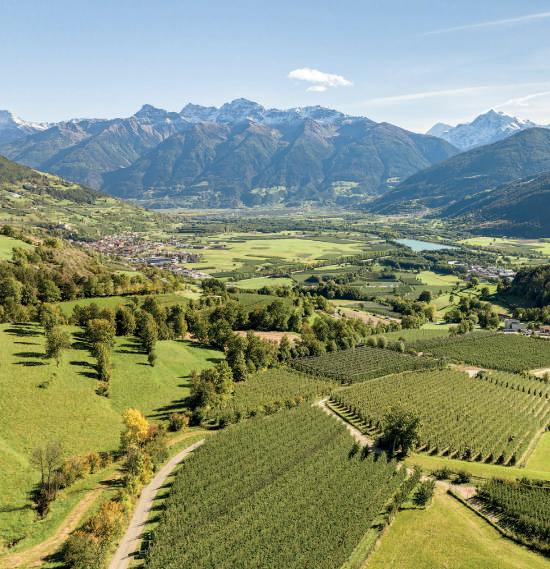
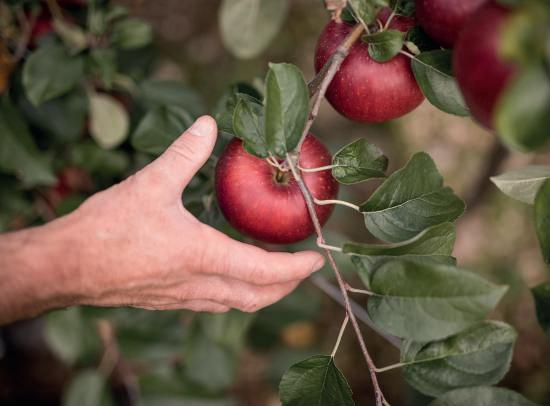


apples for decades. This traditional apple variety is still in demand on the European and international markets. Val Venosta’s historic main variety currently accounts for 50 per cent of VIP’s total apple production. Not without reason: the Golden apples ripen in the Val Venosta apple orchards at an altitude of between 500m and 1,000m above sea level. This altitude promotes their extraordinary product quality: the apples ripen slowly in the Alpine-Mediterranean microclimate. The fine-celled flesh of the Golden and its flavour can develop intensively. Over 300 days of sunshine a year promote the balanced ratio of sugar and acidity in the apple. The pronounced temperature fluctuations between day and night also favor ideal colouring and give the Golden Delicious its characteristic red blush. Word of the quality of Golden apples from Val Venosta has long since spread: “In addition to our regular customers, we are also receiving enquiries from new
markets such as Latin America, which confirms the product quality of our main variety,” explains Joachim Rabensteiner, export sales manager at VIP.
ORGANIC LEADER IN EUROPE
VIP has established itself as the largest organic apple producer in Europe due to an average annual harvest of more than 50,000 tonnes of organic apples. The Val Venosta production area not only scores highly in terms of quantity, but also guarantees the highest quality in terms of apples, processing and customer service: “At VIP, we have a high-tech organic packing facility where all organic apples from Val Venosta are processed. This enables us to guarantee our customers a first-class service with fast order processing,” explains Gerhard Eberhöfer, organic product manager at VIP.
100 PER CENT TRACEABILITY
More and more consumers want to know where their food comes from and how it is grown. With the innovative BioGraphy project, VIP enables 100 per cent traceability of organic apples from the Venosta Valley: the name of each organic farmer from whom the apples originate is printed on the packaging. Consumers can enter the name on the online portal biography.vip.coop to find out who grew their apples. They can find out about the history of the organic farmer and receive valuable information about the growing region and organic production methods in Val Venosta.
SUSTAINABLE PACKAGING
VIP is also breaking new ground when it comes to the packaging of Val Venosta organic apples. Sustainability in cultivation continues with ecological packaging solutions that are made from environmentally friendly materials and are recyclable. The latest form of packaging for Val Venosta organic apples consists of a recyclable paper bag with a window made of linen net.
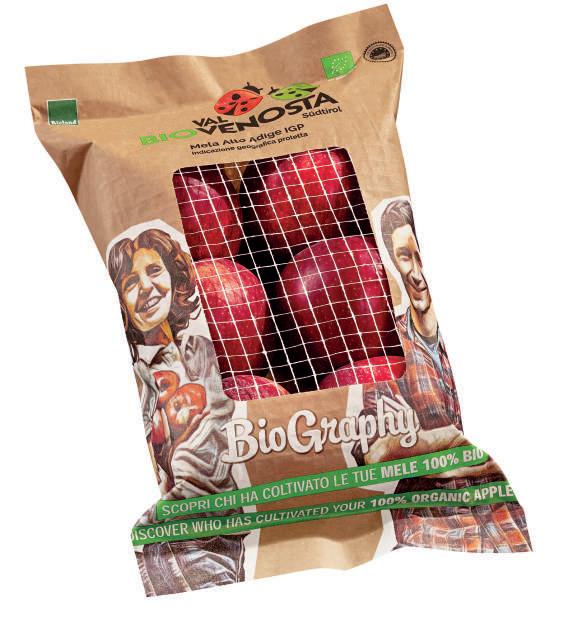

Sun shines on Yello apples as volumes rise
The trademarked variety, which is marketed by Italy’s two largest apple exporters, has apparently continued to win over buyers across Europe.
by Mike Knowles @mikefruitnet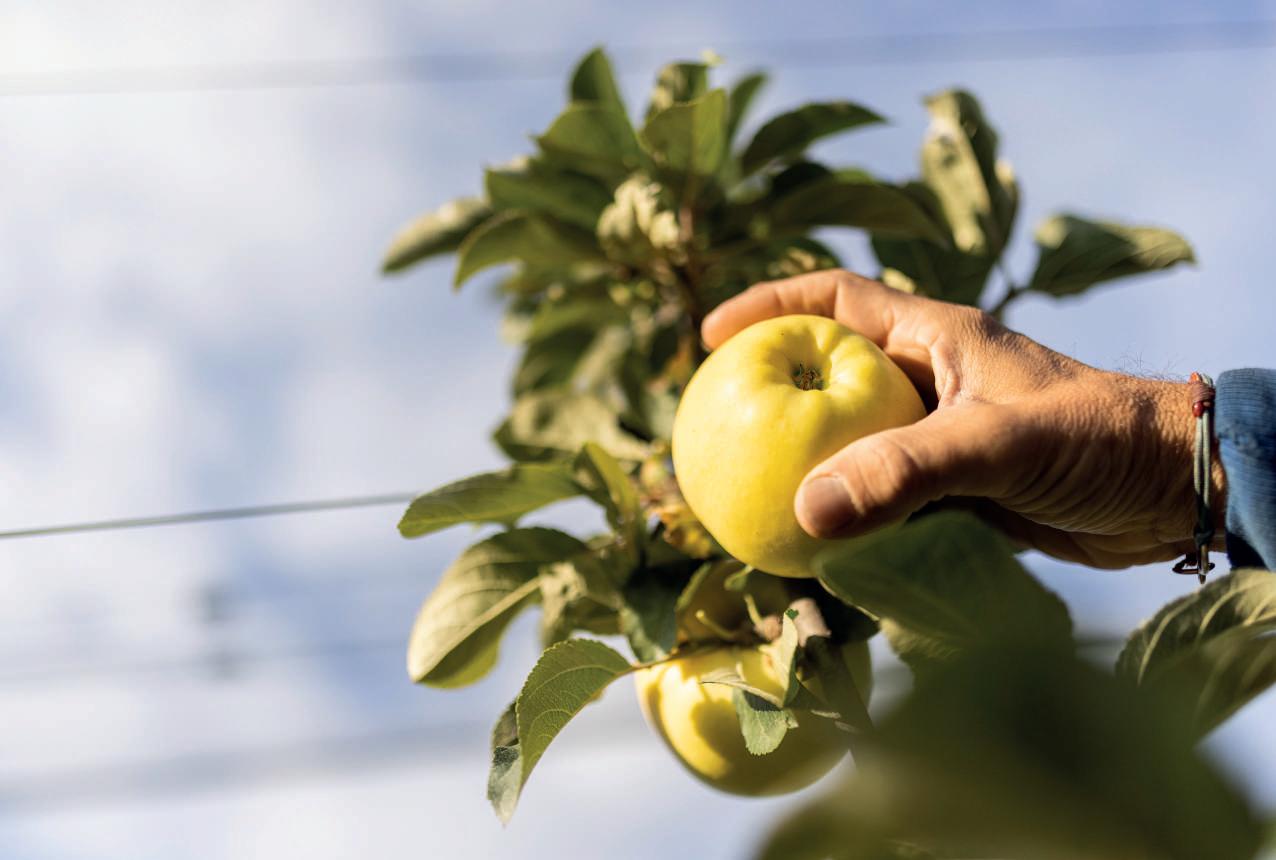
It’s been more than seven years since Yello, a new yellowskinned apple bred in Japan and grown in the Südtirol region of Italy, was officially unveiled at Interpoma in Bolzano.
Since that initial launch, the variety has apparently built up a committed customer base as its production volumes have grown. VOG and VIP, two major Italian marketers that are licensed to sell it, say sales have also increased steadily. That demand is said to be strong and growing among wholesalers and retailers alike.
Around the start of November, the companies announced Yello’s return to the market. This season they expect a slightly bigger volume of conventional and organic fruit to be available – all of it in what they describe as “excellent” condition.
From a sales standpoint, the outlook is encouraging for both VOG sales manager Klaus Hölzl and Fabio Zanesco, contract variety manager at VIP. “Thanks to its excellent sensory characteristics, Yello has won a loyal audience among apple specialists and discerning consumers,” they say in a statement. “Market demand is promising in Italy, as well as in other European and non-European countries.”
Yello-branded apples are a variety called Shinano Gold, a cross between Golden Delicious and Senshu that is characterised by bright yellow skin, crisp flesh and a high level of natural sugars. Each derives from the foothills of the Hida Mountains, also known as the Japanese Alps,
“Market demand is promising in Italy, as well as in other European and non-European countries”
where the variety was discovered.
According to its marketers, consumers appreciate Yello’s exotic aroma, its inviting pale-yellow colouring, and its fine, crisp flesh. Those features, they argue, make it a product that stands out in what remains a very crowded and competitive market segment.
And for apple farmers in South Tyrol, this seemingly unique variety seems to have a bright future ahead. E
ABOVE—Yello is a variety called Shinano Gold, which originated in Japan
Fruit and Vegetables made in Italy
INNOVATION AND STRATEGIC PRODUCE



On the Italian and European scene for more than 60 years.
12 production plants and 12 reception and storage centres.
SOLARELLI TOP OF THE RANGE



Specialization in the top italian fruit and vegetable products.
151.000 tons production.
SOLEMIO TOP QUALITY BRAND FOR FAR EAST


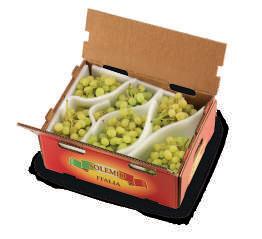
Adoption of integrated production for over 70% of production.
Leader in organic production
Pink Lady delivers major media blitz
The start of the apple season was highly promising for Pink Lady, with good sales growth across its main European markets and a communication plan set to reach millions of new consumers.
by Tom Joyce @tomfruitnetThe Pink Lady Europe association has estimated a volume of 225,000 tonnes of Pink Lady and PinKids quality apples for the 2023/24 campaign, a 20 per cent increase over last year’s total.
Accompanying the arrival of the first fruit in European stores is a major marketing and communications plan, including promotions on radio, billboards and digital channels in then European countries, with expectations to reach over 350m people in November.
Despite an especially hot start to the autumn, along with heavy rainfall, the quality of the
Pink Lady apples harvested was optimum, according to the group, with excellent colouration, a high sugar content and satisfactory firmness.
In-store, Pink Lady apples got off to a dynamic start, with sales up 24 per cent for the first two weeks of the campaign, including good growth in the brand’s main markets (+34 per cent in the UK, +28 per cent in France and +18 per cent in Belgium).
Sales were also up 21 per cent across wholesale markets in France and as much as 54 per cent in Spain.
A range of new products is set to attract consumers and build
loyalty, according to Pink Lady Europe, including a host of promotions and two new shopping bags signed by two European designers, French painter Léa Morichon and German artist duo Zebu. The bags are available in nearly 2m 2kg trays.
“Then there’s the partnership between PinKids apples and the release of the Trolls Band Together film until March 2024, with almost 2m punnets in the licence colours distributed,” the association revealed. “A major food event, Pink Chefs, will also take place from January 2024, with a 360° campaign in almost 10,000 outlets across Europe, inviting almost 5m consumers to come up with creative ideas for enjoying Pink Lady apples.” E

FRESH PRODUCE FORUM

• Focus on the key issues in the industry today
• The latest topics and challenges for the fresh produce sector
• Open forum in the exhibition halls
• Free of charge to all visitors and exhibitors
• Simultaneous translation in English, French, German, Italian, Spanish
2024 PROGRAMME (subject to change)
• Wednesday, 7.2.2024
10.00-11.00
AI - the key to the future (?)
11.30-12.30
Rethinking horticulture
13.00-14.00
Transforming agriculture
15.00-16.00
Climate change – new paths and new opportunities
• Thursday, 8.2.2024
10.00-11.00
Supply chain legislation – is it working?
11.30-12.30
AI and digitalisation to optimise the supply chain and reduce food waste
13.00-14.00
Modern wholesale markets: centres for top quality and local, sustainable supply
15.00-16.00
Packaging: new legislation is making it more sustainable than ever
• Friday, 9.2.2024
10.00-11.00
Balancing demand and supply sustainably with AI
12.00-13.00
Avocados – the state of the market and data for optimised marketing
FRUCHTHANDEL MAGAZIN
Focus issues for FRUIT LOGISTICA 2024: No. 1/2 2024 to 10/2024
Fruchthandel Magazin-Advertising Department: anzeigen@fruchthandel.de
Tel +49-(0)211-9 91 04-40
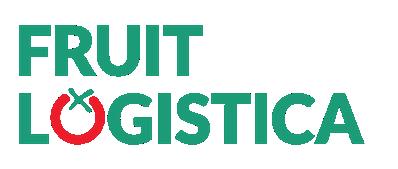
Messe Berlin GmbH
Messedamm 22 |14055 Berlin | Germany
Tel +49-(0)30-3038-0 |
Fax +49-(0)30-3038-2020
www.fruitlogistica.com fruitlogistica@messe-berlin.com
Exceeding expectations
The new Exceed watermelon from Staay Food Group and Hazera has been nominated for the Fruit Logistica Innovation Award.
by Carl Collen @carlfruitnet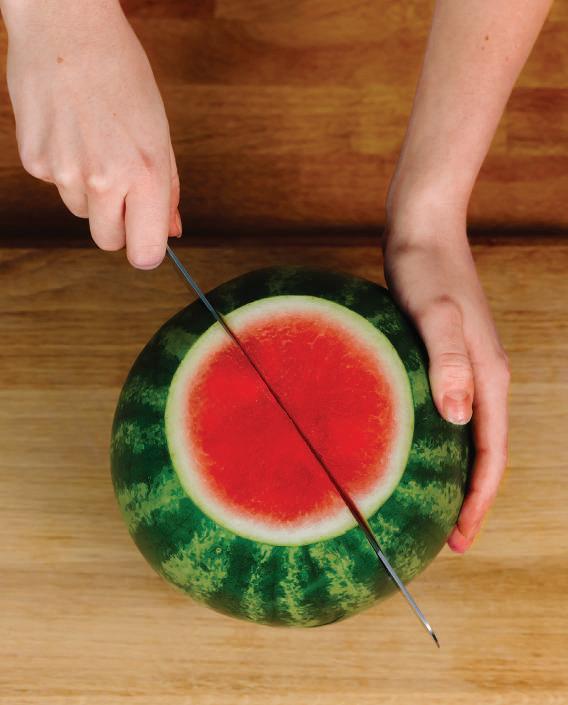
Hazera and Staay Food Group have confirmed that the Exceed mini watermelon has been nominated for the 2024 Fruit Logistica Innovation Award, with the companies describing it as a “proud moment” in their long-standing partnership. The winner will be announced at Fruit Logistica in Berlin, where Staay will be present to premier the Exceed watermelon.
Mark Loojenga, marketingmanager at Staay Food Group, and Michal Taraska, global value chain lead at Hazera, say that the Exceed watermelon has earned its nomination through a unique combination of qualities that benefit growers, retailers and consumers.
“The Exceed watermelon is a durable and eco-friendly variety, with strong resistance to diseases like powdery mildew and has plants that provide multiple
BELOW—The Exceed watermelon is satisfying a growing demand for smaller watermelons
harvests,” says Loojenga. “Not only does this make life easier for the grower, but it also requires less fungicides and significantly less water than the production of traditional watermelons.”
Taraska explains that this also helps reduce food waste. “Exceed makes it possible to reduce losses in production and during transport,” he says. “And due to the variety’s extended shelf-life of over 5-10 days longer than traditional watermelons, this variety displays a long-lasting freshness in both supermarkets and consumer’s homes.”
With a compact, uniform size, the Exceed watermelon is answering what is a growing call in the northern European and US markets for smaller watermelons.
“The size is suitable for ever smaller households and is easy to keep in the fridge,” says Loojenga. “And they’re seedless, which is both a major convenience for consumers and a waste-saver. But it’s the taste and colour they come back for.” Taraska agrees that taste is crucial, pointing out that Exceed has a “really sweet and crispy taste”, the result of its above-average Brix level.
The launch of the Exceed mini watermelon for the European market will take place at Fruit Logistica, where Staay Food Group will be exhibiting. “Here, we will also display a selection of other products we grow and offer ourselves,” notes Loojenga. “For the first time we can show our three club varieties of coloured pears together ¬– the Red Conference, Early Desire and Dazzling Gold are all exclusively available through Staay Food Group. Secondly, we will showcase our hydroponic le uces, and finally our wide range of available vine tomatoes.”
“In addition, we will bring special a ention to our branch in Venlo, which focuses on the foodservice industry,” he continues. “This location provides quite a unique service for the German market, where customers can buy products per box instead of per pallet and can combine different products on one pallet. This is ideal for restaurants, who usually don’t need entire pallets of one product.”
The prize-giving ceremony for the Fruit Logistica Innovation Award will take place on 9 February 2024, at the FLIA Technology special exhibition area between Halls 1.1 and 2.1. According to Loojenga and Taraska, Exceed’s nomination “shows we are on the right track in our team effort to successfully align the development, cultivation, sales and marketing of excellent and innovative products”. E


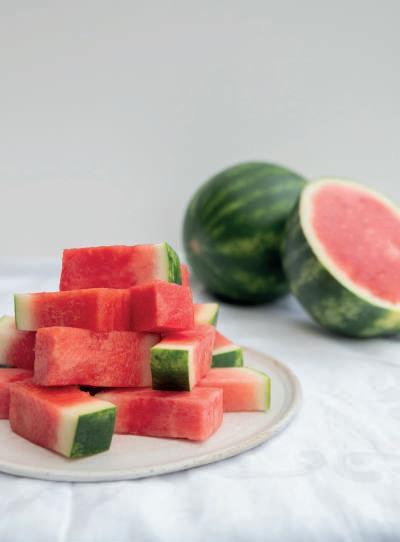








Be Inspired
The new Inspire strawberry variety sets high standards by offering consistent quality, availability and taste, according to The Greenery.
by Carl Collen @carlfruitnetThe Greenery has revealed that it is rolling out the Inspire strawberry across Europe, a variety developed in the Netherlands that it says promises an “unparalleled taste experience” while also offering solutions to vulnerability and wastage challenges.
“With the new strawberry variety Inspire, The Greenery is se ing the standard by offering proven quality with extended shelf-life,” explains Pieter van Pelt, manager sales and sourcing at the group. “This results in less wastage and more stable availability.”
Inspire strawberries are available early in the season, starting in week 10 and running through to week 27 – a much longer period than usual for the glasshouse-grown fruit – allowing the demand for Dutch strawberries to be met comfortably. According to The Greenery the variety is also available in the autumn through to early December, with the ultimate aim of year-round availability of high-quality strawberries.
“With Inspire, The Greenery is se ing the standard by offering proven quality with extended shelf-life”

Inspire strawberries are grown by an increasing number of The Greenery’s producers, while they are also grown under a sub-license.
“We are currently testing the exposed cultivation of Inspire strawberries and the results are promising,” notes Klaas de Jager, agronomist at The Greenery.
“The expectation is that we will have Dutch Inspire strawberries available year-round within 2-3 years from now.”
The Inspire strawberry comes from the innovation programme that The Greenery has been “commi ed to for years”, working with renowned breeders. Inspire was bred by US breeding company Plant Sciences and for the past seven years, The Greenery and its growers have developed the cultivation of the variety. Dutch
Growers are not only enthusiastic about the product’s characteristics but also over Inspire’s production performance. “The Inspire strawberry provides a labour efficiency of more than 15 per cent in my growing farm,” confirms Jan van Meer of Meerfruit, while Lilian van Rijn from Kwekerij Rijnland adds: “Inspire strawberries also have high disease tolerance. In addition, the variety has a consistent harvest pa ern with exceptionally high picking performance. This is reflected in the very high percentage of Class I fruit (>95 per cent).”
The Greenery continues to be the exclusive rights holder for the production of the Inspire variety in Benelux, which means that all Inspire production from the region will be sold through The Greenery in 2024.
“We are delighted with the success of Inspire strawberries in Europe,” says David Markowski CEO at The Greenery. “This confirms not only our commitment to innovation, but also our ability to grow in a market-oriented manner where we continuously focus on the desired returns for our growers.” E



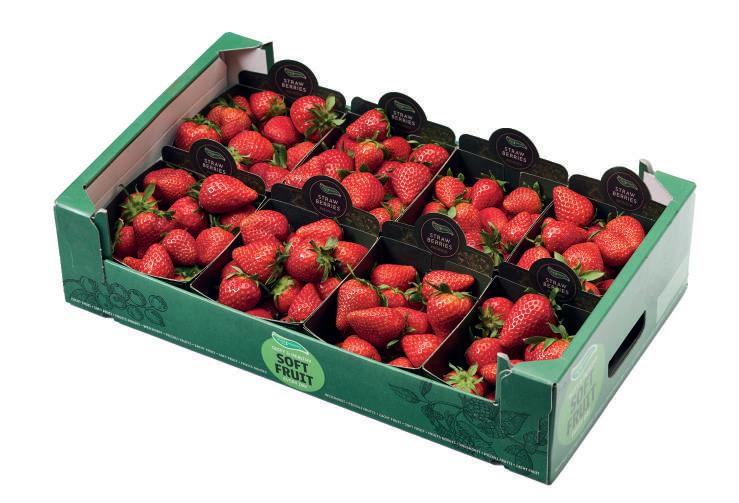

Machinery takes centre stage in Berlin
Fruit Logistica is the place to see the latest and greatest from across the fresh produce supply chain, and Ilapak has the machinery section well covered.
by Carl Collen @carlfruitnetGlobal packaging machinery specialist
IMA-Ilapak is focusing on innovation and diversification as it looks ahead to 2024, essential characteristics that have been the cornerstone of its growth. The group, which designs, manufactures and markets a variety of machines for the fresh produce business, will continue to develop packaging solutions and enhance technological and sustainability aspects, according to marketing and communications manager Christian Romualdi.
“The main hope is to continue to grow according to the essential characteristics that have given us credibility in our markets: our ability to innovate and our ability to diversify,” says Romualdi.
“Opportunities and challenges are sides of the same coin and for us it means that we will continue our commitment to research and innovation, increasing intelligent machine and production line investments and providing the market with turnkey packaging solutions – from handling, weighing, or counting products to primary, secondary and end of line packaging – capable of running new, sustainable wrapping materials,” he explains.
Ilapak has in recent months launched several new products including vertical baggers, horizontal flow wrapping machines, linear and multihead weighers, while it has also
launched new digital services to increase packaging machinery performance and optimisation. The group has invested heavily in research and innovation with the aim of enhancing its intelligent packaging technologies, Romualdi notes, and while the market has been challenging at times Ilapak continues to flourish.
“We experienced a period of slight decline at the end of the year, but it was a completely normal trend,” he confirms.
“Now, we are on track with our business plans and we are seeing good growth in some food market segments.”
With Fruit Logistica coming up this month, Ilapak is using the event to showcase a range of its products at its stand, with staff on hand to illustrate the technical aspects and key benefits of the company’s offering.
These include the Scorpion TS RS inverted flow wrapping machine, which has rotary jaws to provide maximum flexibility and is capable of processing different bag lengths for products that have irregular shapes and size; The Vegatronic 2000 ML vertical packaging line for leafy products, an intermittent vertical bagger combined with WA Pro 12-50 multihead weigher; and Ilapak’s V-Series linear weighers, the newly designed high-speed linear weighing machine tailored for onions, potatoes, Brussels sprouts and similar dry produce. E


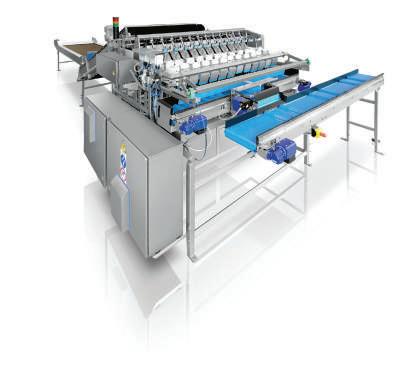
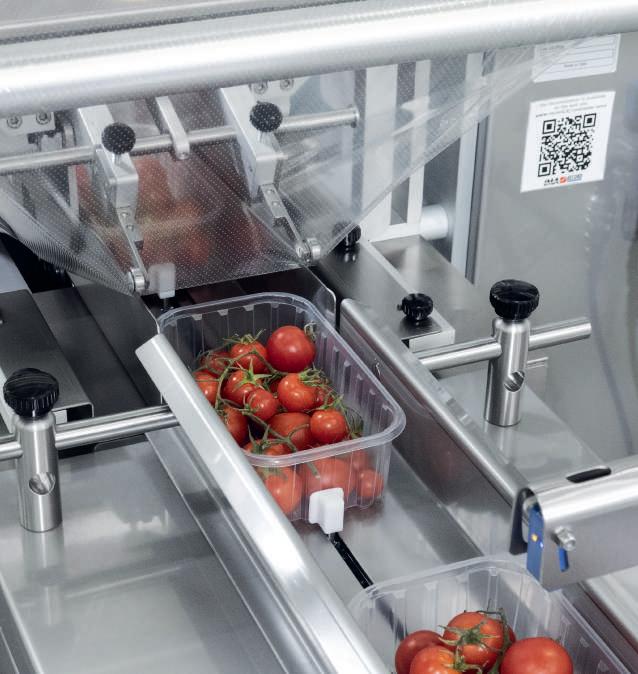
PACKAGING SOLUTIONS TO FRESHEN UP THE PRODUCE INDUSTRY.
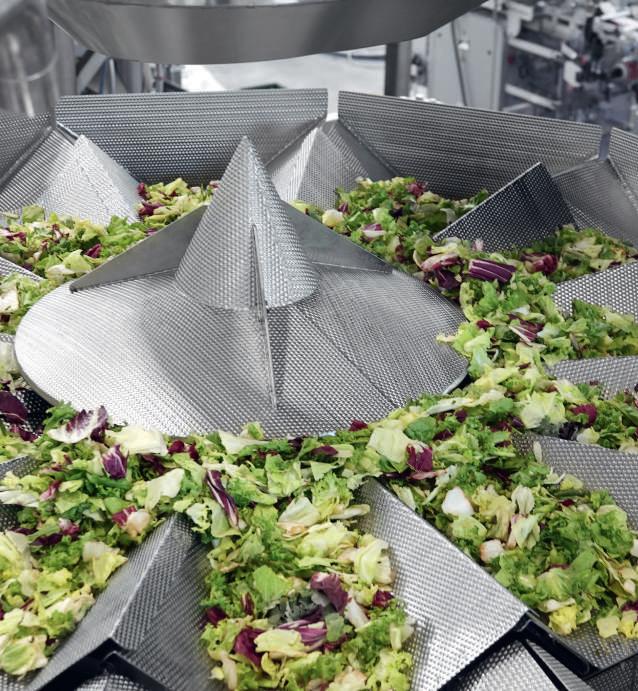
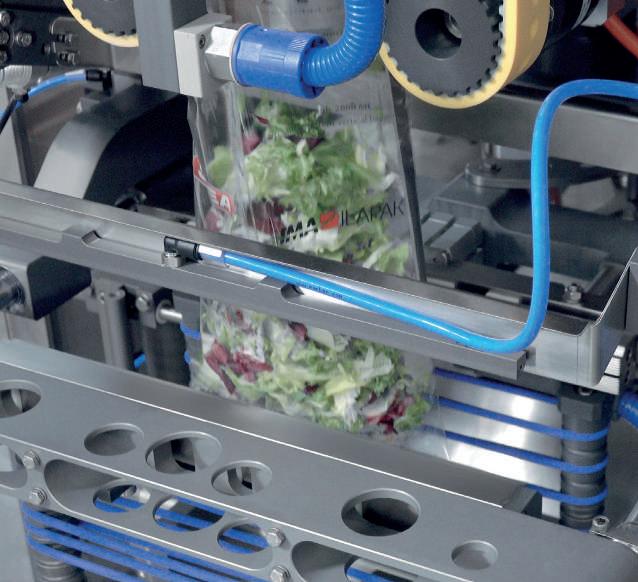

IMA FLX HUB’S TECHNOLOGIES AND TURNKEY LINES
A complete range of weighing, counting, vertical bagging and flow wrapping solutions will be showcased at the Berlin fruit and vegetable fair.
On show, an IMA Ilapak vertical packaging line for cut salad and a linear weigher for fresh produce, and an IMA Record horizontal inverted flow wrapper for irregular produce products.
Packaging point of view
Roberto Zanichelli, business development and marketing director at Ilip, offers his insights into the changing dynamics of the fresh produce packaging business.
by Carl Collen @carlfruitnetWhat are your main hopes heading into 2024?
Roberto Zanichelli: The sector during the last two years has certainly had issues due to the rising energy and raw materials costs as well as inflation, which led to increasing prices for fresh produce and a reduction in consumer spending and consumption. For 2024 we are aiming for more stability in costs and hope for an easing of the inflationary trend so that we can better plan our strategies and investments.
On the other hand, these are challenged by the revision of EU legislation on packaging and packaging waste that will deeply affect our business and, paradoxically, will undermine the opportunities around the sustainability of our trays and punnets made with recycled PET in a tray-to-tray closed loop system.
What has Ilip been focusing on?
RZ: We keep pursuing our sustainability strategy for our packaging because the interest of retailers, packers and consumers in this topic remains high, especially when it comes to the origin and end-of-life of the product they buy. Therefore, we are strengthening our production capacity for trayto-tray R-PET in a closed loop system, which is part of our threepillar policy on environmental sustainability, the 3Rs: reduction of raw material use and food waste; recycling of plastic packaging in a closed loop in line with the circular economy concept; and renewable resources such as bioplastics.
When it comes to new product development, we always keep sustainability and eco-design in mind. At Fruit Logistica we will showcase the Airwave, our padless heat-sealable punnet based on our B40s range, which has been designed to pack and protect soft


and fragile produce without the need to have a shock absorber pad.
How strong is the market for your packaging products right now?
RZ: As you know the fresh produce business can be affected by climate and crop yield. In the last couple of years, we experienced some discontinuities to our usual supply volumes, mainly in southern Europe, that have been mitigated by new opportunities that we caught on the market and by the fact that we serve over 50 markets worldwide in both hemispheres.
However, we can confirm that current and modern supply and value chains, from field to packer and from distributor and retailer to consumer house, need and prefer pre-packed fruit & vegetables to be more effective and efficient, with reduce wastage, whilst improving sustainability, profitability and consumers’ convenience and satisfaction.
On the other hand, we also acknowledge that the packaging market for fresh produce in Europe is in a state of transition as it adapts to changing consumer preferences and, above all, regulatory requirements that can have a deep impact.
We have seen rising costs and global economic turbulence in recent times. How have you adapted?
RZ: Since the post-Covid supply chain shock, we have adopted several strategies to cope with this situation whilst maintaining a certain flexibility in order to
adapt to market changes. Firstly, we intensified our efforts to reduce costs wherever possible, through a series of initiatives that covered both production and operating costs. Secondly, we had to reduce the gap between cost increases and sale prices, so we gradually increased sale prices when needed. In addition, we tried to increase our revenue sources by differentiating our business proposition into new markets and products with higher added value. Finally, we invested in innovative technologies and digital solutions to improve operational efficiency and reduce long-term costs.
What are you showcasing at Fruit Logistica in Berlin?
RZ: Besides the B40 padless range we will showcase the new product developments of our Sprint

department, specialised in the design of customised products with a short time to market as well as our ‘ezy:split’ punnet, the first hybrid punnet made of recycled PET and cardboard for premium fruit packaging. The cardboard support, which guarantees excellent stability, enables the weight reduction of the
plastic component by 45 per cent and offers excellent branding and communication possibilities thanks to the printing areas on both sides. E




















Özler Ziraat nears full production of walnuts
Originally earmarked to grow stonefruit, land in Romania belonging to Turkish producer Özler Ziraat has now been transformed into a major centre for walnut production.
by Tom Joyce @tomfruitnet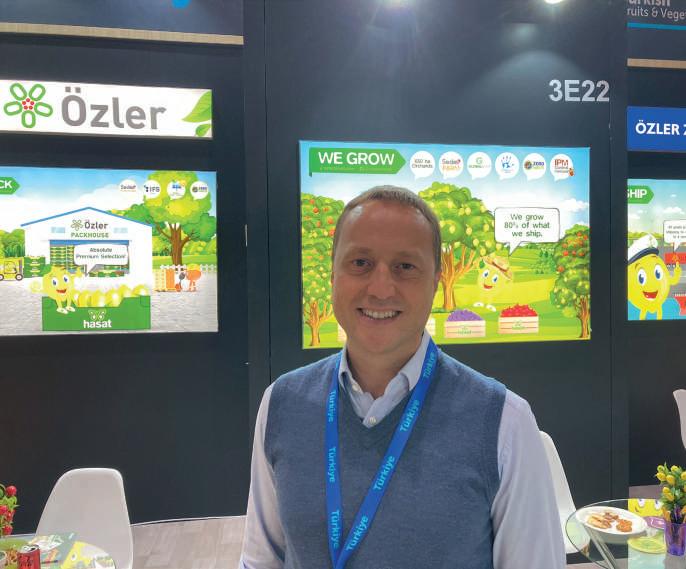
Around 20 years ago, Turkish producer Özler Ziraat was initially eyeing land in Romania for the purpose of producing stonefruit. However, unforeseen challenges encouraged the company to amend its plans, eventually deciding on the production of walnuts instead, Özler Ziraat’s first foray into nuts.
“We bought the land just before Romania entered the EU,” says the company’s Mehmet Özler. “We thought we could do stonefruit there and close the gap between the end of the citrus season in Turkey and the start of the next one. But stonefruit is very labour-intensive, and then a er
integration into the EU a lot of Romanians le to work in other European countries. So we decided to go into something that was more mechanised and less labourintensive.”
Availability of workers is an issue almost everywhere, says Özler, even in Turkey. “If it weren’t for the refugees that came in to the country from Syria, the fruit industry would be in huge trouble,” he says. “Right now most of the harvest workers are Syrian. They are not skilled so they need to be trained. A er the earthquake in Turkey, a lot of labour has been absorbed into the reconstruction effort.”
AIGN welcomes Turkey’s Potamia as new member
The management and membership of the Associated International Group of Nurseries (AIGN) have announced the induction of new member Potamia Fruit Breeding R&D of Eskisehir, Turkey, a partnership between Dr Yasemin Evrenosoğlu and the SS Ödemis Bademli Nursery and Agricultural Cooperative.
“Their research is focused on the development of rootstocks and new fruit varieties with superior characteristics,” a press release stated. “With the addition of Potamia, AIGN is now twelve members strong, holding a global presence throughout the major tree-fruit growing regions.”
Potamia Fruit Breeding R&D will be represented on AIGN’s board of directors by Dr Yasemin Evrenosoğlu, a professor at Eskisehir Osmangazi University and general manager of Potamia.
Evrenosoğlu’s team is presently involved in two national projects, crossbreeding late-ripening Japanese plums and identifying commercial pear varieties that are resistant to fireblight and pear psylla.
Dr Gavin Porter, CEO of AIGN, welcomed its newest member. “The opportunity to work with this prestigious company in the territory of Turkey provides AIGN and Potamia with extended commercial opportunities neither has had before,” he said, “further helping fruit growers produce the latest proprietary fruit varieties for consumers and continuing global business competitiveness.”
According to Özler, the first walnuts from the company’s Romanian orchards are now available. “This is going to be a major operation,” he says. “We started acquiring the land back in 2003 and 2004. We experimented a li le, but about six years ago, we started planting walnuts. We have about 200ha. This year we are close to full production.” E




@sanlucarfruit
Taste the SUN
First choice in terms of taste: SanLucar is number 1 among consumers.
Compared to other fruits, our more than 100 diff erent fruit and vegetable varieties taste the best to consumers. This is because of sustainable master cultivation in the most fertile regions of the world, exclusive varieties, as well as fruit experts who ensure

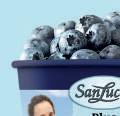

a visually striking presence at the point of sale, making our brand truly unique. In 2023, we were awarded the “Goldener Zuckerhut”, the “Oscar” of the German food industry. It’s no wonder that 96% of shoppers put their trust in us. Visit us at Fruit Logistica.





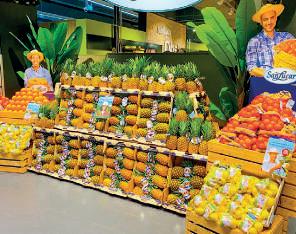
More expansion on the cards for Sekoya
Hans Liekens outlines the blueberry platform’s progress last year and looks ahead to what’s in store for 2024.
by Maura Maxwell @maurafruitnetBlueberry sales from the Sekoya network continued to gain momentum last year and with a new variety to showcase at this month’s Fruit Logistica, expectations are running high that 2024 will be another year of growth. Production volume doubled in 2023 and is on course to double again over the next 12 months according to value chain and retail manager Hans Liekens.
“For Sekoya, the world became a village. We were present at all major trade fairs on every continent, and we no longer have to explain the Sekoya concept,” he tells Eurofruit
Between them, Sekoya’s 14 members have production in 30 countries and the varieties are sold in all markets
Fruit Logistica will be yet another opportunity for the platform to highlight its 52-week supply and tell customers about the latest addition to its portfolio, the mid-high chill variety Sekoya Fiesta (FC13-113).
“Sekoya Fiesta is a late-season variety that grows in all traditional high-chill countries and consumer markets, so this allows growers
to extend local production with premium fruit,” Liekens explains, adding that “the unique thing about Sekoya is our combination of mid-high chill varieties and zerolow chill varieties, which makes the quality switch between countries and regions much smoother”.
Today Sekoya’s 14 members have production in 30 countries and its varieties are sold in all major markets. As membership is expected to remain fairly stable, the platform’s growth will come either through current members increasing their acreage or through merger and acquisition activity.
Asked about the likelihood of Sekoya expanding into new geographies, Liekens says: “Our members are always looking into new growing areas to produce better, earlier, later or closer to the consumer market, so new countries like Zimbabwe, India, Colombia and Brazil might in future become production areas for them”.
He says he has been particularly thrilled with the uptake of Sekoya varieties in Asia. “ For me personally, last year’s Asia Fruit Logistica was a ‘wow’ moment – we had so many retail visitors at the stand,” he notes.
“Buyers in China are very familiar with Sekoya; they are amongst the highest priced varieties in the market because people recognise their value. Sekoya varieties are very large in
size, very firm, have great taste and a very long shelflife. Our visitors told us that Sekoya berries could have been designed specifically for the Asian market.”
Meanwhile, Sekoya has made important progress with its consumer brand, Livie, now a year old. The quality assurance logo acts as a guarantee to consumers and retailers that the fruit sold under the brand meets pre-defined quality parameters covering flavour, size and firmness. “We launched the brand in response to research showing that consumers will stop buying blueberries for 6-10 weeks if they were disappointed with their last purchase,” says Liekens.
Sekoya has since implemented a quality control system from field to fork which is currently being tested with German retailer Rewe South West.
“We learned a lot during this test and once it is completed we will decide where and how we will expand,” Liekens says. “We want to build up slowly in order not to kill the concept before it was born. We take our time to choose supermarkets who have a simple supply chain (preferable direct sales) in order to minimise quality loss.” E
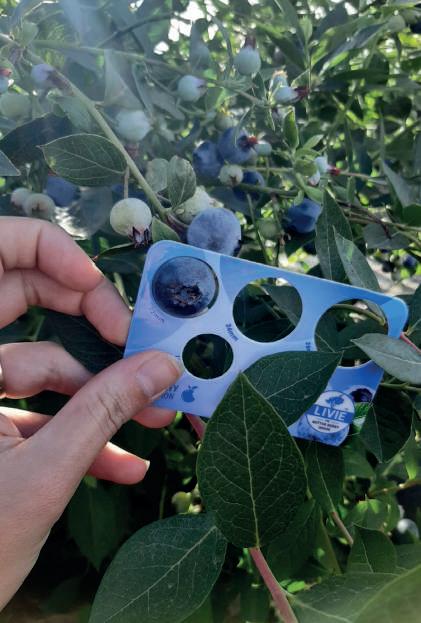




Where next for China’s thriving blueberry industry
Michael Oates and Huang Zhang share their insights on the future evolution of fresh blueberry cultivation in China.
by Colin Fain
The Chinese blueberry industry has been on a remarkable growth trajectory, defying conventional market trends and economic conditions. Michael Oates, managing director of Haygrove China, says the sector has been expanding at an “astounding” rate, despite China’s economic slowdown, with a demand increase of approximately 40 per cent yearon-year over the past five years – a stark contrast to the modest growth of many other major categories which have seen around 3-5 per cent year on year growth.
According to Huan Zhang, founder of Twinkle Star Berry, “the marketing efforts of companies like Driscoll’s and Joyvio have played a crucial role in boosting demand by educating Chinese consumers about the taste and health benefits of blueberries”. With more international players and breeding companies entering the Chinese blueberry market, he expects that further innovations and improvements will continue to drive growth.
Several key factors have driven this blueberry boom, including the emergence of major players like NPS, whose planted area has gone from zero in November 2020 to around 1,300ha within three years, New acreage and substantial capital investments have also played an important role.
“We’ve seen a scramble to plant blueberries, especially Southern HighBush varieties, for counterseasonal cropping in the January to May window, basically anywhere people can,” Oates says. “But it’s an immature market and even if you are not an especially good grower and not equipped with particularly special – or in fact legal –varieties, the opportunity to achieve outsized profit compared to various other fresh produce categories is high. For example, you have people who have typically invested in tech or real estate, who effectively have seen a spreadsheet that says their return for substrate blueberries is higher than, let’s say, real estate. And so they’ve parked liquidity there.”
To address growing concerns about oversupply and economic uncertainty in mainland China, key distributors like Driscoll’s and Joyvio have begun
exporting. Driscoll’s has started shipping blueberries and raspberries to Southeast Asia, while Joyvio has utilised its regional supply chain to export products from its joint venture with Hortifrut. These export programmes serve as a hedge strategy to maintain premium pricing and explore new markets while addressing fears of oversupply in the Chinese market.
Zhang notes: “One noteworthy trend is the increase in fresh blueberry exports to Southeast Asian markets. This development is linked to the growing demand for Chinese blueberries and the need to explore new markets beyond the domestic sphere. Peruvian blueberries make their debut in July, extending through January. During the summer, the Chinese market typically lacks high-quality blueberries. Peruvian blueberries become available in China around July or August, constituting a substantial portion of the imports.
“In addition to sourcing from Chile, China imports a limited
Chinese exports of fresh blueberries by market (conventional)
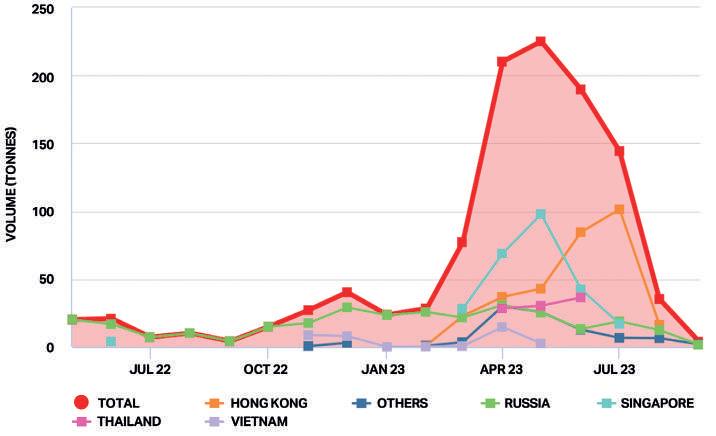





airfreighted volume in the summer from the US, particularly from Washington and Oregon. This positions China as one of the largest importers of blueberries on the global stage.”
Despite its rapid growth, the Chinese blueberry industry faces several challenges. These include land zoning policies that prioritise staple crops over economically valuable ones, intellectual property theft leading to illegal propagation, climate change impacting crop management, and rising labour costs with limited incentive to invest in labour-saving capital and a longer payback period due to inability to own land.
“As home to 15 per cent of the world’s population but only 7 per cent of its arable land, China has prioritised food security over cash crops. A policy enacted since January 2020 restricts land usage, primarily reserving it for staple crops. This limitation has caused the cost of developing farms, including land compensation and extensive civil engineering work, to surge by 30-70 per cent,” says Oates.
In the fresh blueberry market, the dominant producing regions are primarily in Yunnan, Sichuan, and Guizhou, with Yunnan standing out due to its ability to produce counterseasonal blueberries. There is also some presence in northern regions like Anhui and Shandong, although the quality from these regions is not as high, making them less suitable for the premium fresh market.
“Yunnan stands out as a focal point for blueberry cultivation, thanks to its ideal climate for producing low-chill and no-chill blueberries. This region is especially significant because it can supply blueberries during China’s winter months when domestic production is limited, coinciding with the Chinese New Year,” says Zhang.
China’s blueberry market is more fragmented than other markets, with an abundance of branding
and packaging to differentiate products. Plus, there is no incentive for retailers to work with licensed legal growers, fostering illegal propagation and non-compliance with industry regulations.
It seems clear that the industry is poised for further growth and international collaboration. As it matures, players will have to adapt to navigate this changing landscape effectively. Zhang sees this as an opportunity to connect international and domestic companies and facilitate knowledge
sharing for the benefit of the entire industry. Oates anticipates increased competition and tighter profit margins, causing less efficient or skilled growers to exit.
The industry may also witness high-profile failures among companies that over-leverage themselves. Entry costs are rising, and returns are falling, prompting growers to contemplate increased capital investment to reduce labour reliance. China also faces a unique challenge due to the inability to own land, which necessitates a delicate balance between capital investment and labour dependence. Players will need to navigate these challenges effectively to continue reaping the rewards of the blueberry boom in China. As the industry matures, China is poised to remain a powerhouse in the global blueberry market. E
Price of Chinese fresh blueberry exports (conventional)

Source: Agronometrics Global Trade Data
China’s fresh blueberry import volume by country (conventional)
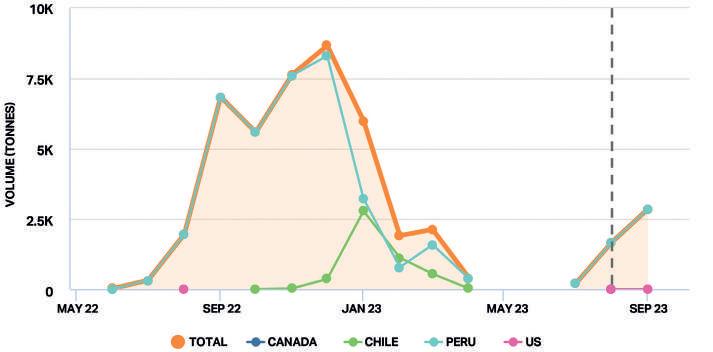
Source: Agronometrics Global Trade Data



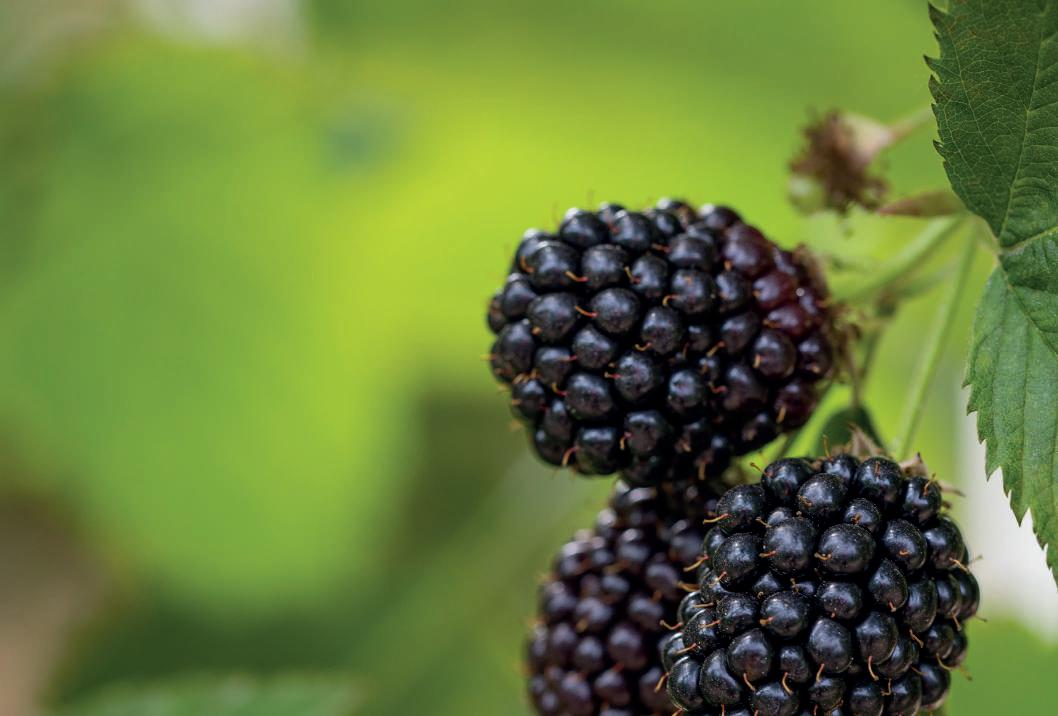


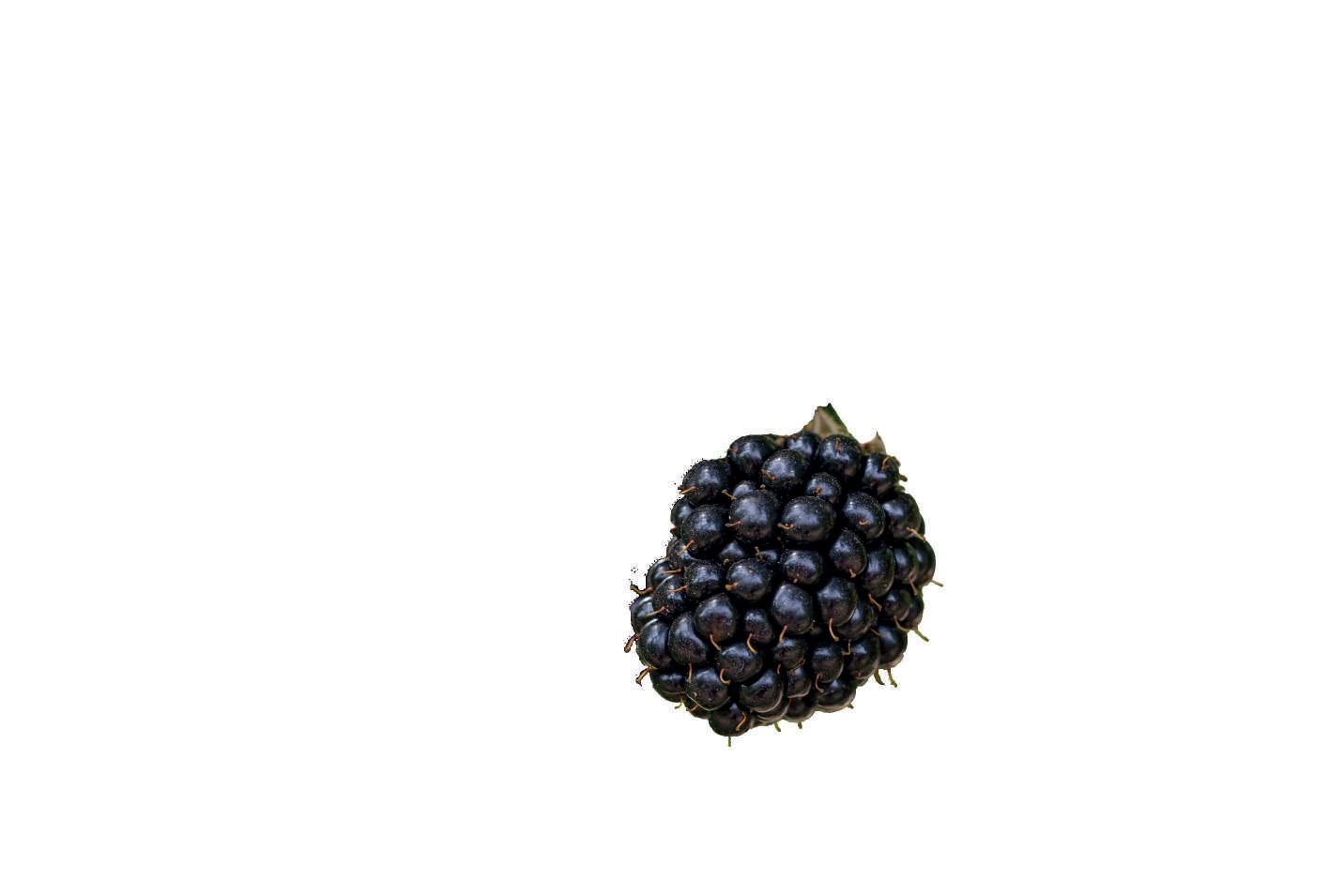




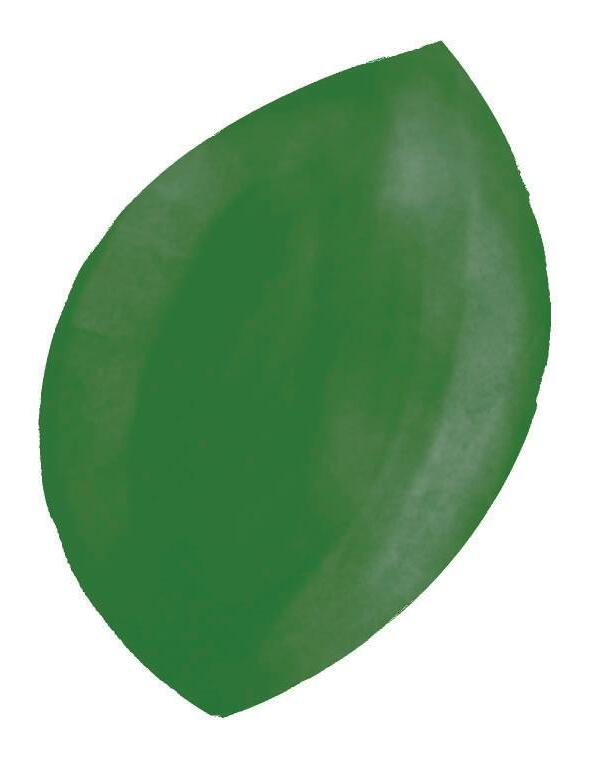

Birthday berries for BerryWorld
As it prepares to mark its 30th anniversary at Fruit Logistica in Berlin, the soft fruit supplier enters its fourth decade with four new varieties.
by Mike Knowles @mikefruitnetBerryWorld Group has marked its 30th anniversary with the introduction of new and improved raspberry, blueberry and strawberry varieties to its portfolio.
The move represents the first additions to its variety mix since Chilean supplier Agroberries purchased a minority shareholding in the company in June last year.
Founded in 1994, UK-based BerryWorld has become an international market leader in the so fruit category. With access to award-winning proprietary and exclusive genetics, stateof-the-art growing and packing operations, and three decades of category management expertise in developing consumer markets, the business says it is well placed for continued growth in 2024.
The four new varieties have apparently been positively received by retailers and growers alike during commercial testing.
BerryWorld Ruby, selected from the BerryWorld Plus programme for its picking speed and early, highclass one yield, will be available this year. It is expected to enhance the group’s premium raspberry offer with great flavour and uniformly glossy berries.

Trial volumes of BerryWorld Orb, also from the same development programme and billed as a “pioneer” blueberry, will be released in 2024. “BerryWorld Orb is a welcome addition to our northern highbush varietal offer that has been some years in development,” explains Samuel Rowe, CEO of BerryWorld Varieties. “The fruit is flavourful, the berries have good crunch and great shelf-life, and we eagerly anticipate moving into commercial volumes in 2025.”
At the same time, a new strawberry from the Beekers breeding programme will be sold under the BeeHonest trademark. This promising June-bearer offers firm texture and a natural sweetness. “BeeHonest has performed well on taste and texture,” says experienced grower Wil Beekers, also BerryWorld Group’s European CEO, who established the programme as a joint venture with expert Dutch breeder Hans de Jongh over a decade ago. “We are excited to bring larger volumes to European consumers this summer.”
Later this year, BerryWorld will also add Eves Joy, an exclusive strawberry variety from another breeder, Edward Vinson. “This glossy, vibrant berry was selected for its consistent size and flavour throughout the
extended domestic strawberry season and enhances our superior strawberry range,” explains Adam Olins, CEO of BerryWorld Group.
“We have worked with the Edward Vinson team since inception and are delighted by the continued evolution of award-winning strawberry genetics and successful blueberry, raspberry and blackberry developments through our shared breeding programme BerryWorld Plus.”
Further afield, the group’s breeding partners have other “very promising” new blueberries on the way, Olins says. “Mountain Blue’s Masena, Eureka Gold, and Eureka Dawn all offer a premium eating experience and will continue to underpin our ability to grow the top-tier blueberry offer around the world, he adds. E














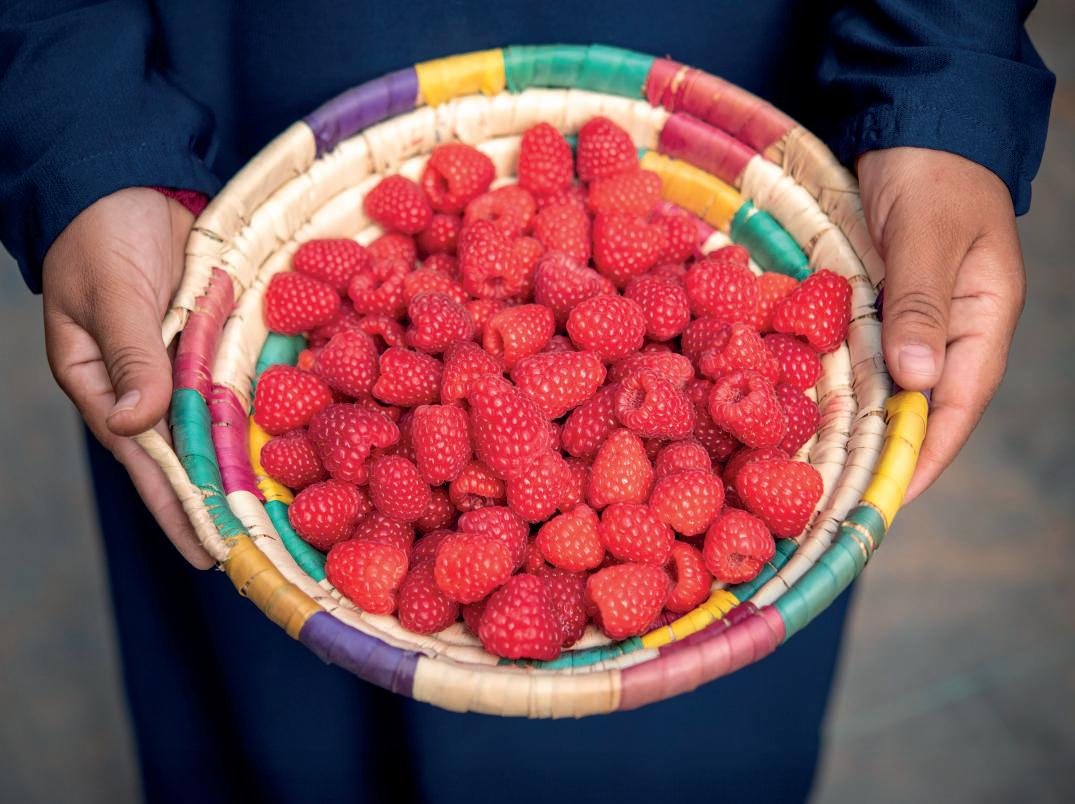
Nadorco producers commit to enhancing brand image
Despite the continuing challenge of drought in the Mediterranean region, sustained market demand for the Nadorcott mandarin bodes well for the 2024 campaign, according to the Association of Nadorcott Producers in Morocco (APNM) and Nadorcott Protection (NCP).
by Tom Joyce @tomfruitnetThe Moroccan Nadorcott has become well known around the world. What further growth potential do you envision?
APNM: Morocco expects to market a tonnage exceeding 250,000 tonnes, with approximately 10 per cent coming from newly producing plantations this season. The Association of Nadorco Producers in Morocco (APNM) continues to promote Nadorco in Morocco through its quality label, Nadorine Naturally Low Seed, and all producers are commi ed to taking actions to enhance the brand image of this truly Moroccan variety.
Which export markets appear most promising? Are there specific markets you are targeting this year?
APNM: The development programme, supervised by the APNM Board, positions Morocco at the forefront of Nadorco exploitation in terms of area, production volume and exports (approaching 300,000 tonnes), surpassing other origins for the last two seasons.
Can you discuss the impact of drought on current citrus production in terms of volume and quality?
APNM: Like many countries in the Mediterranean basin, Morocco is experiencing the effects of water scarcity due to low precipitation in recent years. However, citrusproducing areas are still able to maintain adequate production levels, although growth in the production area in Morocco is becoming less significant.
The dispute between Nadorco and Tango persists –what chance of a resolution following UPOV's decision on essentially derived varieties (EDV)?
NCP: Nadorco ’s rights holders are determined more than ever to defend their rights before all courts. The new UPOV Guidelines strengthen the position of Nadorco rights holders regarding the concept of EDV. Nadorco Protection (NCP) has always maintained that Tango is a Nadorco EDV. An Essentially Derived Variety requires authorisation from the rights holders of the first variety for its exploitation.
What other challenges are you facing? Is labour availability an issue?
APNM: The greatest challenge is the growing deficit in water resources, consistent with other Mediterranean countries. We are engaged in all actions contributing to environmental preservation. Labour availability, both in quantity and quality, is not perceived as a problem for Nadorco exploitation.
Are you optimistic for the year ahead for Nadorco ?
APNM: Considering Nadorco 's production performance and sustained market demand, we anticipate a positive Nadorco season. The Moroccan Nadorco stands out for its late availability on the shelves, with production extending from January to the end of April, allowing it to be marketed later than other mandarin varieties. E
BELOW—Morocco expects to market more than 250,000 tonnes of Nadorco this season


Come to visit us on Hall 4.1 / Stand C-10
Moroccan tomatoes recovering a er record heat
Moroccan tomato growers have recovered well from last summer’s brutal heatwave, but ToBRFV issues in Spain mean an impact on European tomato supplies remains possible.
by Tom Joyce @tomfruitnet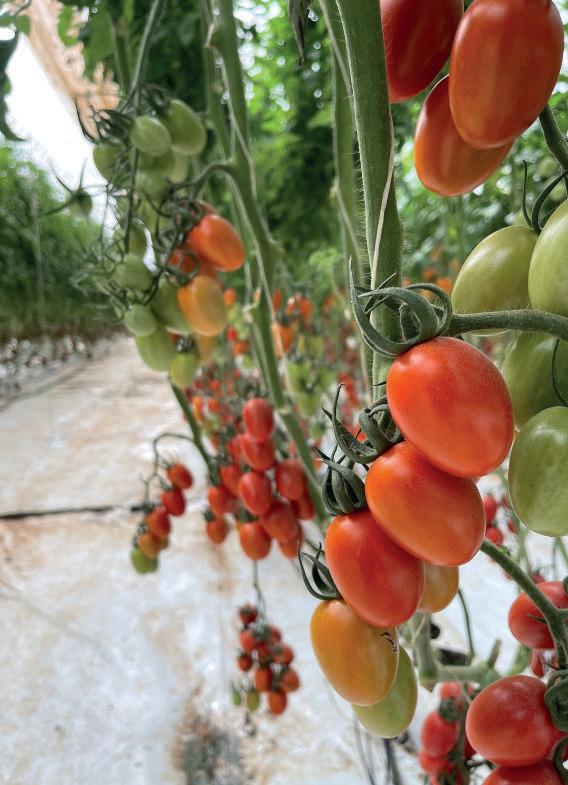
The impact of last summer’s heatwave in Morocco may still be felt by European consumers as the year progresses due to its impact on crops including tomatoes, peppers and cucumbers. Many plants were unable to withstand the intense heat,
especially in the important fruit and vegetable growing region of Souss-Massa, where temperatures reached an all-time national record of 50.4C in mid-August.
The reliance on Morocco to make up for shortfalls in Spanish tomatoes in recent years has
contributed to empty shelves in places like the UK. With Spanish volumes again down, some foresee a repeat. In November, Murcia Today reported that around 40 per cent of that Spanish region’s tomato crop had been decimated by ToBRFV.
The Energy & Climate Intelligence Unit (ECIU) warned that such high temperatures were threatening UK food imports from the Mediterranean. Just over a quarter of Britain’s food imports came from the Mediterranean region in 2022, it stated, with Spain alone representing 7 per cent.
“The events that took place last summer in Morocco are not trivial,” cautions Fatiha Charrat, deputy general director of Morocco’s Delassus. “The plantations were already facing a significant impact due to ToBRFV when numerous heatwaves affected the region.”
By the end of July last year, she says, growers had managed to replant up to 30 per cent of the area that was affected by the virus, shortening the winter cycle of production and creating a gap. This replanting would already mean a delay in availability, but then the unprecedented heat arrived.
“In August, we experienced temperatures of over 50C for an extended period, resulting in the burning of all the young plants,” says Charrat. “Inside the
“The plantations were already facing a significant impact due to ToBRFV when numerous heatwaves affected the region”
greenhouses, temperatures went up to 70C. The young plantings of July were burned and again needed to be replanted, not to mention all the plants that lost many bunches of tomatoes.”
According to Charrat, the new replanted tomatoes only entered into production in mid-December, meaning that from September until December Morocco was unable to supply the volumes of tomatoes anticipated. However, the worst at least could be over.
“The situation is ge ing back to normal,” she says, “and all our growers are now able to cover their orders.” E
7th-8th
XII International Blueberry Conference
,
Use knowledge of market leaders to your advantage
p art i
p art ii
7th March (9.00 a.m. - 6.30 p.m.)
Protection of blueberry plantations against diseases – current recommendations
– Dr Monika Kałużna, Institute of Horticulture, Skierniewice / Poland
Is it worth investing? Production profitability analysis, based on own experience
Mirosław Garliński, blueberry plantation in Doleck / Poland
Practically about fertigation. It’s not that difficult – Michał Wojcieszek, Yara Poland
Management techniques to optimize soil pH and nutrient availability in organic plantings
– Dr David R. Bryla Research Horticulturist, United States Department of Agriculture / USA
Why 10 tons? Production profitability for various plantation models (introduction to the debate)
– Dr Dariusz Paszko, University of Life Sciences, Lublin / Poland
Debate – 10 tons per hectare is no longer enough
Conducting a debate – Dominika Kozarzewska, Polish Berry Cooperative/Berry Core Team, Poland
Participants: Leon Schrijnwerkers / Netherlands, Andrzej Trela / Poland, Krzysztof Żabówka / Poland
Are innovations needed? Novelties included in the Blueberry Factory project – Dr Paweł Krawiec, Horti Team / Poland
Climate change challenges in horticulture – Anna Sierpińska, Climate science / Poland
The evolution of blueberry protection in response to growing market requirements – Krzysztof Krupa, Syngenta / Poland
Strategies for mitigating heat damage in blueberry fruit
– Dr David R. Bryla Research Horticulturist, United States Department of Agriculture/USA
p art iii
Optimal use of pollinating insects – Przemysław Kapka / Poland
Changes on the variety market. Why are they needed? – Teun Leenders, Fall Creek Farm / Netherlands
What decisions can we make today to ensure that the Polish blueberry industry will be thriving in 2030?
– Dominika Kozarzewska, Core Team / Polskie Jagody & Mariusz Podymniak, Core Team / Jagodnik / Poland
UNIQ systems for the internal quality selection of your blueberries. Taste sorting as never before – Laura Vignoli, Unitec s.p.a. / Italy
How to effectively recruit workers for plantations. Is only money important? – Wiesław Brzozowy, Fieldstone / Poland
Maintaining the quality of blueberries after harvest and the possibility of long-term storage
– Dr Bruno Defilippi Bruzzone, Centro Regional de Investigación INIA La Platina / Chile
Gala dinner – Mazurkas Hotel
8th March (10.00 a.m. - 3.00 p.m.)
Outdoor meeting at a blueberry plantation in Doleck – Anna Kowalska and Mirosław Garliński
Visiting a 20-hectare blueberry plantation
Pruning demonstrations – group 1. – Leon Schrijnwerkers, Schrijnwerkers Plants / Netherlands
Pruning demonstrations – group 2. – Marcin Wereszczuk, Fall Creek / Poland
Machine shows
Replacing plants with different varieties – demonstration of technology for clearing old plantings and preparing the site for new blueberries (removing bushes, loosening the soil, organic fertilization, forming beds and covering them with agrotextile, planting new seedlings)
Refreshments – a hot meal
Lectures will be simultaneously translated in Polish / English / Polish
North Carolina targets EU
The US state’s Sweetpotato Commission has initiated research to understand opportunities in its key European export markets
by Carl Collen @carlfruitnetThe North Carolina Sweetpotato Commission (NCSPC) has announced that it has conducted a large-scale research campaign across its key European markets. The research, conducted by TRKR, highlighted why consumers bought sweet potatoes, how they were used and any barriers they may face at point of purchase.
According to NCSPC, the information collected will provide insights into key drivers for purchase and consumer a itudes, enabling it to tailor its approach for each market.
North Carolina remains the largest producer of sweet potatoes in the US, producing over 60 per cent of the total volume grown in the country.
NCSPC initiated the research following its 2023 harvest to understand opportunities in its key EU export markets, with the Commission noting that it would use the data to confirm consumer usage and reinforce demand in each country.
KEY TAKEAWAYS
One of the key takeaways from the research shows that 55 per cent of sweet potato shoppers in the UK choose it as a healthier alternative to white potatoes. The cost-of-

living crisis has not negatively impacted shopping behaviour, with 24 per cent across the UK buying more sweet potatoes compared to previous years.
Sweet potato sales in the UK are worth £71m and growing at 8.6 per cent, €79m in France and €63m in Germany, the research found. The percentage of households buying sweet potatoes also varies from 42 per cent in the UK to 34 per cent in France and 22 per cent in Germany.
NCSPC notes that there is “significant headroom” to grow shopper numbers across all three of those key European markets, and that these insights will help exporters position produce accordingly to meet the needs of importers within key areas of Europe.
ESSENTIAL RESEARCH
“In-depth research into our industry is essential to help stabilise and grow sales for our producers and farmers,” says NCSPC executive director, Michelle Grainger, “to deliver the highest quality sweet potatoes in the market, including the highly prized Covington variety, which was developed in North Carolina by the research department at NC State University.

“NCSPC will also be working closely with buyers to establish promotional programmes that support strong sales and pricing initiatives that drive consumer value and preserve profitability for producers and buyers.”
The Commission, along with the state’s sweet potato growers and shippers, continue to support education and consumption efforts throughout Europe and in global markets.
”The North Carolina Sweet Potato Commission is commi ed to supporting its growers and increasing sweet potato consumption through education, promotional activities, research, and honourable horticultural practices among its producers, helping to preserve this much-loved and established industry within North Carolina,” it says. E
Capital Agro sees growing sustainability trend
Mohamed Wafaey, managing director and deputy chairman of Capital Agro, leading Egyptian exporter of citrus and other fruits, talks about the growing importance of sustainability for the company.
by Tom Joyce @tomfruitnetAs demand for Egyptian citrus continues to grow from Europe, how important is it to provide the best quality to your customers?
Mohamed Wafaey: Our aim is to provide customers with the freshest and most flavourful fruits while supporting the growth of the agricultural sector in our region. We have invested in state-of-theart storage and cooling facilities that are equipped with the latest technologies to preserve the fruits’ freshness. Additionally, we have a dedicated team of experts who closely monitor every step of the export process to ensure that the fruits are handled and transported under optimal conditions.
The citrus and fruit industries have seen notable advancements in both products and technology. We have introduced new varieties of citrus that offer unique flavours and characteristics, appealing to the evolving tastes of consumers. Technology also plays a crucial role in enhancing our operations. We have implemented advanced packaging techniques that ensure optimal freshness and extended shelf-life. Furthermore, precision agriculture and data-driven farming practices are enabling us to optimise crop yields and minimise environmental impact.
So sustainability is increasingly becoming a priority?
MW: Sustainability and environmental responsibility are integral parts of our business philosophy. We actively promote sustainable farming practices among our partner farmers, encouraging the use of organic fertilisers and environmentally friendly pest control methods. Moreover, we constantly strive to minimise our carbon footprint by optimising transportation routes and exploring eco-friendly packaging options. We are observing a growing demand for organic and

P.D.O. Mela

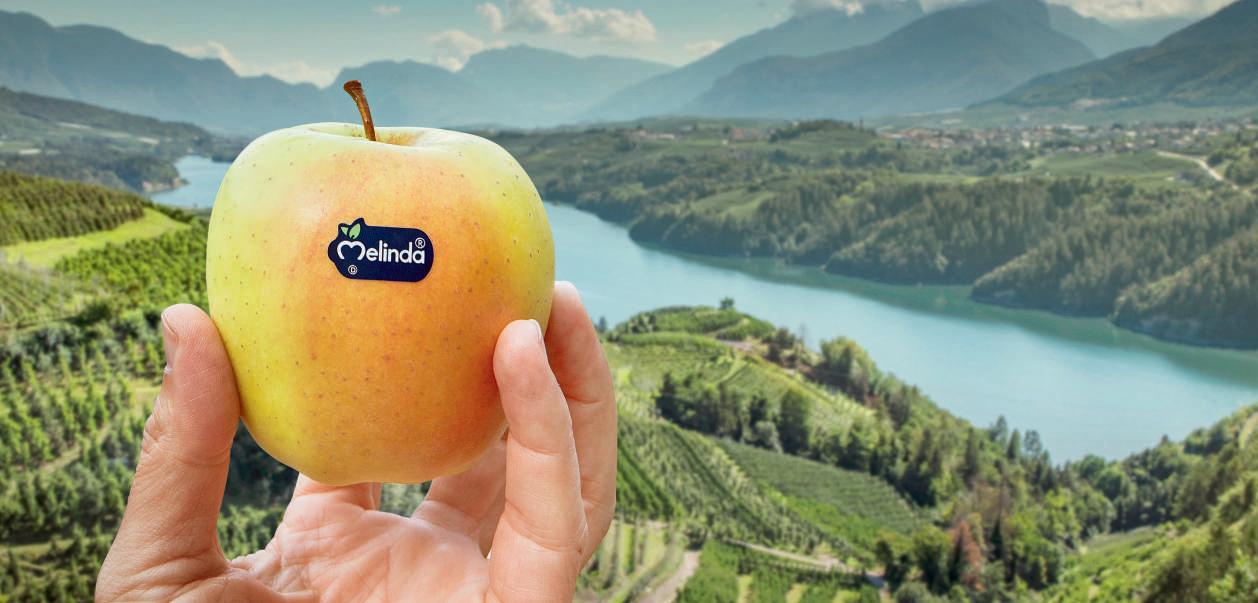
LOVED BY YOU


HaciendasBio completes financial restructuring and names Teo Barredo as new CEO
Oquendo Capital becomes the majority shareholder through a capital increase as company enters the next phase of its strategic growth plan.
by Maura Maxwell @maurafruitnetSpanish organics specialist HaciendasBio has announced the successful completion of its financial restructuring and appointment of Teo Barredo as its new CEO.
Oquendo Capital has increased its stake in the company and becomes the majority shareholder, while a debt restructuring gives it the financial stability to carry out the next phase of its strategic growth plan, launched two years ago.
The plan involves the consolidation of HaciendasBio’s main products – stonefruit and vegetables grown in Badajoz, Seville, Almería and Zaragoza –along with the development of new
products such as platerinas (flat peaches) and table grapes. At the same time the company is seeking to open new markets like the Nordic countries and the UK.
Barredo commented:
“The capital increase and the reorganisation of our liabilities gives us the financial stability necessary to continue cultivating the sustainable future that we seek. We want to continue leading the organic production of vegetables and stonefruit under the principles of biodynamic agriculture.
“In particular, we will promote horticultural crops in Almería, complying with the highest quality standards and having the most
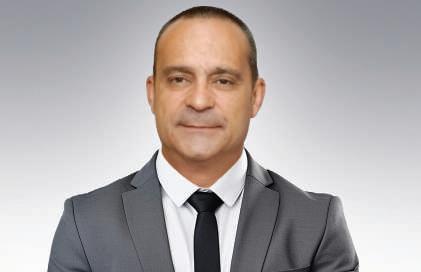
demanding certifications, while we will continue with sustained growth in new products that are having great acceptance, such as flat peaches and table grapes.”
Barredo has previously held senior positions in a number of multinational companies, including Pepsi and British American Tobacco, as well as leading Spanish companies like Pascual and Gonzalez Byass.
“Through his analytical, leadership and strategic vision skills, he has led projects that required profound changes to existing structures and strategic focus. He is an EGB professor with a specialty in Sciences at the University of Deusto and has completed several master's degrees, such as the International Marketing Program and ADECA on the Agri-Food Industry,” HaciendasBio said.
Alfonso Erhardt, founding partner of Oquendo Capital, stated: “We are proud to accompany HaciendasBio in this fundamental moment for its growth, which we believe will help the company to reach its maximum potential.
“We reiterate our commitment to its strategic plan and we believe that the company now has a solid financial position to continue innovating and leading the European market for organic fruits and vegetables”.
HaciendasBio was on course to achieve a turnover of €30m in 2023, in line with its results for 2022. The company owns more than 1,400ha of organic-certified production, employs more than 2,100 people and exports to the main European supermarkets, Germany and Switzerland being its main markets.
Oquendo Capital is a fund with experience in the agri-food sector and with an important commitment to sustainability. It has the BCorp international sustainability seal and currently has investments in companies in the agricultural sector such as The Natural Fruit Company, Agrupapulpí, Alsur, or Surexport. E
FUTURE LAB

• Open forum in the exhibition halls
• 10 sessions of 30 minutes each on 3 trade fair days (7–9 February 2024)
• Free of charge to all visitors and exhibitors
• Simultaneous translation in English, French, German, Italian, Spanish
2024 PROGRAMME (subject to change)
• Wednesday, 7.2.2024
12.00-12.30 Digital Horticultural Systems – developing a digital twin of production and supply chain ecosystems
• Mark Piper, Plant & Food Research, New Zealand
14.00-14.30 Novel cellulose films for sustainable food packaging
• Vinay Kumar, VTT Technical Research Centre of Finland, Finland
15.00-15.30 Heat waves in fruit production – do we have enough data?
• Dr. Manuela Zude-Sasse, Leibniz Institute for Agricultural Engineering and Bioeconomy e.V. (ATB), Germany
• Thursday, 8.2.2024
11.00-11.30 Transforming Soft Fruit Farming – The true magic of embracing data driven innovations and strategies
• Theo Slaats, Yield Computer BV, Netherlands
12.00-12.30 Using smart orchard design and ecosystem services for increased yield and quality of macadamia nuts
• Mina Anders, Georg-August-Universität Göttingen, Germany
14.00-14.30 Sustainability – challenges for the fresh produce supply chain and which new solutions is Rijk Zwaan offering?
• Jan Doldersum, Rijk Zwaan, Netherlands
15.00-15.30 EDEN ISS: Analogue Testing of Plant Cultivation for Space
• Prof. Dr. Ing. Daniel Schubert, DLR - German Aerospace Center, Germany
• Friday, 9.2.2024
11.00-11.30 Unravelling the molecular control of the strawberry fruit ripening
• Francisco Javier Molina-Hidalgo, Department of Biochemistry and Molecular Biology, University of Córdoba, Spain
12.00-12.30 Current status, opportunities and challenges for hazelnut production in Germany
• Dr. Martin Penzel, Research Center for Horticultural Crop Plants, Germany
FRUCHTHANDEL MAGAZIN
Focus issues for FRUIT LOGISTICA 2024: No. 1/2 2024 to 10/2024
Fruchthandel Magazin-Advertising Department: anzeigen@fruchthandel.de
Tel +49-(0)211-9 91 04-40

Messe Berlin GmbH
Messedamm 22 |14055 Berlin | Germany
Tel +49-(0)30-3038-0 | Fax +49-(0)30-3038-2020 www.fruitlogistica.com fruitlogistica@messe-berlin.com

Iran’s Zarrin Group relies on chartered reefer vessels, as sanctions hit bananas
For Iranian banana importers, options are being restricted not only by sanctions, but also climate change, as the Philippines experiences another wet year.
by Tom Joyce @tomfruitnetIranian imports of bananas have faced multiple challenges over the past decade, not least the sanctions that have drastically limited companies’ ability to ship and make payments, but also the extreme weather experienced in some of the country’s key sources.
Due to sanctions, bananas can
only be shipped biweekly from the Philippines to Iran, exclusively by chartered vessel from multinational banana companies, according to Alireza Emami, CEO of Iranian trader Zarrin Group.
“The continuation of the sanctions imposed on container shipping lines has le us with only
LEFT—Zarrin Group CEO Alireza Emamione choice for shipping,” he tells Eurofruit following a trip to the Philippines. “Chartered vessels, which head to Iran from Davao almost biweekly.”
With the aim of achieving sustainable supplies of bananas for consumers in Iran, Emami conducted negotiations for 2024 with a multinational company in the Philippines, while assessing the situation on the ground.
“The field data and information from the area indicate an almost 50 per cent decrease in banana production in recent years, which is more than the percentage mentioned in the statistics,” says Emami.
The main reasons behind this reduction, he says, are climate change, with more rain and fewer sunny days; the Covid-19 pandemic, with its restrictions and additional costs, as well as the inability of the government to fully support producer companies; and finally, Panama disease, which continues to impact farms.
“These issues have created backbreaking pressures for Filipino producers,” says Emami, “and their inability to afford the extra costs has resulted in a decline in production.
“Many banana farms belonging to old suppliers were destroyed due to an inability to afford the costs, especially during the pandemic. They are looking for investors to revive their farms, which may be an opportunity for multinationals, while some are turning to the production of durian, which yields four to five years a er planting, with farmers planting corn for animal feed in between.”
According to Emami, many small and mediumsized companies have reduced their staff numbers as a result of such issues. “Many reefer container shipping lines are no longer operating in Davao, which was the centre of the country for banana production and exports,” he adds. “Along with other factors, a lack of Iranian imports by reefer container during this period of sanctions has had a considerable effect.”
Banana prices have risen, he says, mainly due to the decrease in production, in addition to rising costs, especially for imported materials like chemicals. “But prices would surely be higher if not for the growing economic issues in many consumer markets which have resulted in lower demand,” says Emami. “Some markets that used to order only class A big-hand bananas have started asking for class A small-hand or class B bananas. That being said, the main demand for Filipino bananas still comes from Japan, China, South Korea and the Middle East.” E

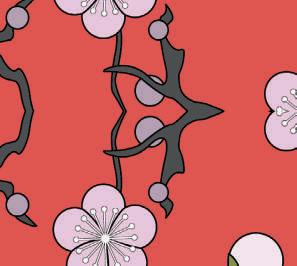






Avocados From Mexico brand keeps on growing
President and CEO Alvaro Luque looks back on another record-breaking performance and provides a glimpse of what’s in store for AFM’s 10th anniversary year.
by Maura Maxwell @maurafruitnetLast year was a record year for avocado sales for Avocados From Mexico (AFM). What do you put this continued growth down to?
Alvaro Luque: In fiscal year 2023 (1 July 2022 to 30 June 2023) we imported over 2.478bn lbs of avocados, which beats our previous record-setting year in FY21 of 2.426bn lbs by 2.1 per cent. There are a couple strategic campaigns that have contributed to this outstanding performance. Firstly, we had a record number of pointof-sale displays in retailers between October and December via our shopper marketing programmes supporting the World Cup shopper promotion.
We also saw strong 360 campaign efforts for our biggest tentpole moment of the year – The Big Game. More than 250m lbs of Mexican avocados were imported into the US in the weeks leading up to the Super Bowl final.
And we continue to invest in health and wellness as a priority for our brand by supporting breast cancer organisation Susan G Komen with pink bags in Kroger and Walmart.
We are equally excited about the present fiscal year. In October we celebrated a major milestone – our 10th anniversary – with a
VIP event at the International Fresh Produce Association’s Global Produce and Floral Show. The AFM brand has had a huge impact in the industry and we will continue to be a trailblazer for produce going forward.
You also saw a huge increase in sales during the Cinco de Mayo celebration. Is that mainly because of improved availability compared to the previous year?
AL: Cinco de Mayo represents a key opportunity for us to showcase the roots of our brand – the spirit of ‘Mexicanity’. Often celebrated with Mexican handheld foods including tacos, burritos, and quesadillas, Cinco de Mayo is the second biggest consumption occasion in the US for avocados and guacamole and represents a key opportunity for us to engage with shoppers.
Avocado volume consumption during the four weeks leading up to Cinco de Mayo has grown 9.4 per cent over the last six years and 2023 was a record Cinco in terms of imports, which were up 61 per cent on 2022. From an imports standpoint, this was the biggest Cinco ever for Mexico and the avocado category.
What would you say have been the game-changers in terms of the way

avocado marketing in the US has evolved in the ten years since AFM was established?
AL: Knowing that we have a superb product quality and distribution programme, as well as a huge advantage of being the only origin that can consistently deliver Hass avocados all year round to match US consumer demand, our job has focused on delivering an innovative and strategic marketing and promotional programme that builds this brand and grows the category.
In only seven years, we were able to double imports of Mexican avocados, which confirms that we are moving in the right direction. Our branding strategy has a lot to do with these results.
From a merchandising standpoint, we’ve found it’s important to market avocados in influential locations in-store to drive conversion. Merchandising with companion items that shoppers use when buying avocados for meals, such as tomatoes, onions, lemons, limes, tortillas, and chips (aka, “guacamole stations”), also provides a convenient solution for shoppers and
encourages consumption.
For our in-store programmes, we always use visually engaging merchandising to help display our avocados, as well as featuring QR codes on the displays that shoppers can quickly scan. All our in-store signage is an effort to remind shoppers why Avocados From Mexico are always good.
When it comes to boosting avocado consumption, does most of the growth come from new customers and increased household penetration, or are the people who have always consumed avocados now consuming more?
AL: Per-pound consumption in the US has exploded, driven by many factors including AFM’s marketing. Our household penetration in the US is approximately 65 per cent, meaning 35 per cent do not eat avocados currently. Our growth won’t continue by trying to get those 35 per cent, rather to get those who eat to eat more. When it comes to retail, AFM has nearly 100 per cent market penetration: it’s hard to find a grocery store which doesn’t sell avocados.
Additionally, because consumers are looking to buy avocados yearround, there is an ongoing interest and demand for avocados in the US. This is driven by growing diverse populations, increased use of avocados by restaurants, consumer trends toward ethnic and health promoting foods, and increasing awareness of health benefits of avocados. This provides us with ongoing opportunities to engage with consumers through our exciting promotions and eyecatching merchandising. We believe there is much upside in the category. We know health is the main driver, yet taste is what keeps them.

Finally, where is the limit on how much avocado sales can keep on growing profitably in the US? Are we close to saturation yet?
AL: The sky is the limit. Avocados grow year-round in Michoacán, so we have a steady supply of delicious fruit to meet increasing consumer demand. And with the addition of the state of Jalisco to the import programme, we have even more avocados available for US consumers with the same commitment to quality and traceability. In fact, this year we are projected to import a record volume. E

Mixed fortunes for Mission
Fourth quarter sees “improved top and bottom-line performance” while overall net loss for the full year is lower.
by Carl Collen @carlfruitnet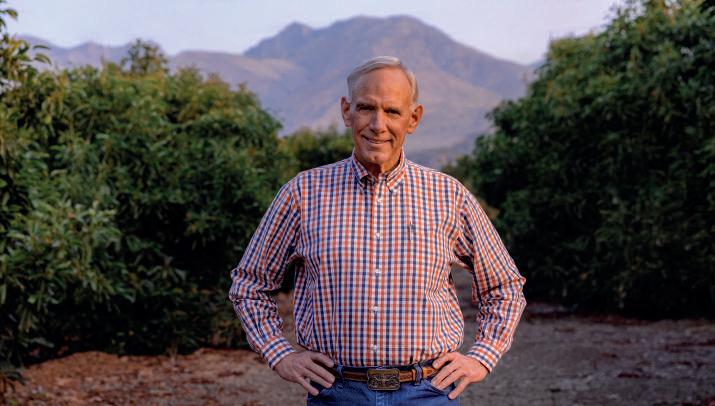

Mission Produce reported on its fourth quarter (Q4) and full-year results at the end of December, while CEO Steve Barnard also looked ahead to the coming year.
For the final quarter of 2023, ended 31 October, total revenue increased 8 per cent to US$257.9m compared to the same period last year, the group confirmed. This was driven by an 8 per cent increase in average perunit avocado selling prices, partially offset by a 4 per cent decrease in avocado volume sold.
Net income for the quarter was US$4m compared to a net loss of US$42m last year, which included a non-cash charge of US$49.5m related to goodwill impairment. Adjusted net income came in at US$7.5m, down from US$9.2m in the fourth quarter of 2023, while adjusted EBITDA remained fairly flat at US$17.3m.
“Our fourth quarter results saw improved top and bottom-line performance driven by strength in our marketing and distribution segment, further supported by substantial growth in our emerging blueberries segment,” said Steve Barnard, CEO of Mission. “However, continued weatherrelated challenges in Peru resulted in quality issues towards the latter end of the season and lower than expected volumes, both of which impacted our international farming segment performance.
”Because we set our fixed price contracts with customers and market allocation prior to experiencing these weather-related events, we were limited in our ability to generate the seasonal increase in adjusted EBITDA that we would typically expect in the fourth quarter,” he explained.
FULL YEAR AND OUTLOOK
For the full 12 months, Mission said that total avocado volume sold increased by 12 per cent to 654.4m pounds, and total revenue was US$953.9m compared to US$1.05bn last year.
Mission reportetd on a net loss of US$2.8m for the year, compared to a loss of US$34.6m in 2022. Adjusted net income was US$13.3m, down from US$18.5m, and adjusted EBITDA increased 2 per cent to $48.4m.
Owned exportable avocado production volume decreased 9 per cent to 107m pounds for the 2023 harvest season, with volume negatively impacted by weatherrelated events.
“Looking ahead to 2024, we expect to realise improved pricing in our international farming segment given adjustments we’ve made to our marketing strategy following this past year’s experience, which we believe will create a more constructive backdrop for our international farming segment performance next year,” Barnard noted. ”In the meantime, we remain intensely focused on advancing cost control measures and reallocating resources to maximise efficiency. We believe that with anticipated improvements in operating cash flow and declining capital expenditure needs, we are in a great position to enhance our capital structure in the year ahead.” E
Next-generation packaging solution amplifies berry and mini-cucumber freshness and marketability

As leading berry growers are actively expanding and adapting their operations to meet surging global consumer trends, they are also facing the critical question of whether their efforts sufficiently protect their investments against the uncertainties of an increasingly unpredictable global supply chain.
“Berry producers are well positioned to profit greatly…when everything goes as planned. But given the industry-wide use of legacy shelf-life extension products and the delicate nature of soft fruit, it doesn’t take more than a small deviation in the supply chain to compromise a huge percentage of a shipment,” says Teresa Scattini, vice-president MAP technology at Hazel Technologies. “That’s why Hazel entered the berry vertical, we engineered a shelf-life extension product, Breatheway, to serve as a more dynamic, tech-enabled Modified Atmosphere Packaging (MAP) option, for berry producers looking to hedge against the common unknowns and achieve consistent quality for their customers.”
Demonstrating an ability to deliver 15-30 per cent more marketable fruit than a standard MAP product, Breatheway attributes this significant impact to its proprietary ‘Temperature Switch’ membrane technology. The packaging as a whole, whether in the form of a pallet cover, case liner, or pouch bag, is built on the understanding that each fruit thrives in its own ideal atmospheric ratio of O2 and CO2. Breatheway membranes, depending on the fruit or berry variety, are engineered and calibrated to those specific beneficial

Trial outcome
In a recent trial, Breatheway-treated raspberries maintained the target levels of O2 and CO2, even after a shift in temperature to 45°F. “On average, we found that Breatheway-treated raspberries had 16.3 per cent more marketable fruit on Day 4 compared to the control,” says Scattini. “On Day 11, they had 24.7 per cent marketable fruit, resulting in an overall average of 44 per cent fewer quality issues and improved visual appearance, providing more marketable fruit.”.
ratios. The membranes register when gas levels are askew and respond by actively inhaling the appropriate amount of O2 and exhaling the right percentage of CO2. This allows for the berries to maintain the optimal atmosphere over extended transit times and through unexpected events, like cold chain breaks. The result: extended shelf-life and an improved consumer experience.
Berry industry leaders have taken to Breatheway as the product continues a multi-year partnership, providing raspberry-specific pallet bags to one of the largest grower/ marketers in the world. Hazel produces standout products for
blackberries, blueberries, and strawberries. They’ve also recently introduced a consumer-friendly pouch bag that significantly slows decay and maintains the freshness of the increasingly popular minicucumber. Mini-cucumbers, much like berries, characteristically drive a high ring at the register yet often present quality challenges for retailers, resulting in shrink. The Breatheway technology for cucumbers reduces quality defects and delivers greener cucumbers, making it a win-win solution for both retailers and consumers alike.
Breatheway is currently in use in the United States, Mexico, Western Europe, and Northern Africa, and is forecasting significant growth
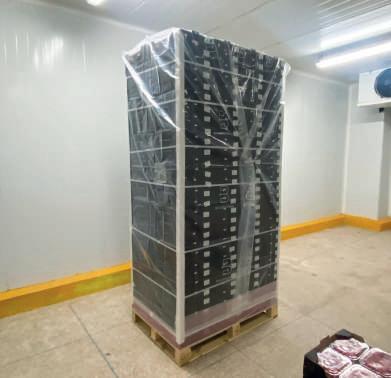
throughout the LATAM region and deeper penetration in the EMEA markets as new global manufacturing capabilities take root. With an ambitious 2024 ahead, the Hazel team is excited to kick off new conversations with berry and mini-cucumber growers from around the world at this year’s Fruit Logistica. Hazel can be found at In Hall 23 at B-04.

Bloom Fresh dials up the innovation
Six months after its creation, CEO Kenneth Avery tells Eurofruit why the new breeding powerhouse is a win-win for growers and consumers, and what we can expect to see from the company in the coming year.
by Maura Maxwell @maurafruitnetIt has been six months since Bloom Fresh was born from the fusion of SNFL and IFG, creating a global powerhouse in table grape and cherry breeding. One of the key advantages of bringing together two such prestigious programmes was to generate even better plant material and speed up the development of new varieties.
Kenneth, what does Bloom Fresh bring to the table?
Kenneth Avery: IFG has a history of creating varieties with fantastic flavours that appeal to consumers, such as Cotton Candy, Candy Snaps. Flavour is also a feature of SNFL’s germplasm pool but its varieties are well known for their excellent agronomic qualities –they are easy to grow, high yielding and require less labour for example.
And so the concept was to put these two incredible germplasm banks together and start to create new crosses that give consumers
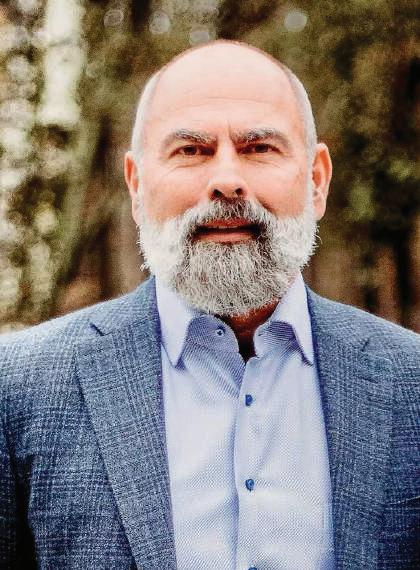
what they want, but ultimately at the same time provide a profit opportunity for our growers as well.
One of the things that we know through research is that consumers want to have a consistent eating quality and that one of the reasons why they don't buy more grapes is because they don't have that. By putting these two breeding programmes together we have a chance to create varieties that are both

easier to grow and guarantee a more consistent quality for the consumer. That’s the way you will increase demand for grapes around the world.
You talk about the importance of new varieties having that allimportant consumer appeal. One of the new projects you have coming through the pipeline is the development of a redfleshed variety with super high antioxidant levels. How is that going?
KA: It's going really well. The concept came from wine grapes – drinking wine in moderation is good for you because of the antioxidants it contains.
But a wine grape is not great to eat as they are softer and smaller than table grapes, whereas what consumers want is crunch. The idea was that by crossing the two of them we could create something unique, a new category for grapes that could help increase demand.
We’ve done a lot of research around table grapes which shows that they have higher antioxidant levels than blueberries, which are known globally for being a super
food. We want people to start talking about grapes in a different way, to see them as a healthy snack, much like blueberries. Retailers and growers are very excited about this project and the consumers that have heard about it in trials are excited about it too.
So are these varieties already being grown commercially?
KA: Today we have over ten redfleshed varieties in different sizes and shapes. A couple of years ago we began planting what we call semi commercial blocks – where we create enough plants over an area that allows growers to see how they perform and produce enough volume to allow us to carry out taste testing. By this summer we’ll have sufficient volume to do a lot of sampling activities.
Extreme climatic events are becoming increasingly frequent and growers need robust varieties that can withstand these challenges. At the same time, yields have to be high to make a variety commercially viable and, as you mentioned, there has to be great eating quality. How do you ensure
OPPOSITE TOP—Global production of licensed table grape varieties is growing every year
OPPOSITE BOTTOM—Bloom Fresh CEO Kenneth Avery
LEFT—SNFL and IFG’s combined germplasm banks boost the potential to create exciting new varieties
that you are able to satisfy all these requirements?
KA: As we're advancing products through the pipeline, we're looking to check every box. We want high fertility, exceptional fruit quality and high yield. At the same time, we have to make sure that we’re growing the variety in an optimal way.
A grape is essentially a balloon holding water – you want that plant to take energy and convert it into the sugars, size, texture and everything else that makes that grape special.
But you could have too many bunches, which will require pruning to actually pull back the volume in order to get a higher quality. As we work with our varieties in our research plots, we come up with what we believe is the best recipe to hand on to the grower to maximise the volume. Then the grower will do what they do best, which is take our recipe and continue to work with it and develop it to suit their specific growing conditions.
Bloom Fresh recently mapped out some of its key trends and predictions for 2024, one of which was the potential to expand your presence in key Southern Hemisphere producing countries. Where do you see the best opportunities?
KA: The industry today is divided into two camps: licensed hectares and unlicensed hectares – the Red Globes of this world that have been around since the 1950s. While the older varieties are open and free for people to use, they have not stood up to the economic and environmental challenges of our time.
In Chile we’re seeing a greater willingness to
switch over to licensed varieties because growers recognise the economic value that they bring. Peru, meanwhile, has seen incredible growth – it has a great reputation for producing a very high quality grape. Mexico, I believe, is another country that continues to expand. And then of course, there’s the US, which has been relatively stable the last five years.
What about in Europe?
KA: Spain's a very stable, mature market where we have enjoyed very good growth over the years. But there are not a lot of new hectares being added. Egypt, by contrast, has seen very significant growth. Egyptian growers are very good – they have been farming for thousands of years. There has been a lot of infrastructure investment there from both growers and the government, so I’m really bullish about Egypt. Italy is the largest producer in Europe in terms of surface area. We’re seeing some switchover from open to licensed varieties which is an opportunity for us.
The other big producer that we haven't mentioned is China. In the past there have been well documented IP problems that have put breeders off. What is the situation like now?
KA: Things have changed a lot.
Over the past five years China has passed some of the best IP laws in the world and there has also been reform around land holdings to allow for bigger farms. I think the Chinese government has made a lot of positive changes. We recently won an enforcement case there so I think the tide has turned.
China is also the number one consumer market for a lot of our growers. Chinese consumers love grapes, so we see it as a great opportunity. We have a presence in China and a number of our varieties are registered there. But we’re still working out how to build out China from a growth perspective. We want to do it right and with the right partners.
I've managed a couple other businesses that were in China and success is always going to be based on a mutual collaboration in my opinion. It’s got to work for
the Chinese farmer, just like it has to work for the Peruvian farmer. And it's got to work for us at the same time.
Together, SNFL and IFG varieties account for close to 50 per cent of planted acreage in some countries. What do you say to smaller producers who fear that less competition in the market when it comes to choosing varieties means that they will have less bargaining power?
KA: Globally, our overall market share is much lower than that, although we do have some higher market shares in some countries. But growers have a choice. We have competitors out there that have some good varieties of their own. Ultimately, we want to win based on the quality we provide because this is a true partnership. You know, I've been in a lot of businesses where I’ve use the word ‘partnership’ because I thought it sounded good and I wanted it to happen, but it was really more transactional than a true partnership.
But in this business we spend all that energy on the research and development of new varieties and then the farmer plants them over a period of 10-15 years…we really do become partners who constantly work together to get better and better. At Bloom Fresh we want to be seen as a leader – not only in grape and cherry germplasm, but also in how to integrate technology. Part of our mission is to help the grower maximise what they do on a daily basis. And if we can do that well we believe we can play our part in significantly increasing grape consumption. E
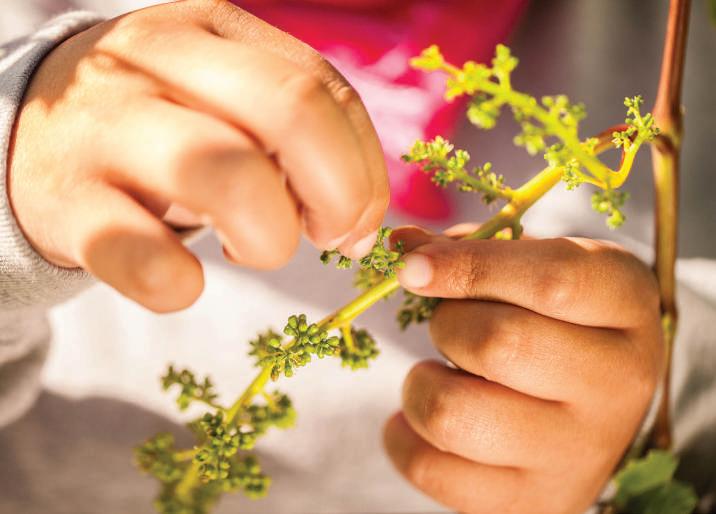

Amalia Rossa hits the right note
The Summer Berry Company’s new raspberry variety is proving a hit with European retailers.
by Maura Maxwell @maurafruitnetThe Summer Berry Company is scaling up production of its new raspberry variety, Amalia Rossa, after its successful launch last year.
The UK-based company, which has farms in Sussex and Odemira, Portugal, holds the exclusive rights to market the variety, developed by Italian breeder Berrytech, It plans to plant 70ha in 2024, giving a commercial volume of around 1,000 tonnes.
Genetics director Joe de Ruse says the variety has already attracted considerable interest from retailers. “The ones who trialled it are asking for more, and even some who didn’t want to try it,” he says. “But while volumes are limited, the markets we’re really focusing on are the UK, Ireland, as well as Germany and France.”
According to de Ruse, Amalia Rossa stands out for its “incredible
shelf-life” and extended production season. The variety can be planted as early as late February and as late as August, so it produces from June right through to February.
“It’s a great producer on the primocane crop. And, unlike other varieties where size seems to drop off as you get later into the season, it produces fruit of a uniform size throughout the season,” de Ruse says, adding that in trials its shelflife was found to be around 30 per cent longer than other commercial varieties grown by the company.
For a firm that prides itself on its respect for the environment in which it operates, de Ruse is also keen to highlight Amalia Rossa’s sustainability credentials. The company’s sustainability strategy is grounded in the six pillars of its environmental, social and governance (ESG) programme –people, energy, water, carbon net
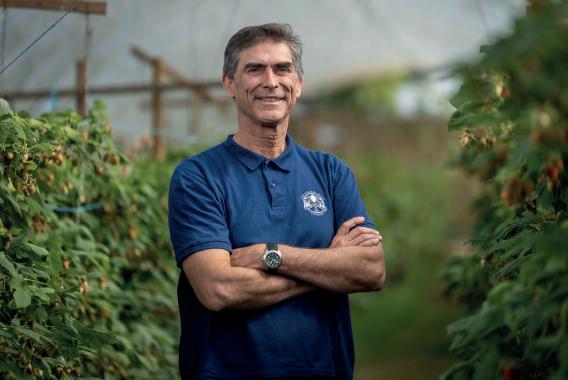

zero, zero waste and biodiversity.
“We try to ensure that we only use what’s needed in terms of resources. Take water, for example. We want to make sure that we are supplying enough water, but not too much. “With this variety, we’re seeing that the better control we have of water, the better quality fruit it produces,” he says.
The Summer Berry Company’s farms are located in Alentejo, which is also where Amália Rodrigues, the famous fado singer after which the variety is named, liked to spend her summer vacations. The area is particularly well suited to growing berries as summertime temperatures are less extreme than in more southern parts of the country and the cooler nights help the fruit achieve its optimum flavour.
Looking ahead, the company plans to extend production of Amalia Rossa to Morocco by sublicensing the variety to local partners as its market acceptance grows. “This would give us the opportunity to produce larger quantities in the wintertime. We are currently in talks with potential partners and aim to start semi-commercial plantings later this year,” de Ruse says, adding that “we’re taking it slowly and speaking to a lot of different people because we want to make sure that we find the right partners who align with our values and goals”. E
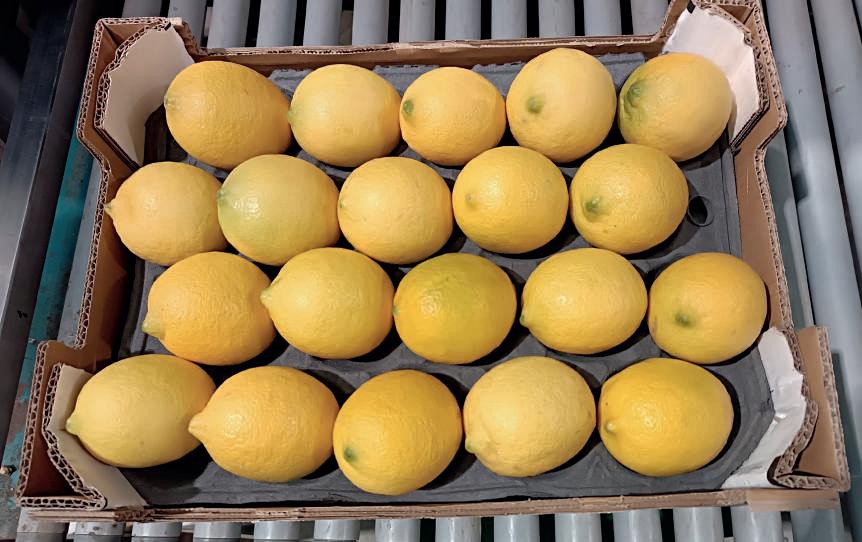
Can Silkroad seedless lemons add zest to citrus category?
The variety’s many advantages make it one to watch for the future, says Rubén García of Ciqua Levante.
by Maura Maxwell @maurafruitnetAnew seedless lemon variety from Ciqua Levante is attracting considerable interest from Spanish growers. Silkroad, a mutation of the Fino variety, is an extra-early lemon that can be harvested from the end of August through to midNovember. Most importantly, it is a variety with low pollen viability, which means that under the right agro-environmental conditions it can produce seedless fruit.
“We were looking for a new, high-quality lemon variety with high production, adapted to our growing conditions, that improved the characteristics of the main varieties grown in Spain, that is to say Fino 95 and Fino 49,” Ciqua Levante’s CEO Rubén García tells Eurofruit. “Its name comes from
the idea of creating a high-quality route to market for premium Fino lemons – hence Silkroad.”
Apart from being seedless, García says Silkroad has many other advantages that make it attractive to producers, not least its high productivity and rapid entry into production – by the second year trees can produce up to 20kg of fruit, meaning a faster return on investment.
“Silkroad produces a smallersized, high-quality fruit that is smoother, more rounded and symmetrical than Fino and has a smaller collar and nipple. Plus, it has fewer and smaller thorns than Fino, which makes it easier to harvest and reduces fruit rubbing. And its uniform coloration makes degreening easier,” says García.
LEFT—Apart from being seedless, Silkroad has many other organoleptic a ributes
The harvest season is also a boon, as it coincides with the period when lemon supply is at its lowest and higher prices can be achieved.
Ciqua Levante, which holds the licensing rights to Silkroad in Spain, says it is already being propagated by two nurseries – Caliplant and Avasa – and it is in the process of closing agreements with another company to manage the variety in other countries. “Our aim is to introduce Silkroad into countries where it has the best potential to do well,” García, says, noting that there has been a high level of interest from growers in South America and the US in particular.
Silkroad is just one of the new citrus varieties Ciqua Levante is developing. “We are working on the selection of very interesting varieties of lemon, grapefruit, orange and tangerines that together will make up an innovative citrus portfolio,” says García. “In the next ten years we hope to have around 10-15 registered varieties, including a much earlier Navelina type orange, as well as our furanocoumarin-free red citrus.” E
Tozer Ibérica sales jump 20 per cent in 2023
The seed company’s recently-launched Cleopatra celery variety led the charge last year.
by Maura Maxwell @maurafruitnet
Asolid performance in the celery segment helped lift Spanish seed specialist Tozer Ibérica’s sales by 20 per cent in 2023. The Murcia-based company said much of the growth was down to the success of its recently launched Cleopatra variety. Sales of
the compact, slow-tapering celery, which can be harvested up to two weeks earlier than other varieties, grew 600 per cent in the 12 months to December.
“Last year the sector already showed great interest in cultivating Cleopatra thanks to its high
Besides celery, parsnips and coriander were amongst Tozer’s best performing categories in 2023
productivity,” says James Hatherill, Tozer’s European sales director.
Outside celery, parsnips and coriander were amongst Tozer’s best performing categories in 2023. This includes Bolero, a newly launched variety of coriander with a dark leaf and homogeneous size and slow growth that makes it possible to cultivate it throughout the entire production cycle.
Tozer’s strategy is to continue to adapt proven successful varieties to be able to withstand the increasingly high temperatures seen on the Iberian Peninsula each year. “We are constantly working to develop new varieties that require less water and withstand high temperatures in the field,” Hatherill says. “However, there are many factors involved in the process – it takes years to develop and launch a new variety.”
For the coming year, Tozer said it remains focused on strengthening its celery sales throughout Spain, especially in Murcia and the Levante area. In this la er region, the seed company also has high expectations for its varieties of pak choi, parsnip and cilantro.
In addition, it plans to step up promotions of its range of parsnip, coriander and rocket in the northern part of the country as well as increasing rocket sales in the southern part of Portugal, where Tozer varieties are increasingly gaining market share.
In order to showcase its new varieties, the seed house will hold a Tozer Days 2024 event at its testing field in El Albujón, Murcia, from 13-15 February. New offerings on display will include spinach and chard varieties coordinated with the Dutch Pop Vriend, as well as new celery, coriander, kale, rocket, leek and chive varieties. E

WayBeyond maps out vision for the future of farming
Founder and CEO Darryn Keiller tells Eurofruit why the company’s digital agronomy solutions for protected cropping continue to gain traction in the produce industry.
by Maura Maxwell @maurafruitnet
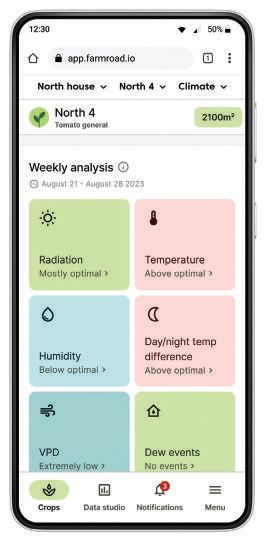

NLEFT—Darryn Keiller
BELOW LEFT—
ew Zealand-based ag-tech company WayBeyond is on a mission to transform the protected cultivation landscape with its digital agronomy solutions that help growers track and manage their critical production data in a more effective way. Founder and CEO Darryn Keiller says the company’s proprietary AI-powered crop management software, FarmRoad, has already attracted some big names in produce, including several major seed companies like Bayer, Syngenta, and HM Clause.
FarmRoad, provides farm- and crop-specific insights and recommendations enabling growers to make more informed crop management decisions, thereby improving yield, consistency and quality to make farming more sustainable. The so ware is fed by a network of sensors monitoring and recording hundreds of aspects of plant phenology, climate and environmental factors in real time to provide a deeper understanding of crop health and performance.
Keiller – whose background is in tech – was first introduced to agriculture a er leaving the corporate world some ten years ago to work as a consultant for start-ups. One of these was Autogrow, a family firm manufacturing climate computer and farm automation solutions for small to medium-sized fresh produce growers using greenhouses and tunnel farms.
“Up to then I’d never really spent much time thinking about where my food came from and what it took to produce it. Working with Autogrow really opened my eyes about what is happening in farming and the food system,” he says.
“I started to form a picture of things. I could see there were problems all the way through the supply chain. Systems hadn’t changed much in a long time and there was an almost complete absence of advanced tech.”
Inspired by what he’d learnt at Autogrow, Keiller had a vision of bringing together a range of technologies to
FarmRoad provides crop- and farm-specific information based on data fed through from a network of sensors »
LOGISTICS HUB

FRUIT LOGISTICA 2024 HALL 26 | STAND A-99
• A global perspective on key challenges in perishable shipping
• New airfreight services and how they can open new markets
• Sustainability – the green light at the end of the tunnel
• Transport for tomorrow – new technologies for better supply chains
2024 PROGRAMME (subject to change)
• Wednesday, 7.2.2024 DAY 1 – GLOBAL TRENDS
& OPPORTUNITIES
10.00 Keynote — A fresh global perspective on the international reefer market.
10.30 Panel — How can the perishable logistics business grow in 2024?
11.30 A brand new service centre and logistics concept for Europe’s exotics buyers.
14.00 The sky’s a limit: what does the capacity squeeze mean for airfreighted fresh produce?
14.30 Don’t carry the cost! Learn about the four biggest myths in fresh produce cargo claims.
15.00 The Brexit hangover: how can the UK’s supply chains recover?
15.30 A view from the Middle East: new markets and new frontiers for cool logistics and warehousing.
• Thursday, 8.2.2024 DAY 2 – SUSTAINABLE SUPPLY CHAINS
10.00 Keynote — A deep dive into fresh produce trade flows of the future.
10.30 How do we take a fair approach to Net Zero for airfreighted produce?
11:00 How can banana supply chains survive the permacrisis?
14.00 Keynote — What happens when the next crisis hits?
14.30 Supply chain decarbonisation in action: how to find viable alternatives for East African exporters.
15.00 Better returns: what can the produce business expect from reusable packaging?
15.30 New port security solutions for the digital age.
• Friday, 9.2.2024 DAY 3 – HIGH-TECH SOLUTIONS
10.00 A new, data-driven system to track produce shipments.
10.30 Are we on the right path to paperless produce shipments?
11.00 The world’s first cable-car system for fresh produce.
11.30 Coming in from the cold: How temperature adjustments could save the Planet.
FRUCHTHANDEL MAGAZIN
Focus issues for FRUIT LOGISTICA
2024: No. 1/2 2024 to 10/2024
Fruchthandel Magazin-Advertising Department: anzeigen@fruchthandel.de
Tel +49-(0)211-9 91 04-40

Messe Berlin GmbH
Messedamm 22 |14055 Berlin | Germany
Tel +49-(0)30-3038-0 |
Fax +49-(0)30-3038-2020
www.fruitlogistica.com
fruitlogistica@messe-berlin.com
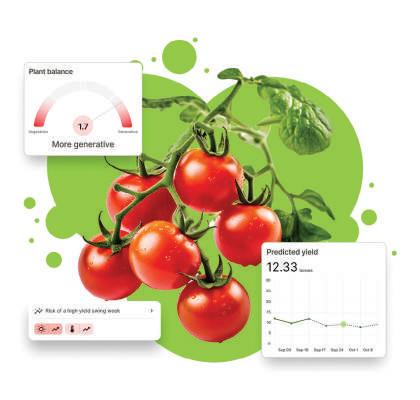
create a product proposition that would help transform fresh produce production and in 2020 WayBeyond was launched. He decided to focus on the farm – from seed to harvest – as that’s where he felt WayBeyond could offer the most value, and specifically protected cropping, which covers everything from indoor vertical farming to hi-tech glasshouses, mid-tech plastic greenhouses and polytunnels.
From the outset, Keiller understood that to be successful, the ability to demonstrate the company’s ability to scale and achieve a market leadership was as important as the tech itself, not least because “these technologies are expensive to build and getting funding in agriculture is not easy”.
What followed was a steep learning curve for the self-confessed “city boy”, culminating in the development of WayBeyond’s proprietary sensor network and the FarmRoad software in prototype form. Then came the pandemic. Having spent millions of dollars in R&D to create this game-changing suite of technologies, the company found itself unable to go out and sell them. “This industry is very strongly relationships-driven, it’s all about seeing people face to face, networking,” says Keiller. “It was a very tough two years for the business, but we survived and in 2021 we secured a range of early adopter customers.”
Today the business can be split roughly into two branches. The first works with big producers, frequently with operations spanning different geographies, to optimise fruit quality and resource allocation. “When a pest or disease outbreak is looming, the most common industry practice is to blast the whole farm with pesticide or herbicide. Our solution allows the farmer to isolate the affected area and just treat that, which saves money, labour costs, and optimises output,” says Keiller.
WayBeyond recently published the results of a case study for African Blue, a Moroccan blueberry producer with 470ha of production (owned by Costa Group), showing how FarmRoad enabled the company to make
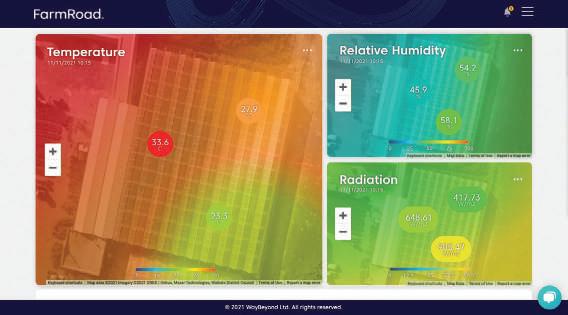
better growing decisions.
“Before we arrived, African Blue’s agronomists would typically have to drive or walk across nine farms spread over hundreds of kilometres to assess what was going on. Now they can get all the information from our sensor network which is analysed and presented through FarmRoad and can be managed remotely, so they only need to go to the places where the need is most urgent,” Keiller explains.
The second strand of the business involves worldleading seed companies. Last year, WayBeyond signed a fouryear digital technology services agreement with Bayer CropScience Vegetable Seeds to transform agronomic management practices and optimise seed quality at Bayer’s operations in Mexico and Spain.
Keiller says he wants WayBeyond to bridge the gap between seed companies and producers. “During the breeding process, the seed company will interact with the grower but once a variety has been released it has very limited visibility of how it is doing,” he says. “We know that varieties that performed a certain way in the breeding programme end up performing very differently in different geographies. We have access to that performance data, that’s the value of what we provide. We see a tremendous opportunity for collaboration to move the
industry forward by creating a dynamic loop of information.”
WayBeyond’s real value proposition is providing objective, data-driven agronomic insights that empower the grower to make decisions that will positively impact the harvest – and ultimately their profit margin. The company collects over 200 different types of data, ranging from phenological information to irrigation uptake and climate, and builds highly sophisticated models which present actionable insights to the grower.
And as the technology advances, Keiller believes there is scope to create a self-learning ‘virtual agronomist’ that will fill in knowledge gaps and reduce the grower’s reliance on guesswork.
With Bayer and other big produce names already on board and several commercial agreements in the pipeline, WayBeyond is now looking to further expand its customer base in the coming year, focusing primarily on Morocco and Mexico.
“There’s a lot still to be done,” says Keiller, “but the key thing is that we have got demonstrable traction. And we have scalability. Ultimately, we want to reach a point where we are the dominant company in digital agronomy with both seed companies and growers.” E
TOP—WayBeyond provides data-driven agronomic insights that empower the farmer to make better growing decisions


Avisomo, Coop Norway form JV to grow Norwegian le uce year-round
Avisomo will build a fully automated vertical farm directly integrated into retailer’s existing distribution centre.
by Maura Maxwell @maurafruitnetAvisomo, an Oslo-based turnkey vertical farming systems developer and equipment manufacturer, has formed a strategic partnership with Norway’s second-largest supermarket chain, Coop Norway, to build a fully automated vertical farm directly integrated into the retailer’s existing distribution centre.
The vertical farming sector has been hit by rising energy prices, interest rates, and increased cost of capital, and has seen prominent early adopters falter over the last couple of years.
By integrating the farm into Coop Norway’s distribution chain, Avisomo shares risks such as energy, food price fluctuations, access to consumers,
stability and longevity and reduces the need for middlemen.
Together, Avisomo and Coop are investing €5.2m in the new venture, which will bring fresh, affordable and local salads to Norwegians all year round.
Avisomo says its fully automated and remotely operated indoor growing system – named ‘Frøy’ after the Norse god for wind, rain, and sun – differs from other vertical farming solutions thanks to its flexible and modular approach built on recognised standards from the established food industry.
The farm will eventually produce vegetables and salads at scale and at a competitive cost without any form of human interaction with the plants,
eliminating the need for import, and guaranteeing quality, affordability, and reduced climate impact.
Martin Molenaar, CEO of Avisomo, comments: “Our approach is based on growing produce directly in standard-sized trolleys that are well established in the food industry, and moving the plants around the facility utilising automation robots.
“This ‘plant-to-personnel’ approach both reduces staffing needs and enables us to integrate well-tested automation machinery into the farm, reducing both upfront capital needs and operational costs”.
The joint venture has the potential to transform how Coop secures and distributes all of its leafy greens in the future. The goal is to transform the food system to ensure food and nutrition security for Norway and beyond.
Hege Berg-Knudsen, CEO of Coop Norway Industries says: “We see a huge potential in the collaboration with Avisomo to build Coop’s first vertical farm and start the process of securing our year-round lettuce deliveries. We have been scouting for technology providers that can deliver on our needs for the last five years or so, and Avisomo is the first company to provide such a scalable solution that is also compatible with full automation.”
Vertical farming is poised to become an essential ingredient to future food and nutrition security, but has struggled to obtain a strong foothold in the food supply chain. Rising energy and food prices, high installation costs and overly ambitious business models have led to a large number of failures among the venture capital-funded early adopters in the industry. Avisomo says its philosophy and strategy represent the new generation of virtual farmers, with a strong focus on flexibility, automation and remote managing. Founded by Martin Molenaar and Jo-André Flåseth in 2018, the company has developed a growing system and business model that it believes will help deliver a sustainable future for the sector. Central to this is the construction of a fully automated and remotely managed farm that produces what the client wants when they want it and capable of producing a wide variety of crops.
Avisomo says it hopes to help Norway to become self-sufficient in vegetables and salads. “For example, Norway currently imports 7,000 tonnes of rocket each year with a total sales value of €160m. Now this will be grown in Norway with all economic, social and environmental benefits this brings,” the company states.
“Currently about 30 per cent of imported lettuce is thrown out before it even reaches the stores. Vertically farmed produce is simply not wasted and promises a
Arrigoni’s crop protection solutions for citrus go digital with i4Fruit
Italian agro-textile specialist Arrigoni has launched a hi-tech solution to help citrus growers improve yields in even the most challenging conditions. As from now, its crop protection covers can be fitted with a network of sensors, allowing growers to digitise orchards in line with the Agriculture 4.0 principles set out by the i4Fruit network of companies, of which Arrigoni is a member.
Arrigoni agronomist Giuseppe Netti comments: “We offer a wide array of solutions depending on the farmer’s geographical area and the type of terrain. All these solutions can be completed by suitable digital instrumentation which enables the grower not only to provide protection against the weather and insect pests but also to enjoy constant, optimal control of their orchard, with real-time information on the situation at every moment so they can decide when, how and with what to intervene.”
The Badiula agritourism farm in Carlentini, Sicily, is one of the growers that has chosen Arrigoni screens, combined with digital sensors, to protect its organic lemon orchards. The entire system was installed by the i4fruit network of companies and showcased to the public recently.
Giuseppe Di Giorgio, agronomist and proprietor of the Badiula farm, explains: “We decided to construct this digitalised system to guarantee our lemon trees complete protection from diseases and adverse weather events. What’s more, this solution also provides us with an earlier crop, due to the increase in temperatures inside the net house, so we can get to market at a time when the product commands a higher value.”
Di Giorgio says the system’s efficacy had already been tested during the very high temperatures experienced during the summer of 2023. “In those months we experienced very high temperatures, which peaked at 48ºC and had serious consequences for the Verdello crop. In fact, in the unprotected lemon orchards we lost 50 per cent of output, while there was no damage at all in the areas under the coverings,” he explains. shelf-life up to eight times longer than conventional lettuce.”
And, unlike other approaches to vertical farming, Avisomo has the potential to build skyscrapers containing its systems, significantly reducing the current land area needed for plant production. The company says vertical farming also has the potential to reduce water usage by up to 99 per cent. E
Fairtrade initiative aids UK retailers
New initiative created by the Fairtrade Foundation is designed to help UK retailers collaborate on the crucial topic of sustainability.
by Carl Collen @carlfruitnet
In December, a new Fairtrade initiative was proposed with the aim of helping UK grocery retailers to collaborate on sustainability in supply chains.
The Fairtrade Foundation’s new Shared Impact model brings retailers together to pool their new Fairtrade sourcing commitments to a targeted group of farming cooperatives.
Given that Shared Impact is designed to boost sustainability through sector collaboration, the Fairtrade Foundation submi ed it for assessment to the Competition and Markets Authority (CMA) under its Green Agreements Guidance open-door policy, which aims to help businesses understand how they can collaborate on environmental goals without
falling foul of competition law.
In response, the UK regulator has stated that at this stage, it does not have concerns about the model: it concludes that “the Shared Impact initiative is unlikely to raise competition concerns”.
According to the Fairtrade Foundation, Shared Impact will enable UK grocery retailers operating at the same level in supply chains to take collective action on enhancing sustainability and resilience in supply chains – in partnership with Fairtrade farmers at the sharp end of the climate crisis and a challenging global economic context.
As part of an initial one-year pilot, participating UK retailers would source additional Fairtrade banana, coffee or cocoa volumes
from certified Fairtrade producer groups, on top of their existing Fairtrade sourcing commitments, under a new, focused sourcing approach.
“We are delighted that the CMA has today published informal guidance on our Shared Impact initiative to help businesses drive real and lasting change within their supply chains and meet their sustainability goals,” said Alexander Carnwath, head of public affairs at the Fairtrade Foundation, in December.
”Shared Impact is the first of its kind to go through the new open-door policy, demonstrating that Fairtrade is leading the way when it comes to improving sustainability in food supply chains at a time when the climate crisis demands credible and collaborative solutions.
“Farming remains one of the main drivers of deforestation globally, as well as a significant contributor to an increase in global greenhouse gas emissions and biodiversity loss,” Carnwath continued. ”Farmers and workers cannot drive forward sustainability initiatives without supply chain collaboration.
“That’s why Shared Impact is a joint pledge between farmers, retailers and Fairtrade. Expanding on the existing way we work with our retail partners, the new model allows them to target salient risks in their supply chain, drive forward a more resilient food sector, work together to advance shared goals, and fund real, lasting change in partnership with farmers and workers.”
For farmers and workers, it will mean longer-term sourcing commitments, closer relationships with retailers, and greater opportunities to sell more of their produce on Fairtrade terms, the Foundation outlined. E
LEFT—The initiative will see participants sourcing additional bananas from certified Fairtrade groups
BELOW—Shared Impact will enable UK retailers operating at the same level in supply chains to take collective action

TECH STAGE

On 2 days, Tuesday and Wednesday, 10 technical solutions from the following product groups will be presented to you.
The technology of tomorrow –you will find it today at FRUIT LOGISTICA. The Tech Stage is an open forum in the middle of the fair and open to all trade visitors free of charge.
Don’t miss the chance and reserve your time slot at Tech Stage 2024!
You can find the registration form here: fruitlogistica.com/Events/Tech Stage
2024 PROGRAMME (subject to change)
• Wednesday, 7.2.2024
11.00-11.20 Hydrophilic coating on ETFE – The sustainable future in the greenhouse market
• Oliver Lorret, Hueck Folien GmbH, Austria
11.30-11.50 Enhanced Reefer Container Air Flow and the RAFT-Kit
• Craig Osner, Reefer Air Flow Technologies, South Africa
14.00-14.20 Get rid of supply chain shocks with the Fresh4cast tools
• Mihai Ciobanu, Fresh4cast, UK
14.30-14.50 Reducing food waste by tracking supply chain
• Gerd Uitdewilligen, Copeland, USA
15.00-15.20 Apeel Ripe Track – product quality in view at all times
• Ryan Fink, Apeel Sciences, USA
• Thursday, 8.2.2024
11.00-11.20 Solving emerging new challenges in exotic fruit transport with innovative ripening technology
• Roland Wirth, Frigotec GmbH Kälte- und Verfahrenstechnik, Germany
11.30-11.50 Región of Murcia at the forefront of agricultural biotechnology companies
• Manuel Tornel Martínez, Agritechmurcia, Spain
12.00-12.20 Ozone 4.0 - pioneering way of treatment of the process water - controlled, safe and sustainable.
• Jürgen Bischhaus, Arrow Lake AB, Sweden
• Camilla Khrulova, Arrow Lake AB, Sweden
14.00-14.20 Multivac integrated packaging systems for fruit and vegetable applications
• Cem Yildirim, Multivac Sepp Haggenmüller SE & Co. KG, Germany
14.30-14.50 The new AI sorting and grading revolution
• Sebastian Stoof, Tomra Food, New Zealand
15.00-15.20 Maximising Grower Success: Harnessing AI for improved business results
• Rien Kamman, Source.ag, Netherlands
FRUCHTHANDEL MAGAZIN
Focus issues for FRUIT LOGISTICA 2024: No. 1/2 2024 to 10/2024
Fruchthandel Magazin-Advertising Department: anzeigen@fruchthandel.de
Tel +49-(0)211-9 91 04-40

Messe Berlin GmbH
Messedamm 22 |14055 Berlin | Germany
Tel +49-(0)30-3038-0 |
Fax +49-(0)30-3038-2020
www.fruitlogistica.com fruitlogistica@messe-berlin.com
Six essential steps towards sustainability
Any company that wants to secure its future must integrate sustainability into its business plan. But that’s easier said than done, says Richard Bonn, cofounder of Aethr Associates.
 TRICHARD BONN Co-founder Aethr Associates
TRICHARD BONN Co-founder Aethr Associates
his year, pressure on the fresh produce business to respond to sustainability demands has reached unprecedented levels. As global concerns about climate change intensify, customers, regulators, and even the climate itself now urges companies to engage with their environmental impact and social responsibility.
The risks of not adapting are clear. Those that fail to integrate sustainability properly risk playing catch-up on evolving customer demands, regulatory changes, and the potentially disastrous impacts of climate change.
Successful businesses must therefore view sustainability not merely as a compliance exercise, but as an integral part of their commercial plan. Just as any such plan serves as a roadmap and outlines goals and strategies, sustainability goals and strategies should also be woven seamlessly into this framework.
Is sustainability a core part of your business plan?
If the answer is ‘no’, it’s time to reassess and to act. How can you incorporate sustainability into your business plan? Here are six essential steps.
SEEK BOARD CONSENSUS
Achieving sustainability goals requires all stakeholders to be aligned. Board consensus is imperative if you want to meet the demands of customers, investors, employees, and the community.
DOUBLE MATERIALITY ASSESSMENT
This helps you identify priorities specific to your business. It means evaluating the environmental and social impacts on that business, and its impact on the environment and society.
and manage those people effectively to ensure they are delivered.
MONITOR AND IMPROVE
Implement key performance indicators (KPIs) that focus on sustainability. Regularly monitor and assess your progress to stay on track towards your sustainability objectives.
TRANSPARENT REPORTING
Lastly, report transparently to the market. Clearly communicate your sustainability initiatives, progress, and challenges. Transparency builds trust and credibility, essential elements in a world where consumers increasingly demand ethical and sustainable practices.
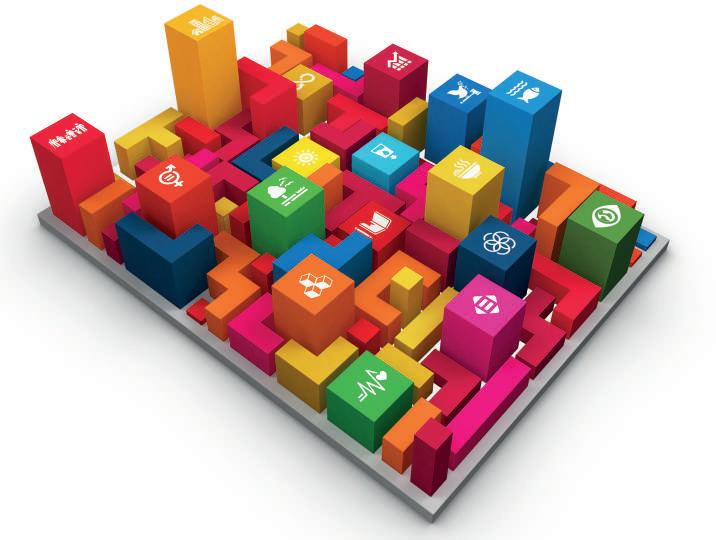
SET OUT YOUR SUSTAINABILITY GOALS
Clearly define how sustainability features in your business goals. This ensures that sustainability is not an ancillary concern but an intrinsic part of your business delivery.
DELEGATE RESPONSIBILITY
Ensure that sustainability is not the responsibility of a single department, but is woven into the fabric of the entire business. Delegate actions to people throughout the organisation,
Businesses that successfully integrate sustainability into their business plans will be the winners in this evolving landscape. By avoiding conflict and ensuring alignment of priorities, these businesses are better positioned to navigate the challenges of a world increasingly focused on sustainability.
The brave new world belongs to those who not only embrace sustainability but embed it into the very DNA of their operations. E
ABOVE—Sustainability can seem like a complicated puzzle to piece together



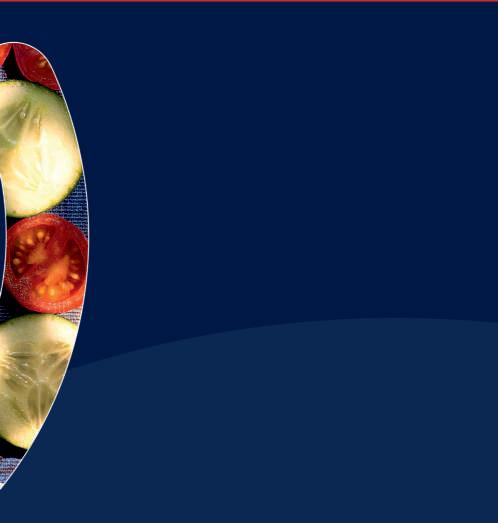





Anticipate the future
Revolutionise your product logistics and shed light on the transformative power of Coldcha 2.0 in the fresh produce industry
 EJAN-WILLEM SCHRIJVER Chief commercial officer Coldcha
EJAN-WILLEM SCHRIJVER Chief commercial officer Coldcha
very day, we provide growers, importers, and exporters in the fruit and vegetable logistics chain with crucial logistic insights. Our aim is to assist them in minimising claims, ensuring the delivery of top-quality goods, and preventing losses.
To achieve this, we’ve partnered with leading international realtime tracker manufacturers like Sensitech, Tive, DeltaTrak, Copeland, Frigga, and more. This, coupled with airfreight and vessel tracking, enhances the overall efficiency of the process.
At Coldcha, our commitment to technological advancement is evident in our strategic integration of machine learning in Coldcha 1, where we successfully labelled extensive datasets to mitigate errors. Building on this foundation, Coldcha 2.0 represents a further expansion of our technological capabilities.
Currently, we are actively training an AI model designed to enhance predictability for our customers by leveraging their data. This forward-looking approach allows us to anticipate trip outcomes more accurately and identify potential issues with increased efficiency, requiring less data than previous methodologies.
The market for our products
is experiencing robust growth, primarily driven by an influx of new users adopting realtime tracking technology over traditional logger methods for more efficient and accurate monitoring.
Coldcha aims to reduce food waste through real-time monitoring, aligning with Sustainable Development Goals (SDGs) such as Zero Hunger and Responsible Consumption. By employing efficient monitoring systems, Coldcha also contributes to lowering emissions, supporting the Climate Action goals.
Since 2016, Coldcha has been an important independent IT company with a strong focus on customers in the fruit and vegetable sector in the Netherlands. With the development of our new Coldcha 2.0 platform we are now ready for international expansion. That is why we want to offer growers, importers and exporters of fruit and vegetables a free 30-day trial at Fruit Logistica. E
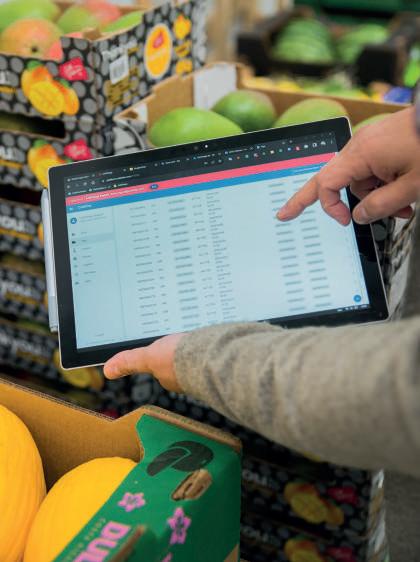

PICTURED—



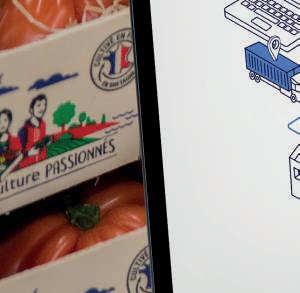

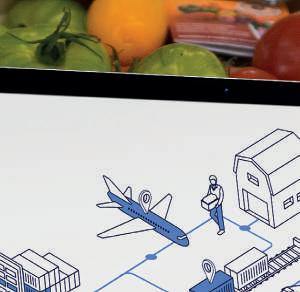
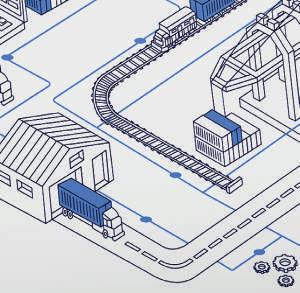


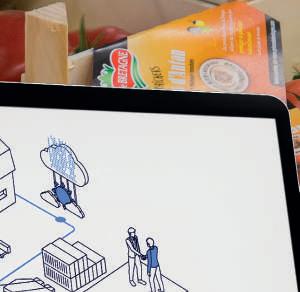


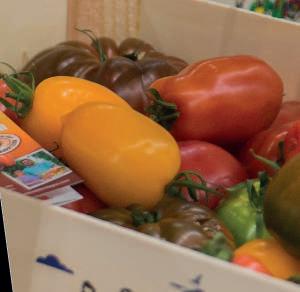


Innovative platform:
Unmatched insights
Freedom of choice:
Major tracker brands supported

us directly: janwillem@coldcha.com
our website: www.coldcha,com
France’s Interfel confirms support for ditching plastic packaging
Despite the concerns of some environmental groups that France’s decree to ban plastic packaging on fruit and vegetables doesn’t go far enough, Interfel’s Laurent Grandin backs the sector’s efforts.
by Tom Joyce @tomfruitnet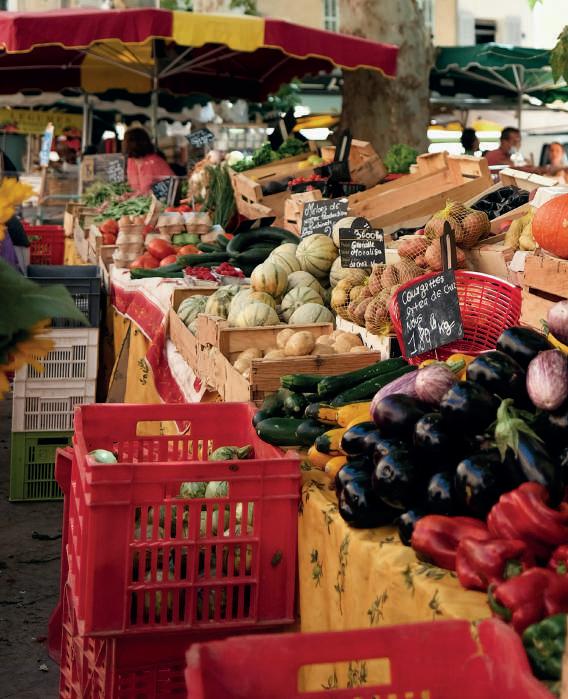




















































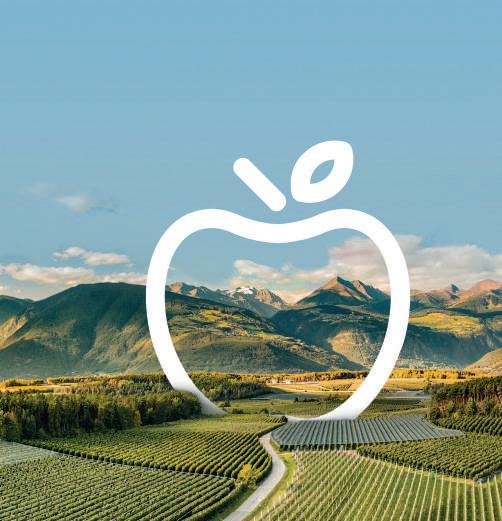



Since 1 January 2024, a French decree has come into effect stipulating that fruits and vegetables packaged in batches of less than 1.5kg can no longer be sold wrapped in plastic.
However, some environmental groups have criticised the long list of exemptions to the ban. “As it stands, the list of exemptions is much too long,” said Manon Richert, communications manager at Zero Waste France. “It will not make it possible to achieve the objective of zero single-use plastics by 2040.”
The French government had originally intended to authorise the sale of just 23 fruits and vegetables in plastic packaging, in addition to ripe-and-ready fruits, but six fruits and vegetables were later added.
The list of exempt products includes asparagus, broccoli, early potatoes, early carrots, salad and cherry tomatoes, endives, mushrooms, lamb’s le uce,
spinach, edible flowers, berries and kiwifruit.
However, Laurent Grandin, president of interbranch organisation Interfel, defended the list, arguing that exemptions were “driven by the realities of product fragility, with technical solutions that did not yet exist”.
He also backed the sector’s efforts thus far in reducing the amount of plastic packaging being used. “We are in favour of ge ing rid of plastic,” he confirmed on France Info. “Half of our products are packed in alternative packaging, and we already sell two-thirds of our products loose.”
“As it stands, the list of exemptions is too long. It will not make it possible to achieve zero single-use plastics by 2040”


Complicating ma ers somewhat, said Grandin, is the fact that the decree is apparently “deemed illegal” in the EU since a harmonised position for all EU counties is currently under discussion. E






Smart forecasting, smarter decisions
New technological advances can create competitive advantages when it comes to demand planning in fresh produce.
 DMICHELE DALL’OLIO
Chief operating officer Fresh4cast
DMICHELE DALL’OLIO
Chief operating officer Fresh4cast
istributors and marketing firms in the fresh produce industry face a daunting task. They must plan availability of hundreds of products, while ensuring cohesive supply chain management. And without a demand-driven approach, the pitfalls are clear: each department looks at the recent past to predict the future, and often relies on slow and disconnected spreadsheets.
The result? A disjointed planning process across the company. Limited collaboration across functions. Too much focus on department goals, rather than broad organisational objectives.
If you rely only on what just happened to forecast what is next, this is comparable to driving a car using only the rear-view mirror. Ok, it works if you only go in a straight line. But when the path starts to turn – a promotion here, supply disruption there – then you have a problem. Down this road lies oversupply, missed sales, and increased costs.
Fresh4cast’s latest whitepaper, which you can download from our website under Resources, highlights the crucial, yet often overlooked, importance of mediumto long-term demand forecasting and planning in the fresh produce industry.
With the help of advanced forecasting models and specialised planning tools, it demonstrates how the accurate interpretation of demand signals can significantly enhance the success of a supply chain success.
FORECASTING OR PLANNING?
Often used interchangeably, demand forecasting involves predicting future customer needs using historical sales data, market trends, and other indicators. Techniques range from simple extrapolations to sophisticated machine-learning models. The aim being to interpret things like seasonality, promotional impacts, and product life-cycles.
Demand planning, on the other hand, is a management process. It relies on human insight and

team collaboration to decide what the organisation will execute. It uses the demand forecast as its foundation and interconnected planning tools to adjust volumes based on the team’s experience and qualitative feedback.
FRESH PRODUCE NEEDS BETTER
The fresh produce sector is characterised by variable supply, perishable inventory, dynamic market conditions, and weather uncertainties. It’s certainly not for the fainthearted. So it requires effective demand forecasting and planning to boost economic and environmental sustainability. This approach accelerates financial projections and ensures a responsive supply chain. Most importantly, planning software can integrate supply and demand data streams to create a consensus plan, one that aims to maximise sales opportunities, mitigate constraints, and reduce overall future risks. E
ABOVE—Accurate demand forecasts have the potential to reap some big rewards
Case study: La Linea Verde
Our work with fresh-cut and convenience specialist La Linea Verde underlines the potential of automatic demand forecasting and efficient demand planning in a fast-paced and complex environment. By adopting Fresh4cast’s advanced forecasting and planning tools, it achieved a significant reduction in forecast errors (-50 per cent vs legacy systems), enhanced responsiveness (by a factor of ten), and detail (x5) in its budget processes, decoded thousands of promotions, achieved a low, single-digit margin of error in demand-driven raw material requirements, and extended its detail demand view by 52 weeks.
Sollum champions new Delphy partnership
Groups team up on “groundbreaking” greenhouse dynamic LED lighting research as they strive to uncover solutions to optimise crop productivity.
by Carl Collen @carlfruitnetLighting specialist Sollum Technologies has announced that it is joining the LED pepper trial at Delphy Improvement Centre, a leading research and training facility located in the Netherlands. The goal of the project, to uncover solutions optimising crop productivity, aligns with Sollum’s dedication to lighting adaptability and sustainability, the group said.
“With more than ten years’ experience in LED lighting trials, Delphy recognises the potential of dynamic lighting strategies such as Sollum’s fully dynamic solution,” it stated. “Its capabilities in zoning, spectral adjustments and automatic dimming enable custom modifications tailored to individual research requirements.”
The inaugural joint project
will address the enhancement of irrigation strategies in conjunction with LED lighting in pepper cultivation. As traditional greenhouse irrigation strategies were primarily established on radiometric units stemming from sunlight and HPS lamps, the advent of dynamic LED lighting, characterised by micromoles and minimal radiant heat, has posed challenges for growers.
“Working with Sollum Technologies to explore the potential of lighted pepper cultivation is an interesting step,” said Lisanne Helmus-Schuddebeurs from the Delphy Improvement Centre. “As we delve deeper into the realm of greenhouse LED lighting research, and especially the potential of growing pepper with LED lighting, the collaboration
BELOW—The project addresses the enhancement of irrigation strategies with LED lighting in pepper cultivation
with Sollum provides new opportunities to develop our knowledge.
“Their dynamic lighting solution offers an adaptability that can improve the efficiency of lighted pepper cultivation,” Helmus-Schuddebeurs noted. “This collaboration will focus on understanding the interplay between dynamic lighting and irrigation strategies, aiming to provide clear and actionable insights for growers. As we’ve always strived to optimise crop productivity, this project promises to shed light on pivotal aspects of modern-day horticulture.”
Sollum’s chief horticultural specialist Sam Soltaninejad said that Sollum was keen to work with Delphy’s Improvement Centre.
The research will also probe the effects of far-red light on pepper crop productivity and morphology. Highlighting the convergence of advanced technology and leading-edge agricultural research, this collaboration aims to offer “unmatched insights” into the symbiotic relationship between light and irrigation in pepper cultivation. E


Time to act on the EU’s new CSR directive
As the Corporate Social Responsibility Directive (CSRD) takes effect, Joanna Nathanson, Freshfel policy advisor on sustainability and international affairs, and Frederic Rosseneu, Freshfel vice president and sustainability manager at Greenyard, shed some light on its expected impact in 2024 and beyond.
by Tom Joyce @tomfruitnetJoanna, what is the Corporate Social Responsibility Directive, the CSRD, and why is it necessary?
Joanna Nathanson: The CSRD builds on the NFRD, the Nonfi nancial Reporting Directive, and it takes it a step further, trying to put sustainability reporting on a par with fi nancial reporting and bringing it up to equal footing. It will cover a whole load of different sustainability criteria, but it’s not only a tick-the-box exercise or just about compliance. It’s also about what it will bring going forward, what this transparency will bring to these topics and the coherence it can bring to communication on this.
And who is going to be affected this year by the directive?
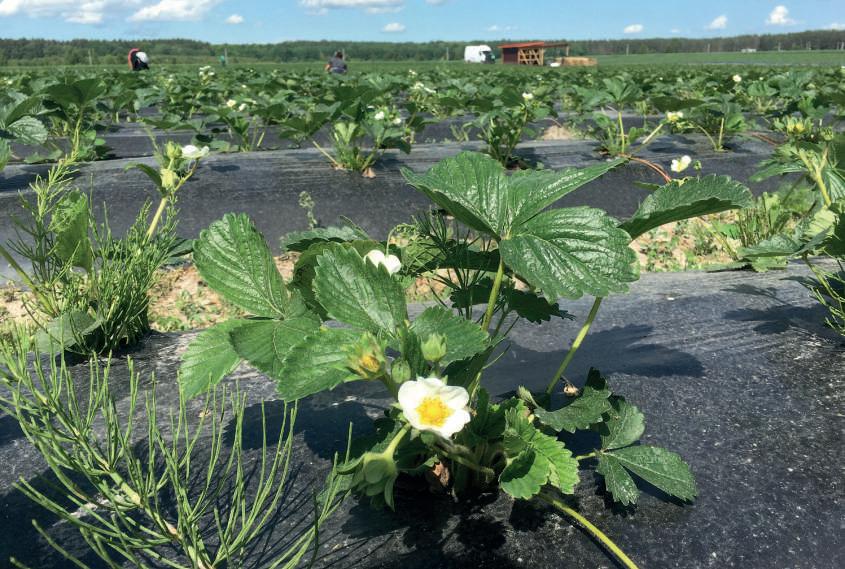
JN: This year, it is the larger companies that have to start collecting their data and reporting for 2025. There are a set of criteria that you have to meet to be recognised as one of these larger companies, and then there will be a step-by-step, phase-in period for the other companies in three
to four years, plus some different options for smaller companies.
Frederic, can you tell us what sort of support there is for this directive across the sector?
Frederic Rosseneu: It’s difficult to say. Concerning the disclosure obligation, some companies are already doing it. Through the NFRD, the large companies listed

on the Stock Exchange were already subject to this kind of legislation, but the reporting obligations now go much further.
What it does, of course, is bring a lot of additional work for everyone. The aim is to bring more transparency to both financial stakeholders and other external stakeholders, to make the industry more transparent and raise the bar, but also to make sure the bar is even for everyone. I think that’s an important element. We’re hoping for a level of standardisation, which will help to reduce the cost for everyone.
For those just starting, I think it will be an intensive two to three years to really climb that steep hill toward compliance, and that’s where the Freshfel initiative comes in, to reduce the workload and look at what we can do in common to take on that burden collectively.
JN: The project which Freshfel Europe is now initiating is open for companies in the fresh fruit and vegetables sector to join. It aims to create a common basis for the sector when it comes to the mapping and communication of ESG performance and efforts. By pooling resources and knowledge, we hope to create a substantiated framework for the sector to identify and progress in their performance, and to leverage this going forward towards for instance the CSDDD and the EU Taxonomy.

This effects companies beyond fruit and vegetables, of course, doesn’t it?
FR: It’s really across the board and not only the food industry. And it doesn’t only affect European companies, of course. That’s where the initial focus is, but all companies who have major operations or high sales in Europe will sooner or later become subject to that legislation as well.
This is part of a trend that is developing for companies to become more transparent. This is one example of the legislation that is starting to impact us now, but we have already another piece of legislation that is now in final negotiations on sustainability due diligence, which will require even more transparency down the chain. Now it’s very much about, what are we doing as a company? Future legislation will be even more about what is happening in your supply chain and making sure that everything is covered and that there are no risks being omitted.
The legislation we are discussing is a European legislation, but there is an also an international trend through the International Sustainability Standards Board, so these kinds of rules are also being fixed at an international level. We want our companies to adopt these rules.
“For those just starting, I think it will be an intensive two to three years to really climb that steep hill toward compliance”
Is there going to be an effort to communicate this to your average consumer?
JN: The Freshfel project is not only a compliance exercise, it’s hopefully going to serve as a foundation for a more transparent, a more coherent and clearer way to communicate the good story that the sector has to tell and also to show more about the improvements that are being made and what efforts are being taken.
Looking forward, are you optimistic about the general direction of travel here, especially when it comes to the ultimate aim of making agriculture net zero?
FR: I am optimistic. We work in a good sector that is part of the solution. Fruit and vegetables have a very low environmental footprint. The more people consume them, the lower the environmental impact of our diets.
Reaching net zero by 2050 will be challenging – it’s not a walk in the park – but the willingness is there. There will be a steep learning curve, but there is a global recognition that we need to move forward.
But we also need to be realistic. Farming is a very conservative sector, so it takes time to change things. A lot of these things will require farmers to change certain practices, and encouraging everyone to adopt those practices will take time. It’s not something we will do within 5-10 years.
JN: I’m also very optimistic, for a lot of the reasons that Frederic mentioned. Fresh fruit and vegetables is a good sector to be in. Fruit and vegetables are among the best for nutritional value, affordability and environmental impact. We have what is needed to create a more sustainable future, both in terms of social and public health and in decreasing the environmental impact of food systems, and I think the opportunities are there. It’s still going to require some work, but I am confident that we will get there. E
FEB 01
Posted by Tom JoyceChoking up over Suez
Last September, I was talking to a French apple exporter about the endless list of challenges that have faced the European fresh produce sector over the past 15 years, from the Russian embargo through to Covid-19. Suddenly, one of us remembered the Suez Canal blockage of 2021, the result of an innocent steering error that had caused instant chaos to supply chains. We were alarmed, both at how quickly we had forgotten and at how easily another Suez crisis could be precipitated. We didn’t know it, but we were discussing “choke points”. In November, the Houthis in Yemen responded to Israel’s war on Gaza by attacking ships passing through the Red Sea, forcing many to take the longer route around Africa, adding an extra 1-2 weeks of travel time at a cost of around US$1m. The Suez Canal remains in use, but the volume of containers passing through has plummeted.

Another so-called choke point for trade is the Panama Canal, which links the Pacific and Atlantic Oceans and is currently suffering from intense drought. Reduced capacity due to lower water levels has forced Maersk to transfer cargo to the alternative railway line. Another option was to take a ten-day detour between Asia and the US, via the Suez Canal. Whether the present crisis will be another one to remember, I’m sure we’ll eventually find out. E


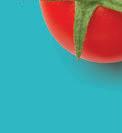
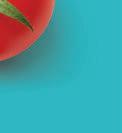

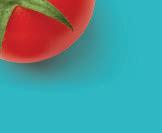


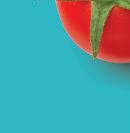



















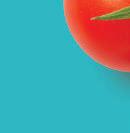
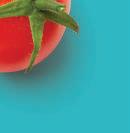
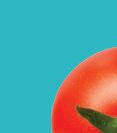


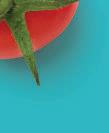



STORE CHECK


POTAGER CITY PARIS, FRANCE
Potager City is a new greengrocer concept developed by French retail giant Carrefour, which in 2020 teamed up with a Lyon-based start-up of the same name to create a new brand for city-dwellers who want to eat healthier. The group has opened two trial stores, both of them in Paris, with the aim of selling a range of high-quality, ultra-fresh, and locally sourced fresh fruit and vegetables to Parisians at what it describes as a fair price. In fact, fruit and veg are central to the format. The stores will sell as many as 100 different items of fresh produce, much of it seasonal, over more than half of the sales area. E
Photos: W&Cie